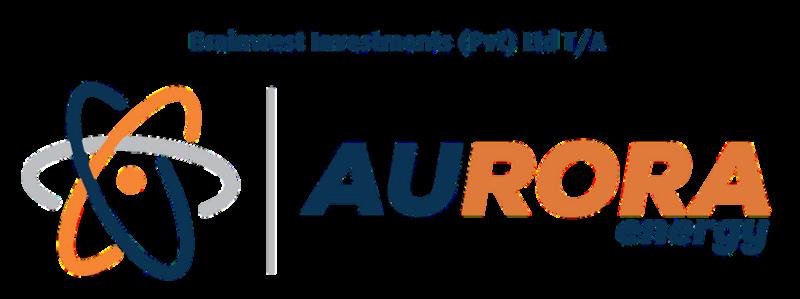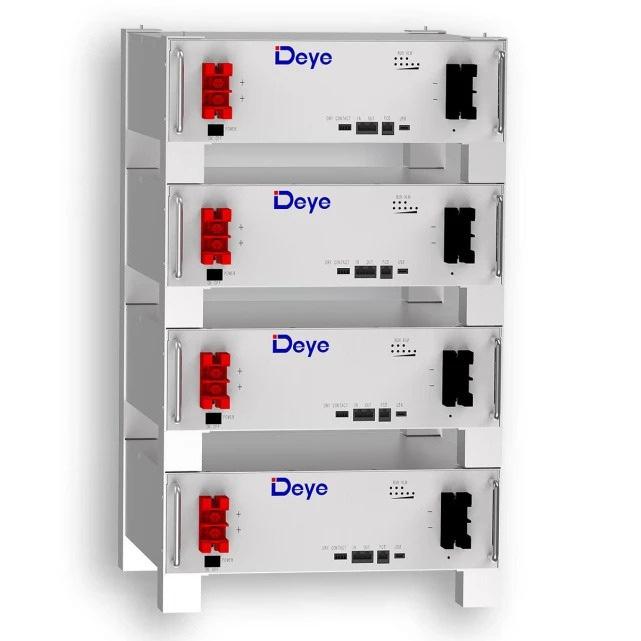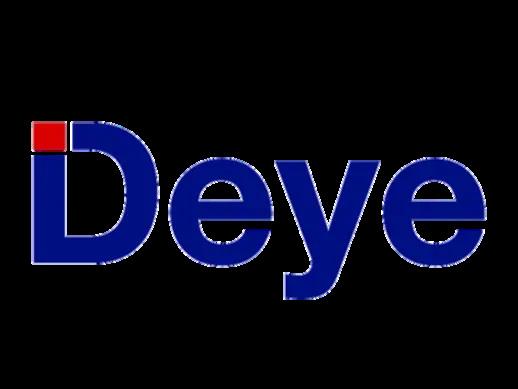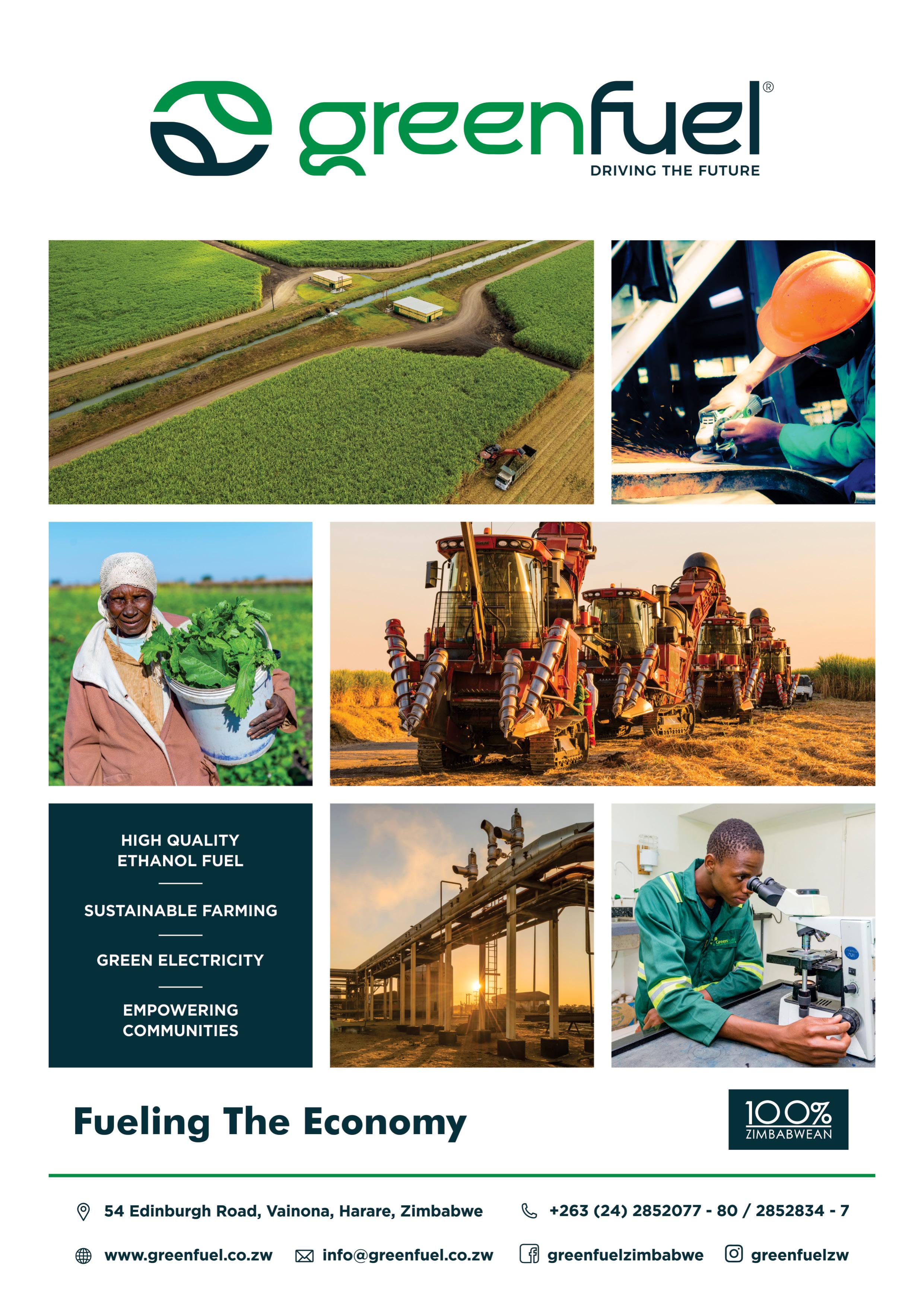

















We help you embed sustainability and responsible practices into your business, driving both purpose and profit.
Our Expertise
CSR & ESG Strategy: Define your purpose, align initiatives with goals
Impact Assessment: Pinpoint risks and opportunities, focus your efforts
Reporting & Frameworks: Navigate standards, ensure credible transparency
Data & Measurement: Track progress, measure your true impact
Stakeholder Engagement: Foster trust, build stronger relationships
Capacity Building: Empower your team, champion sustainability

This issue delves into the dynamic landscape of Zimbabwe’s energy sector, highlighting key players and transformative initiatives driving the nation towards a more sustainable and independent future.
We begin with SunWolf Renewables, a company at the forefront of delivering innovative, high-quality energy solutions. With operations rooted in Zimbabwe and an ambitious eye on the broader African continent, SunWolf is leveraging cutting-edge technology and sustainable practices to help communities, businesses, and institutions transition from unstable power supply to clean, reliable solar energy. Our feature on Green Fuel showcases a pioneering bio-ethanol producer in Chisumbanje.
More than just a fuel producer, Green Fuel stands as an integrated agro-industrial powerhouse, converting sugarcane into vital resources. It serves as a powerful testament to Zimbabwe’s commitment to energy security, fostering economic growth, and upholding environmental stewardship, effectively driving both vehicles and national development. Complementing these efforts are Alteri Consultants, a Harare-based firm deeply committed to cultivating sustainable futures through impactful Corporate Social Responsibility and transparent Sustainability Reporting, emphasizing the synergy of doing good for business, people, and the environment.
We then shine a light on Creadlyne Transport, a trusted logistics company specializing in fuel transportation across Zimbabwe and Southern Africa since 2007. Their unwavering commitment to reliable, efficient, and safe fuel transport, backed by a well-maintained fleet and experienced leadership, underscores their vision to drive
service delivery improvements and foster a safe working environment within the critical logistics sector.
In this issue, we also touch upon several other vital developments. HEVACRAZ continues to champion professional excellence and technological adoption in Zimbabwe’s built environment. A groundbreaking energy cooperation agreement has been solidified between Zimbabwe and Mozambique, set to reshape Southern Africa’s energy landscape.
Zimbabwe has launched the Carbon Market Authority to regulate carbon trading, aligning with the Paris Agreement, while Verify Engineering is spearheading a significant nitrogenous fertilizer plant in Mkwasine. ZETDC is prioritizing safety with calls for qualified electricians, and ZERA has been actively engaging communities and leading discussions on industrial transformation at ZITF 2025, facilitating a tour for the Parliamentary Portfolio Committee on Energy and Power Development, and laying the groundwork for Zimbabwe’s National Energy Compact.
Off-grid renewable energy solutions are addressing rural electrification challenges, supported by strategic collaboration between the Research Council of Zimbabwe (RCZ) and ZERA. Technological innovation, including AI and drones, is transforming last-mile delivery, while the UNDP is actively engaged in accelerating access to sustainable energy. Finally, ZETDC is conducting nationwide inspections to reduce electrical accidents, and regional cooperation in energy security was a key theme at the 64th Southern African Power Pool (SAPP) Management Committee Meetings in Victoria Falls.














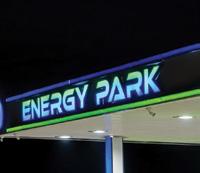


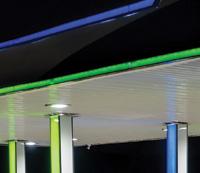
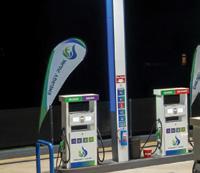




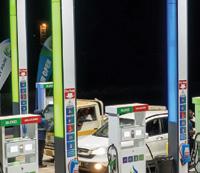




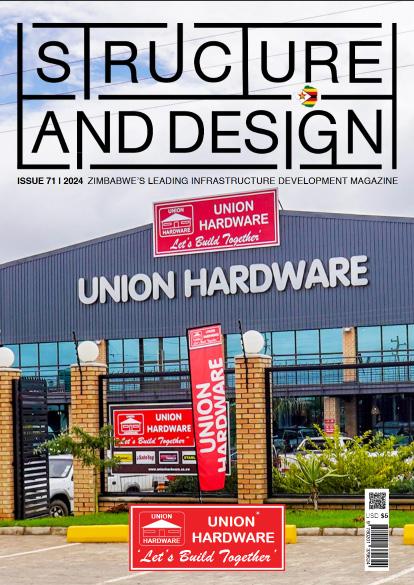
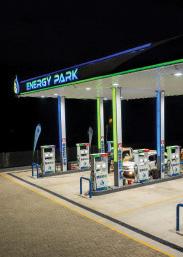

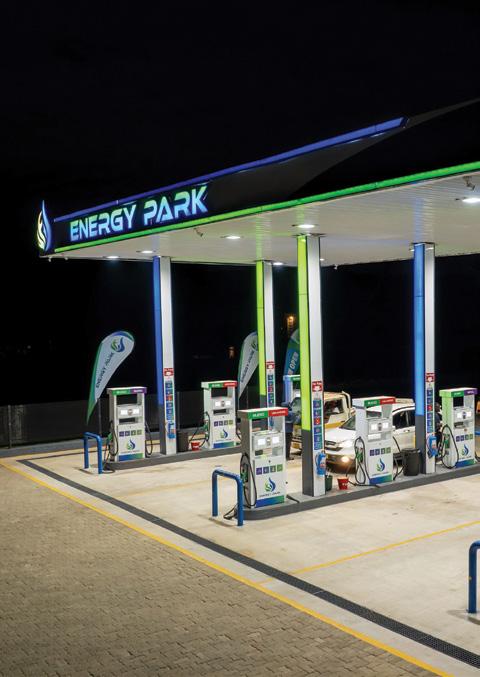


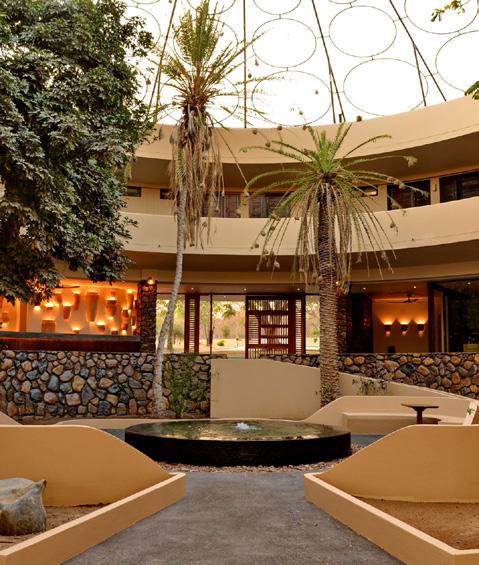


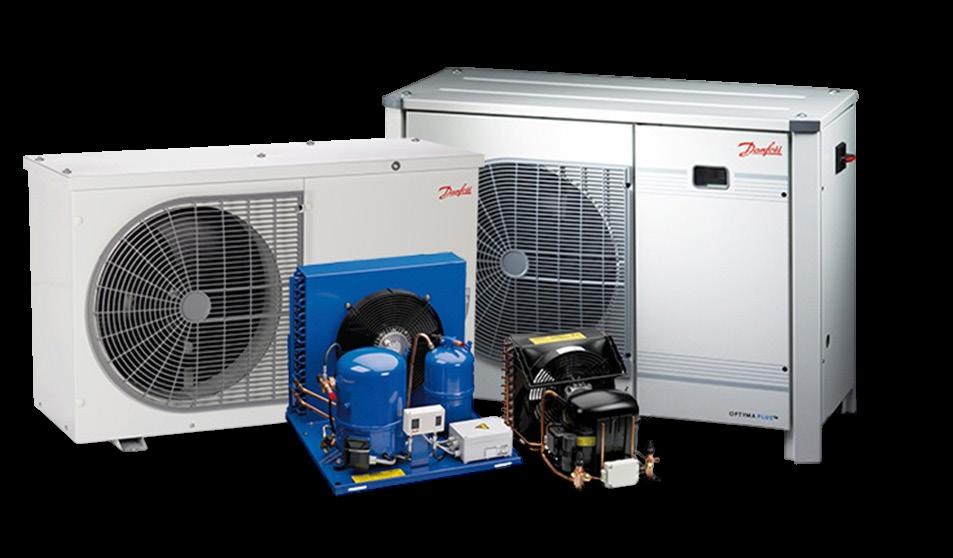


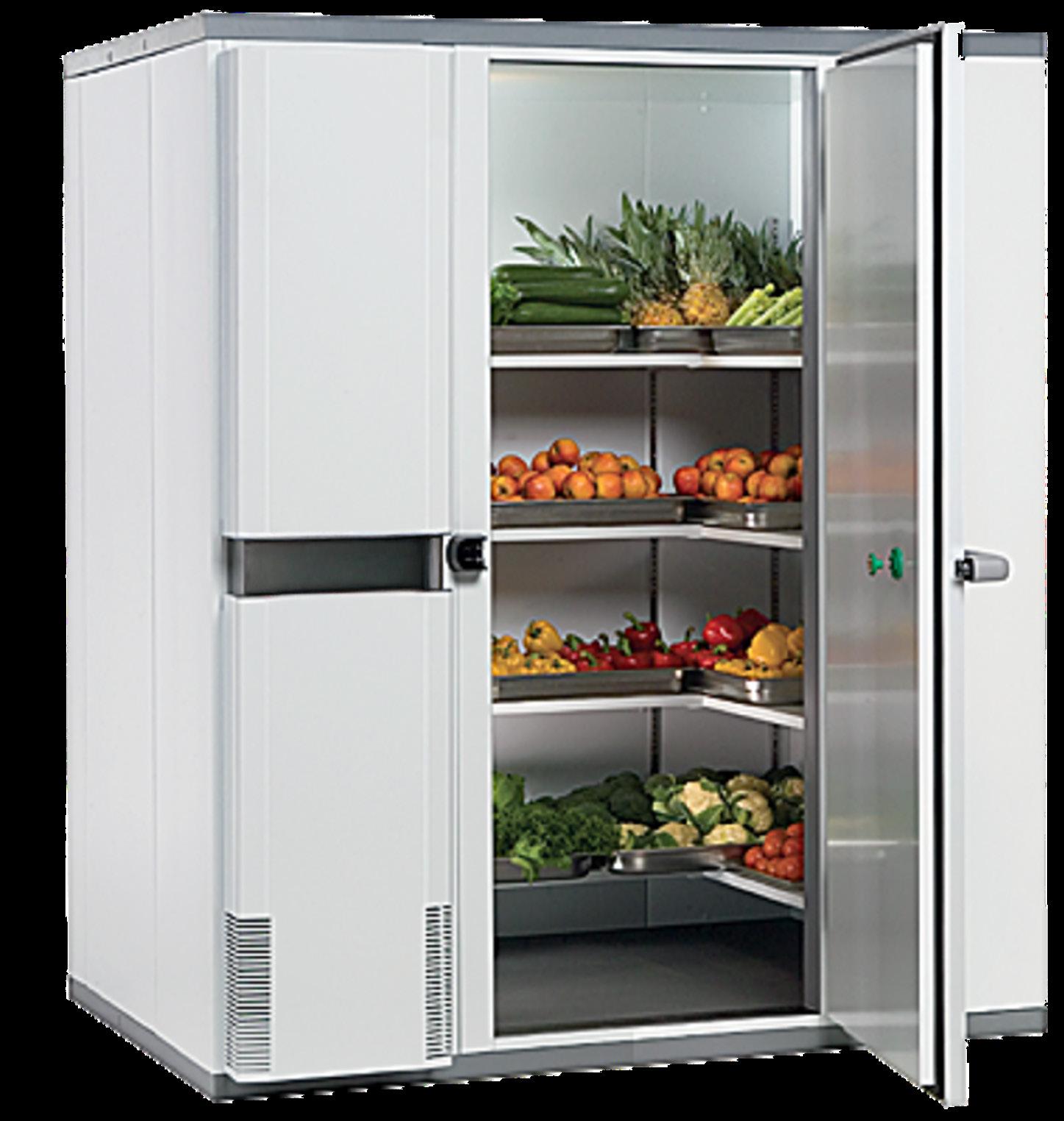

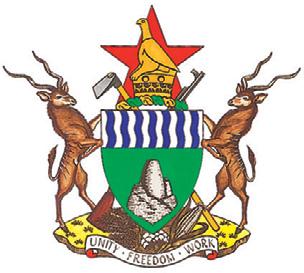


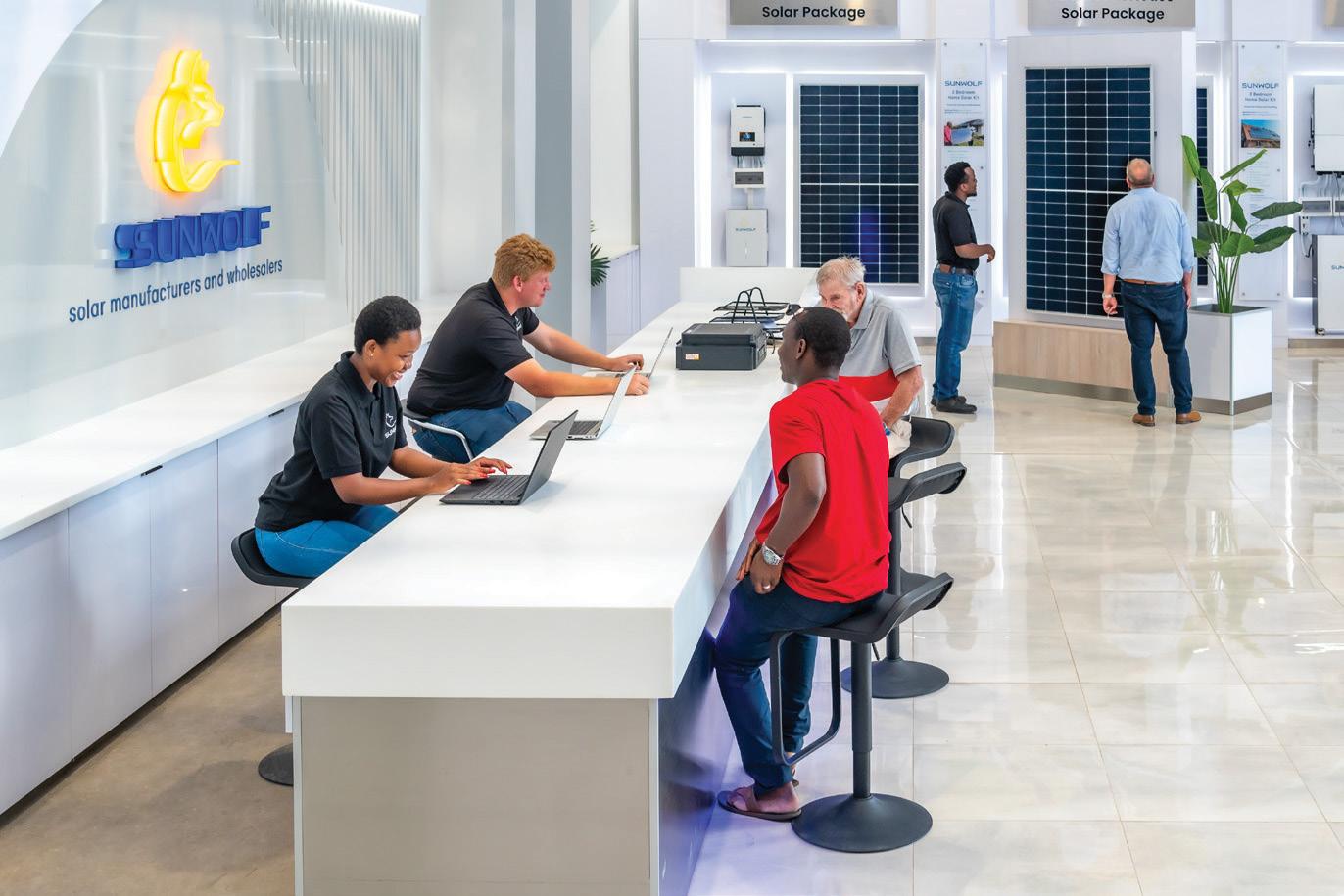
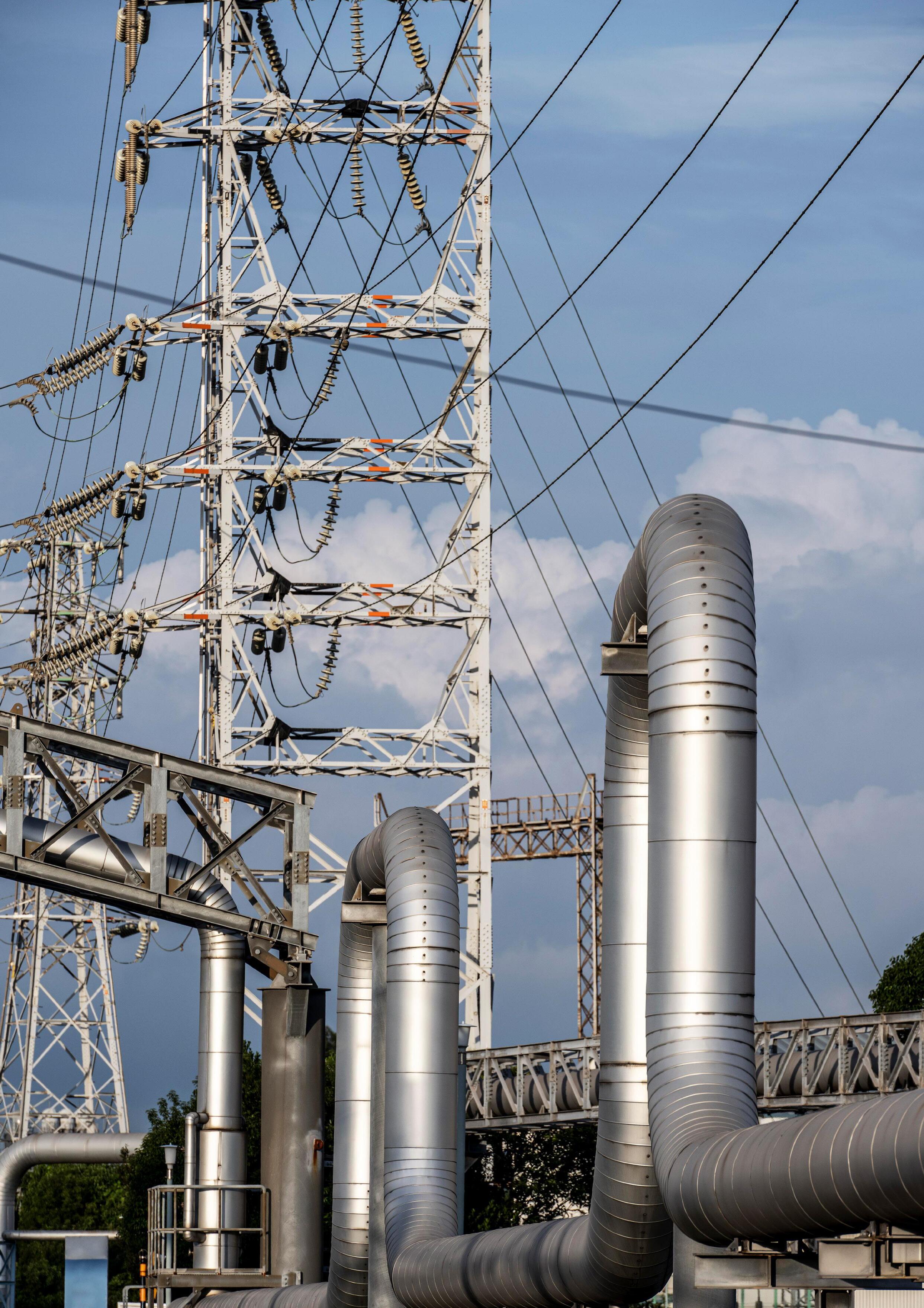
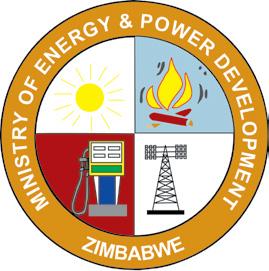
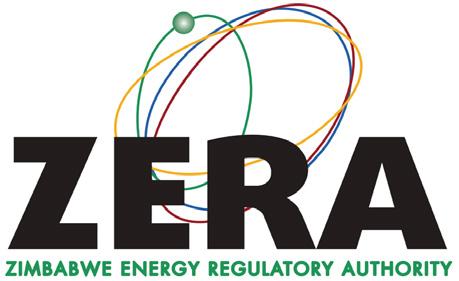
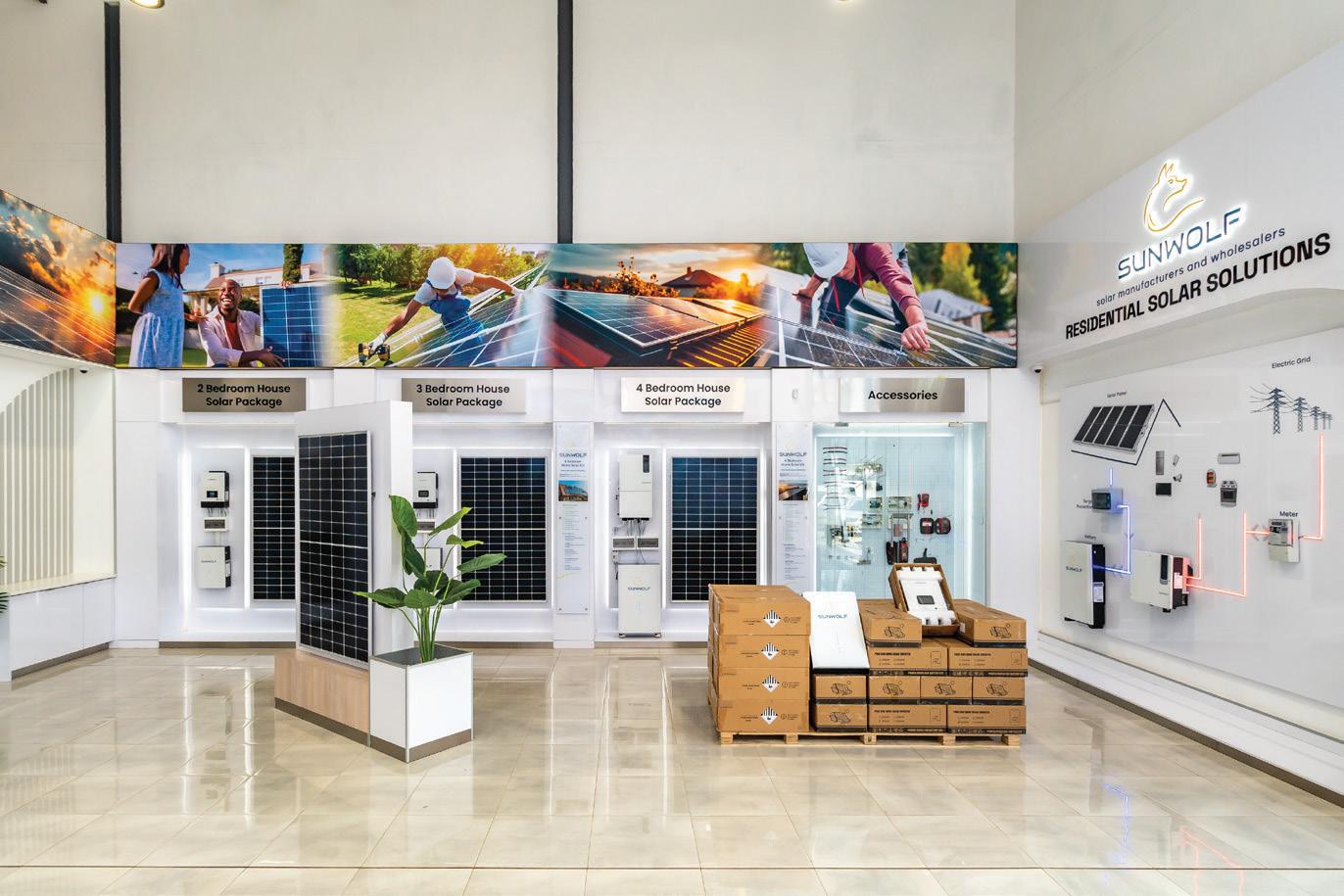
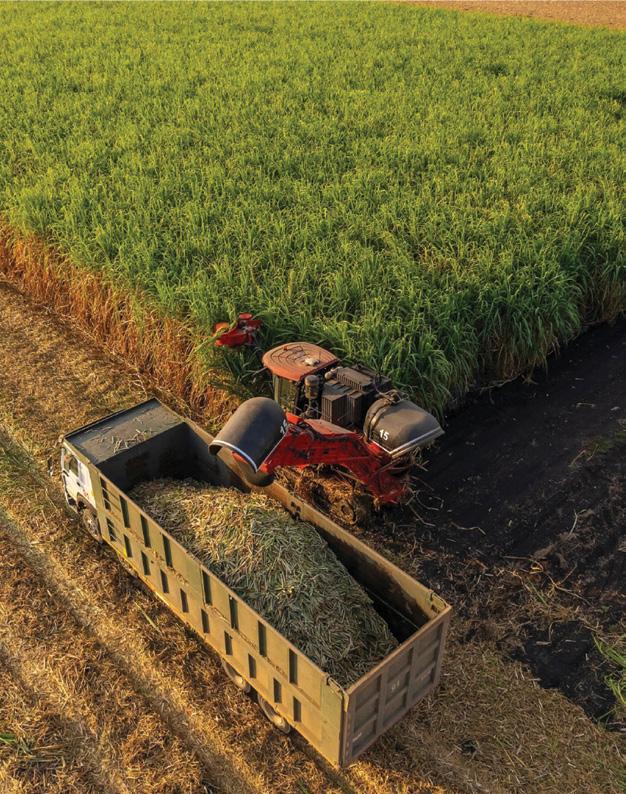

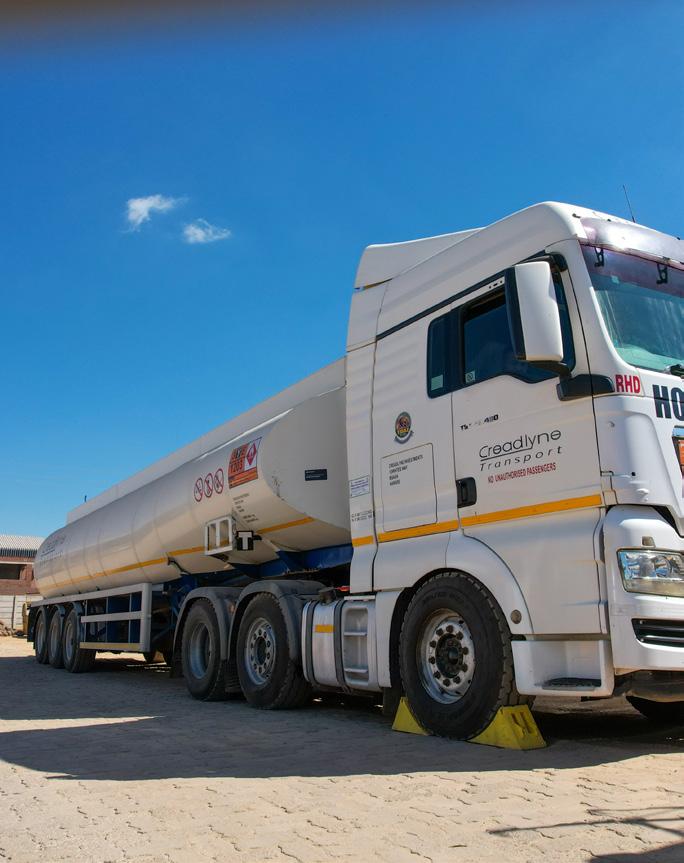
every effort has been made to ensure the accuracy of its content, neither editor nor publisher can be held responsible for any omissions or errors: or for any misfortune, injury, or damages which may arise there-from.



The SunWolf Renewables Story
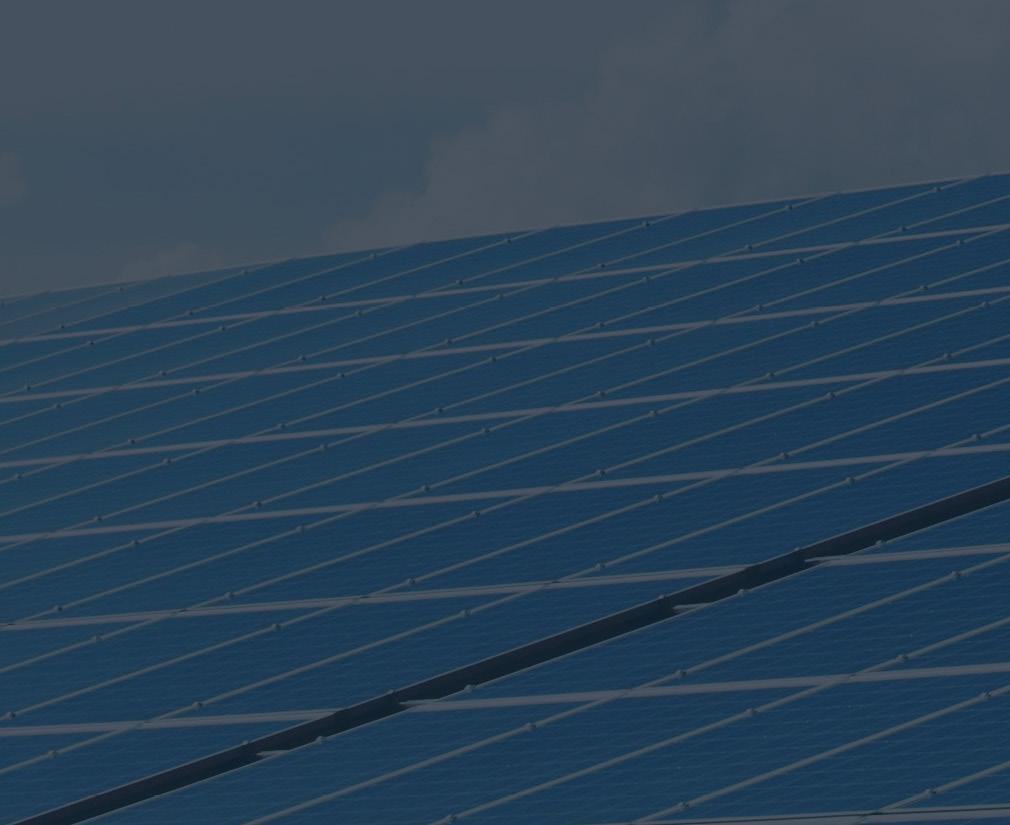

In the heart of Southern Africa lies a nation blessed with an abundance of sunshine- Zimbabwe. With over 3,000 hours of sunlight each year, the country has the potential to become a solar energy powerhouse. Yet energy insecurity continues to hinder progress. Power outages, unreliable grid infrastructure, and rising energy costs have made the need for renewable energy more urgent than ever.
This is where We, SunWolf Renewables comes in. SunWolf Renewables is delivering innovative, high-quality energy solutions powering a cleaner future through cutting-edge technology and sustainable practices. With operations rooted in Zimbabwe and an eye on the broader African continent, SunWolf Renewables is helping communities, businesses, and institutions transition from unstable power supply to clean, reliable solar energy. As both a manufacturer and wholesale supplier, we deliver systems that are built for Africa’s conditions - robust and sustainable.
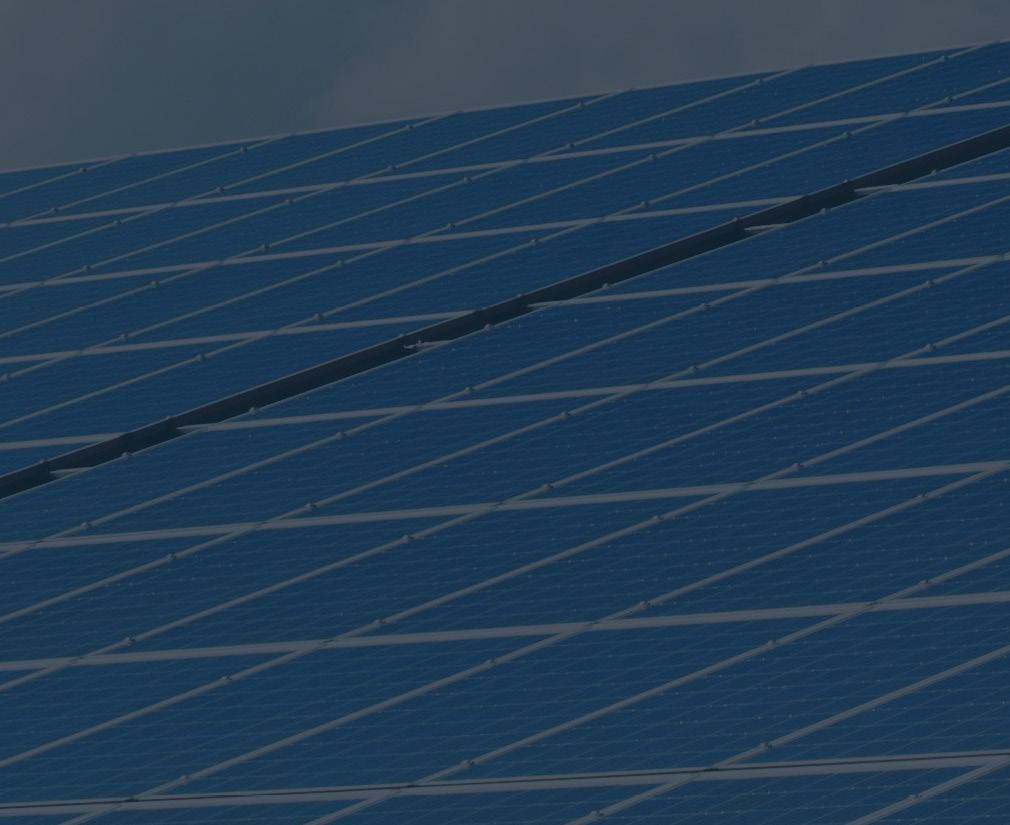

Our Vision. For SunWolf Renewables to become a leading player in making renewable energy the main source of energy in Africa. We believe in a future where energy poverty is eliminated, and every household and business can rely on a renewable source of power to thrive.
Our Mission. Empowering Africa with sustainable energy solutions, we strive to provide communities with clean renewable energy. Our mission is to provide reliable, and innovative renewable energy solutions that enhance the quality of life for all.
What We Do. At SunWolf Renewables , we specialize in providing high-quality solar energy solutions tailored to meet the specific needs of our customers. Whether for homes, businesses, schools, farms, mines or healthcare facilities, we provide end-to-end solar services.
1. Consultation and Assessment
We begin by assessing your site and energy needs. Our team of experts designs a customized solar and/or hybrid solution that maximizes output and efficiency, and is tailor-made to suit your requirements.
2. Custom Design and Installation
We install systems that integrate seamlessly with your property-rooftop, ground-mount, or car-port solutionsensuring optimal performance and long-term savings.
3. Maintenance and Support
We stand by our systems with unbeatable warranties and reliable after-sales support. Our maintenance plans keep your equipment running at peak performance, year after year.
We supply a full suite of premium solar energy products for residential, commercial, and industrial use—engineered to handle Africa’s toughest energy challenges.
Our Products Include:
• Inverters: A range of advanced Hybrid inverters that ensure seamless conversion of solar power into usable electricity for your home or business, with solutions from 1.2kw to 30kW Single-phase and 20kW to 100kW Three-phase options.
• Battery Storage Systems: Reliable and durable Lithium ion battery solutions to store excess energy produced by your solar panels providing you with power during peak times or outages. The standard range includes 12V 100Ah, 24V
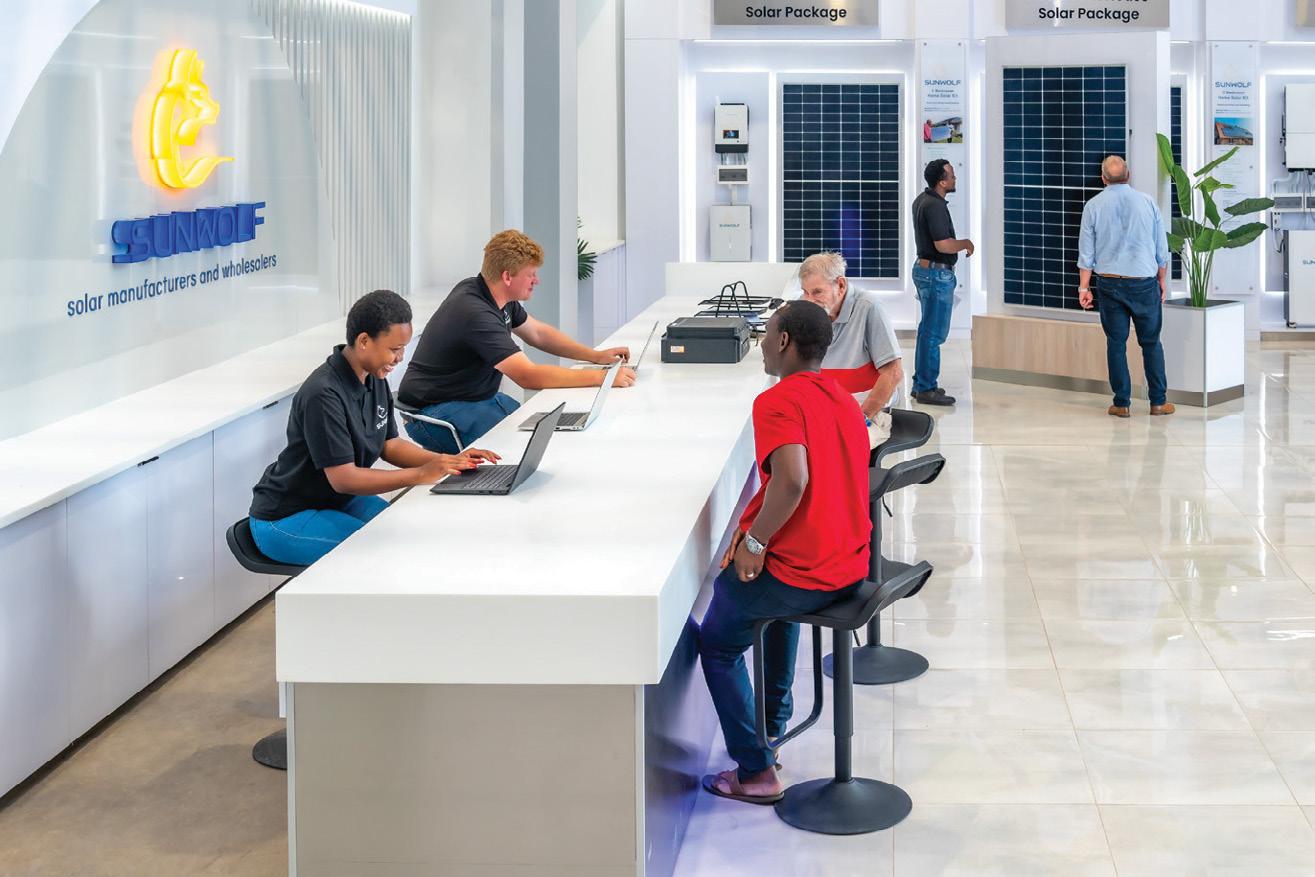
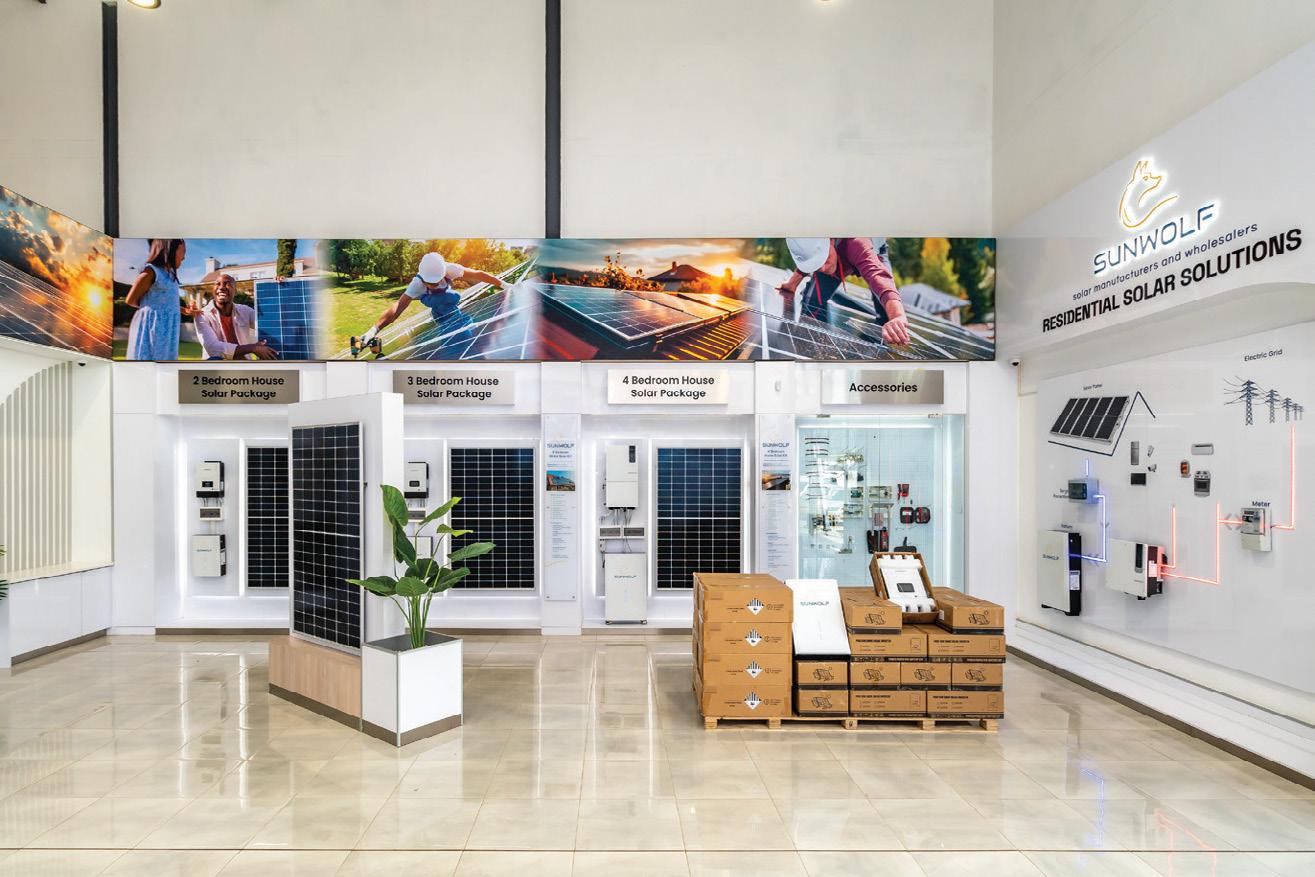
100Ah, 48V 100Ah/200Ah/280Ah
batteries and our modular High Voltage systems provide from 20kWh to 1.2MWh of storage.
• Mounting Systems: Robust and versatile mounting solutions for rooftops, ground installations, and custom structures, ensuring stability and optimal performance
• Monitoring Systems: State-of-the-art monitoring technology to track your solar system's performance in real-time, ensuring efficiency and peace of mind.
“SunWolf is more than a company. It is a promise to the people of ZimbabwE that clean, reliable energy is within reach”


Our Services Include:

• Customized solar solutions based on your energy usage, site, and goals
• Expert installation by qualified technicians
• Ongoing maintenance and technical support
By combining innovative product lines like the PowerPack Ultra and PowerPack Mega Ranges with top-tier service, SunWolf delivers turnkey solar energy and battery storage solutions that reduce cost, increase reliability, and promote a greener Zimbabwe.
the PowerPack Range
Scalable Power. Uncompromising Performance.
At SunWolf Renewables, we understand that today’s commercial and industrial energy demands require more than just generation—they require intelligent, dependable storage. That’s why we’re proud to introduce the SunWolf PowerPack range: our most advanced, high-capacity battery systems engineered for serious solar scalability.
Built for resilience and designed with precision, these new systems are tailored to meet the growing needs of businesses, institutions, and off-grid operations. Whether you're looking to stabilize power supply, store surplus solar, or secure energy independence, PowerPack Ultra and Mega deliver robust performance with smart control.

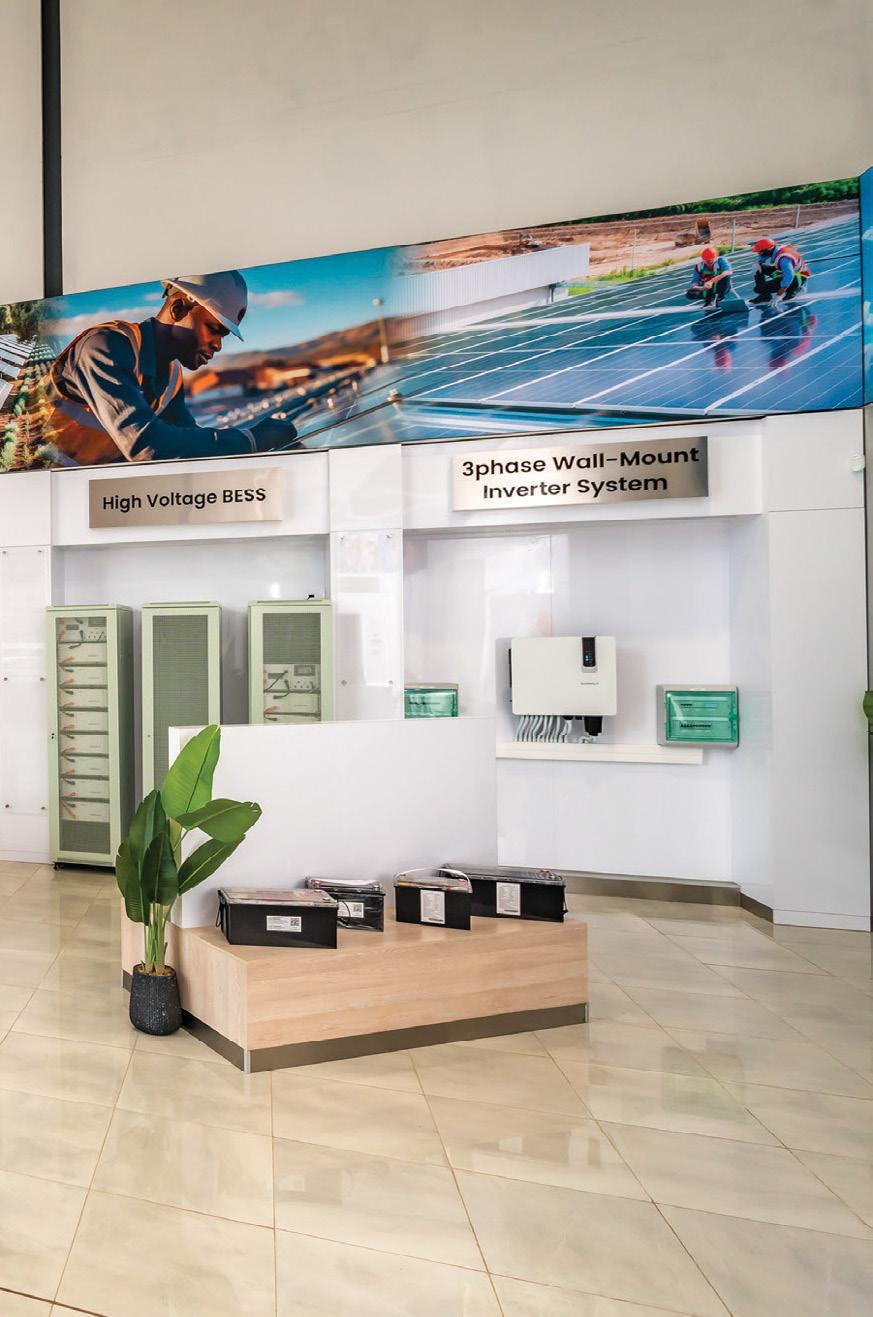

Compact yet powerful, this unit is ideal for businesses seeking reliable load management, backup power, or off-grid energy solutions. Housed in a durable steel cabinet and backed by an advanced Battery Management System (BMS), it offers real-time monitoring, safety, and efficient energy optimization.
When you need more power and deeper reserves, the 100kW system delivers. Built for larger-scale industrial and agricultural and mining use, it ensures high-output performance and long-duration energy support. With modular flexibility and seamless integration into complex energy systems, it’s the powerhouse your operations can rely on.
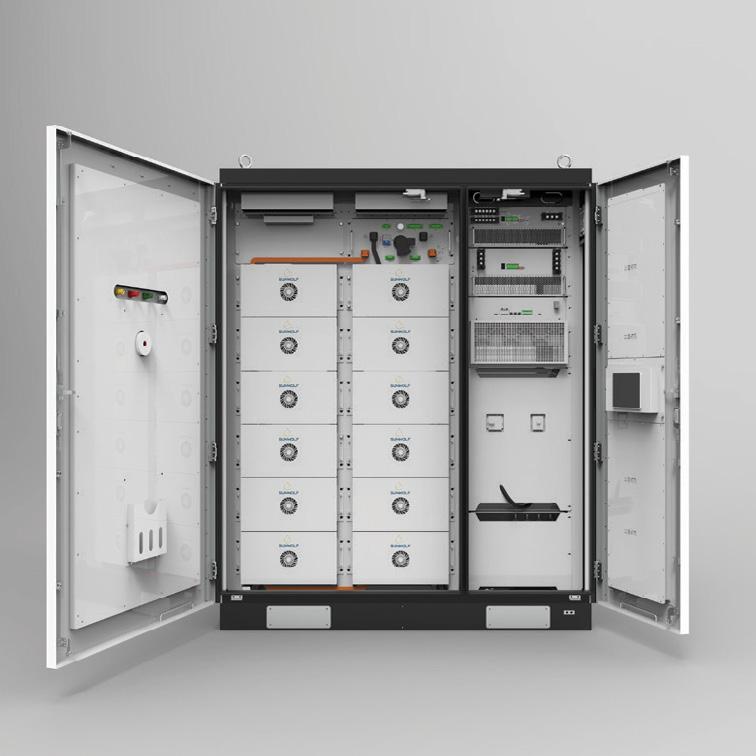

Both systems feature:
Enhanced Durability and Environmental Resistance
• Built with durable materials and designed to protect the internal components, these rugged, steel enclosures are built to IP55 standards and are resistant to dust and moisture, ensuring reliable performance even in challenging industrial, agricultural and mining environments.
Efficient Air-cooling System
• These energy producing and storage cabinets use an air-cooling system to maintain optimal temperatures for the battery modules.This cooling method is cost-effective, requires minimal maintenance, and is suitable for most industrial, agricultural and mining environments with modest climate control needs.
Smart monitoring and Safety Features.
• These systems feature advanced Battery Management technology together with advanced monitoring that tracks key metrics
including temperature, voltage and charge levels, in real-time.
• Safety features such as overvoltage, overcurrent and temperature protection enhance operational safety and extend battery lifecycle by preventing overheating.
• A smoke detector, heat detector, and gas based fire extinguishing system round off the compliment of standard safety features.
Scalable design for future expansion
• The modular nature of these PowerPacks means that additional battery cabinets for extra power storage can easily be added and PowerPack can also be paralleled to give increase power production and storage capacity.
And this is just the beginning. The PowerPack Mega range expands our line-up to offer even greater versatility, capacity, and energy independence for a wide range of applications, with fully containerised solutions from 200kW to Multi Megawatt applications.

To mark a powerful beginning, SunWolf Renewables hosted an unforgettable launch celebration at its headquarters in Harare, bringing together government officials, energy sector leaders, community partners, and media representatives.
Held under the theme “Lighting the Path to a Brighter Zimbabwe,” the event showcased SunWolf’s commitment to clean energy innovation, community upliftment, and sustainable industrial growth.
Event Highlights:
• A guided tour of the warehousing facility & product showroom
• Keynote speeches from industry leaders and SunWolf executives
• Cultural performances, music, snacks and mingling
The launch wasn’t just a celebration—it was a statement of intent. It signalled a new era of energy empowerment, and the overwhelming turnout confirmed public enthusiasm for Zimbabwe’s solar revolution. This event marked a defining moment for renewable energy in Zimbabwe, setting a bold tone for what lies ahead.






Quality Assured
We adhere to international standards for performance and safety. Our products are thoroughly tested to withstand Africa’s climate and grid challenges.
Product Warranty
Sunwolf Alpha Inverters come with a standard 5-year warranty which is extendable to 10 years on request. Sunwolf Batteries come with a standard 5-year or 6000 cycle swap-out warranty which is extendable to 10 years on request.
The Jinko PV Panels we use carry a 12-year product warranty and a 25 year performance warranty.
Scalable
Our systems are accessible to all—from the smallest of homes to the largest mines or commercial solar farms—and can scale as your energy needs grow.
Wide Installer Network
We don’t just install; we partner with you. Our support team is always on hand for maintenance, upgrades, and technical assistance.
Contact Us Head Office: Lifestyle Mall, Corner Borrowdale and Kingsmead Road, Borrowdale, Harare, Zimbabwe
Phone: 0777-773565
Email: sales@sunwolf.org
Website: www.sunwolf.org
Follow us: SunWolf +263 77 777 3565
SunWolf sunwolf_solar_zw

Green Fuel is a pioneering bio-ethanol producer based in Chisumbanje and stands as a testament to the Nation's commitment to energy security, economic growth, and environmental stewardship.
Far from being just a fuel producer, Green Fuel is an integrated agroindustrial powerhouse, converting sugarcane into vital resources that drive both vehicles and national development.
Officially endorsed as a National Project of the Country by the Government of Zimbabwe, Green Fuel has emerged as a critical player in Zimbabwe's energy matrix. The company operates a state-of-the-art facility, leveraging cutting-edge Brazilian technology adapted with significant local engineering input. This advanced infrastructure enables the efficient conversion of locally grown sugarcane into anhydrous ethanol, a cleaner-burning fuel that significantly reduces greenhouse gas emissions when blended with petrol.
Green Fuel leads in fuelling the Zimbabwean economy, offering environmentally friendly and sustainable renewable vehicle fuel and electricity. Committed to reducing greenhouse gas emissions and improving air quality, the company is a critical player in combating climate change.
Its high-quality anhydrous ethanol (less than 0.04% water) is a topperforming fuel: safe, competitively priced, clean, accessible, and environmentally beneficial.
This homegrown solution has already significantly boosted Zimbabwe’s energy security, reducing dependence on imported oil and fossil fuels.
Established in 2009 as a joint venture with the Zimbabwean Agricultural and Rural Development Authority (ARDA), Green Fuel has achieved tremendous growth. It has become a major employer, supporting over 3,000 Zimbabweans, a number set to increase with expansion.
This growth injects millions into local development, agriculture, and entrepreneurship, directly benefiting surrounding communities. Their vision is to become Africa’s leading supplier of high-quality, competitively priced renewable fuel.
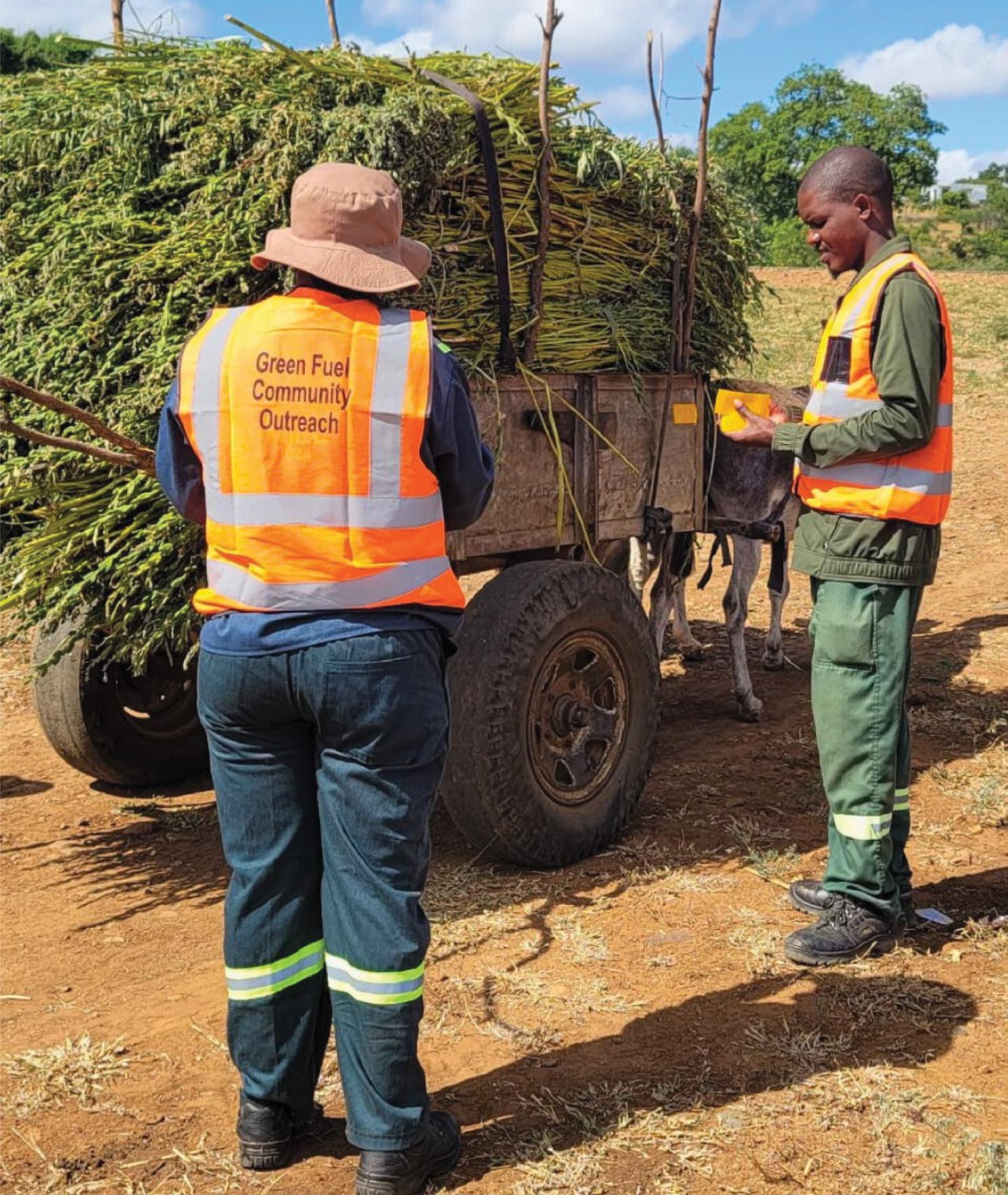
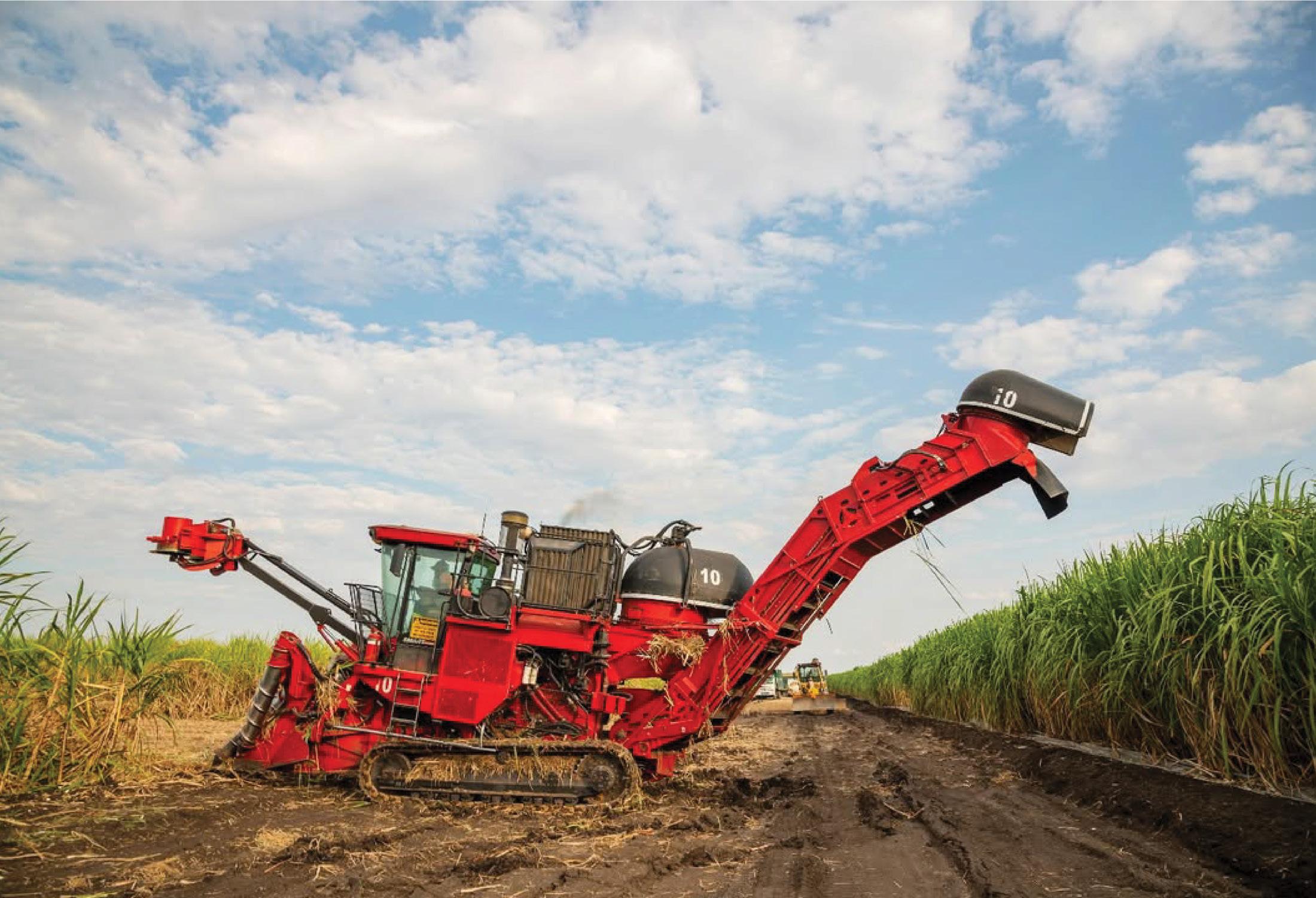
The company also invests heavily in its workforce, introducing state-of-the-art harvesting techniques. Zimbabwean employees receive expert training from Brazilian specialists, ensuring vital skills are developed and retained within the country.
Green Fuel's operations create a transformative economic ripple effect. Ethanol use significantly boosts Zimbabwe's fuel security by reducing reliance on imported petroleum, directly decreasing the national trade deficit. As an import replacement, it keeps foreign currency within Zimbabwe, alleviating liquidity challenges. Increased ethanol use further insulates the country from volatile global oil prices, fostering a stable energy landscape.
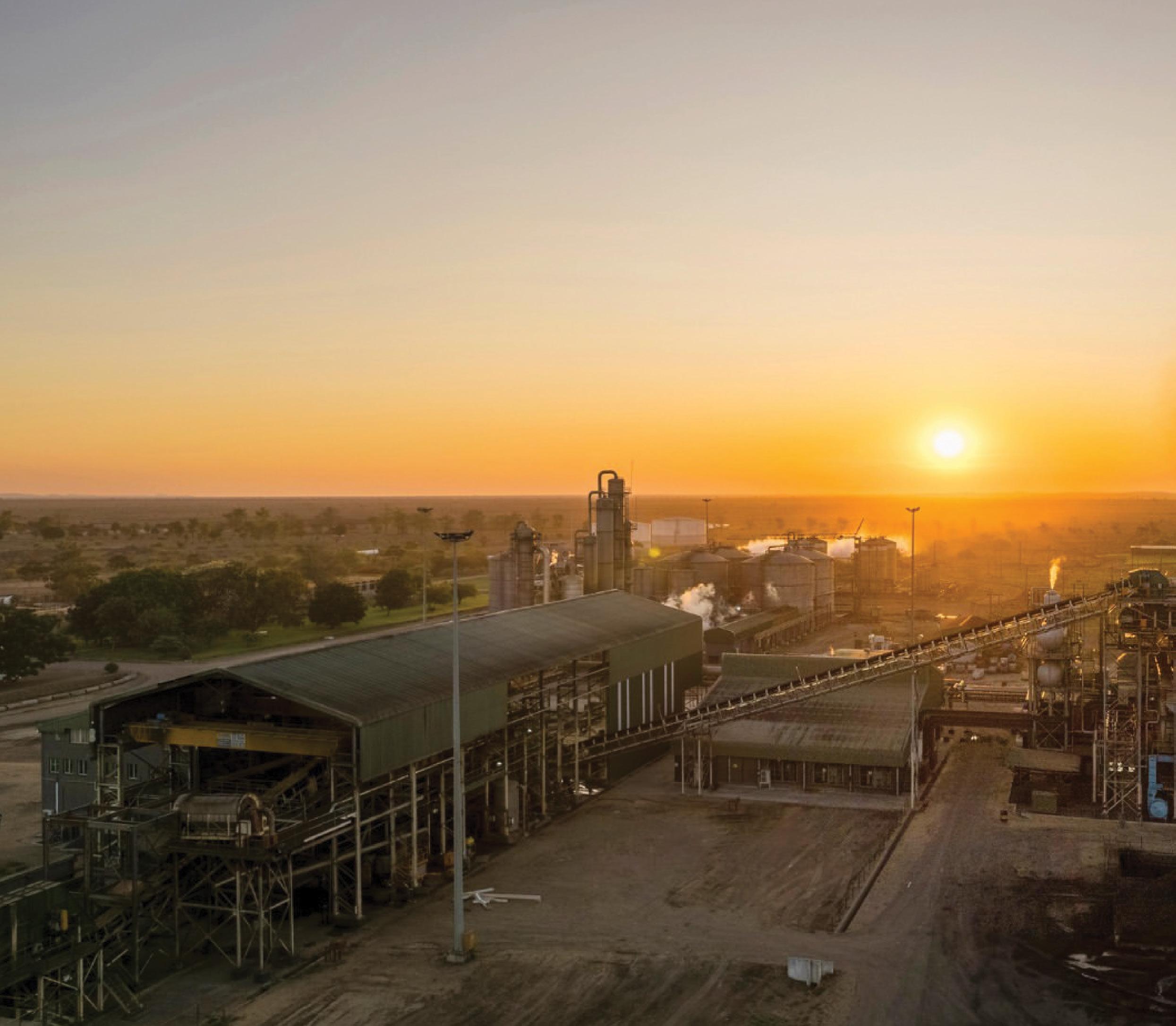
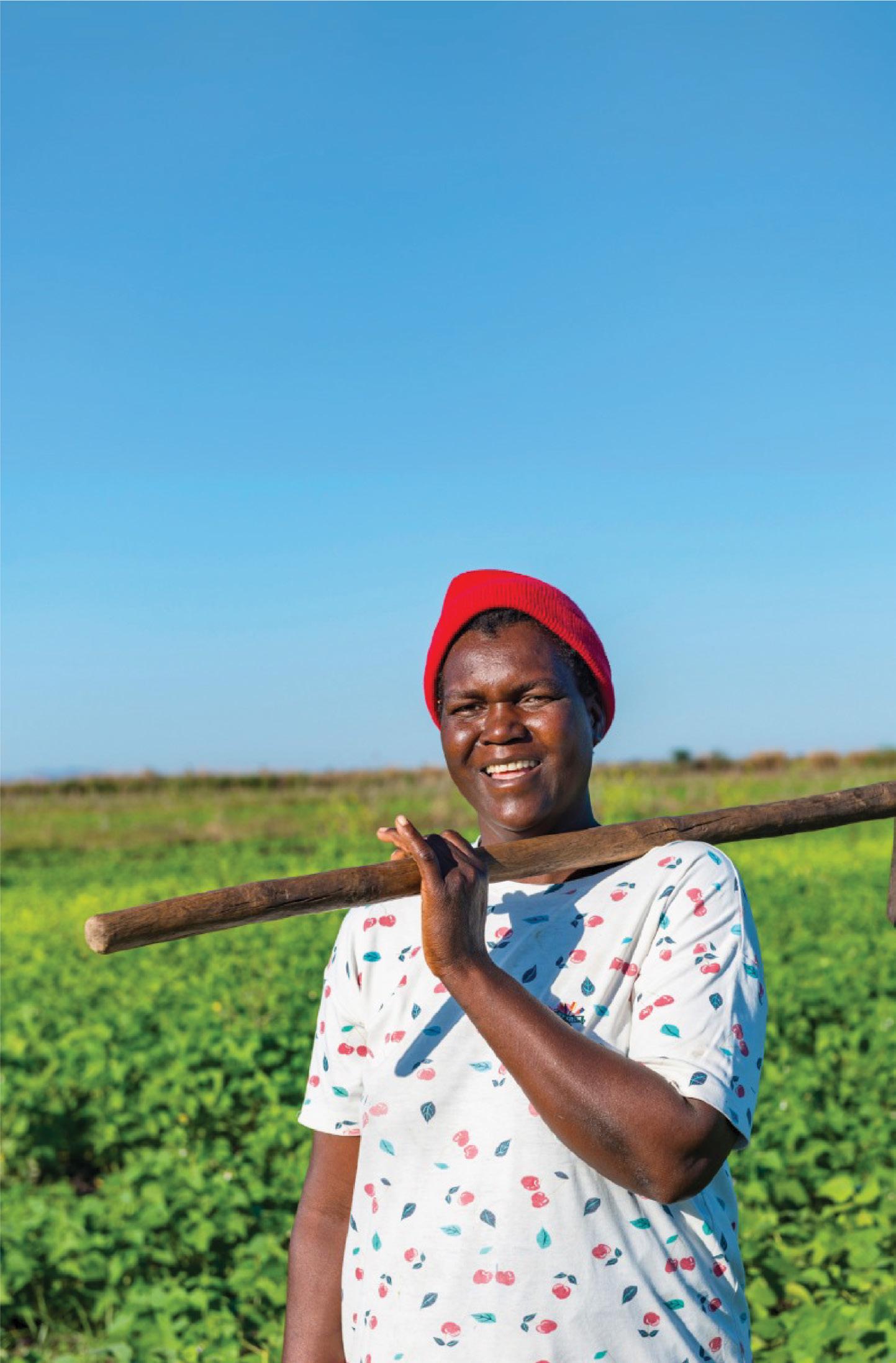
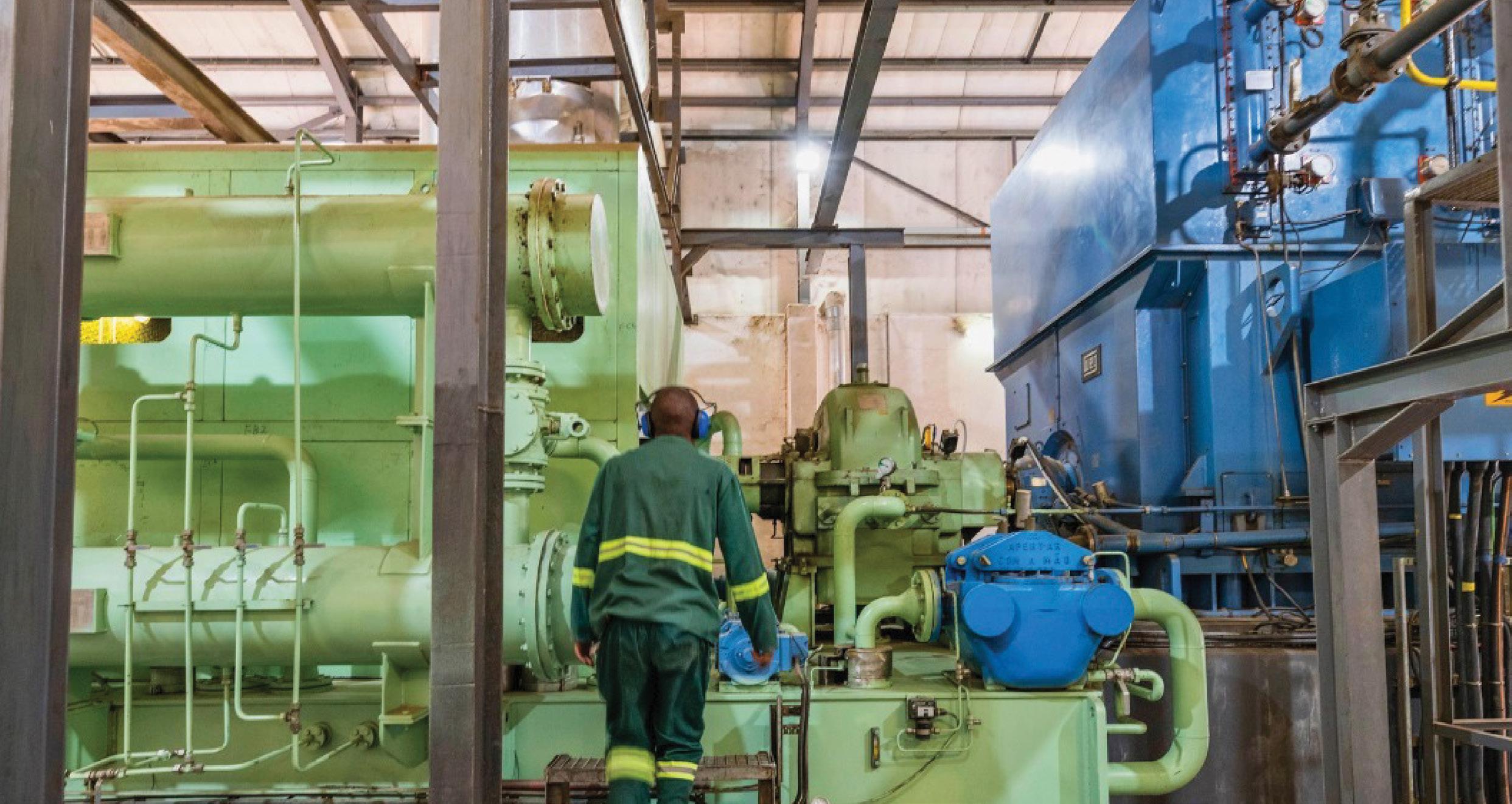
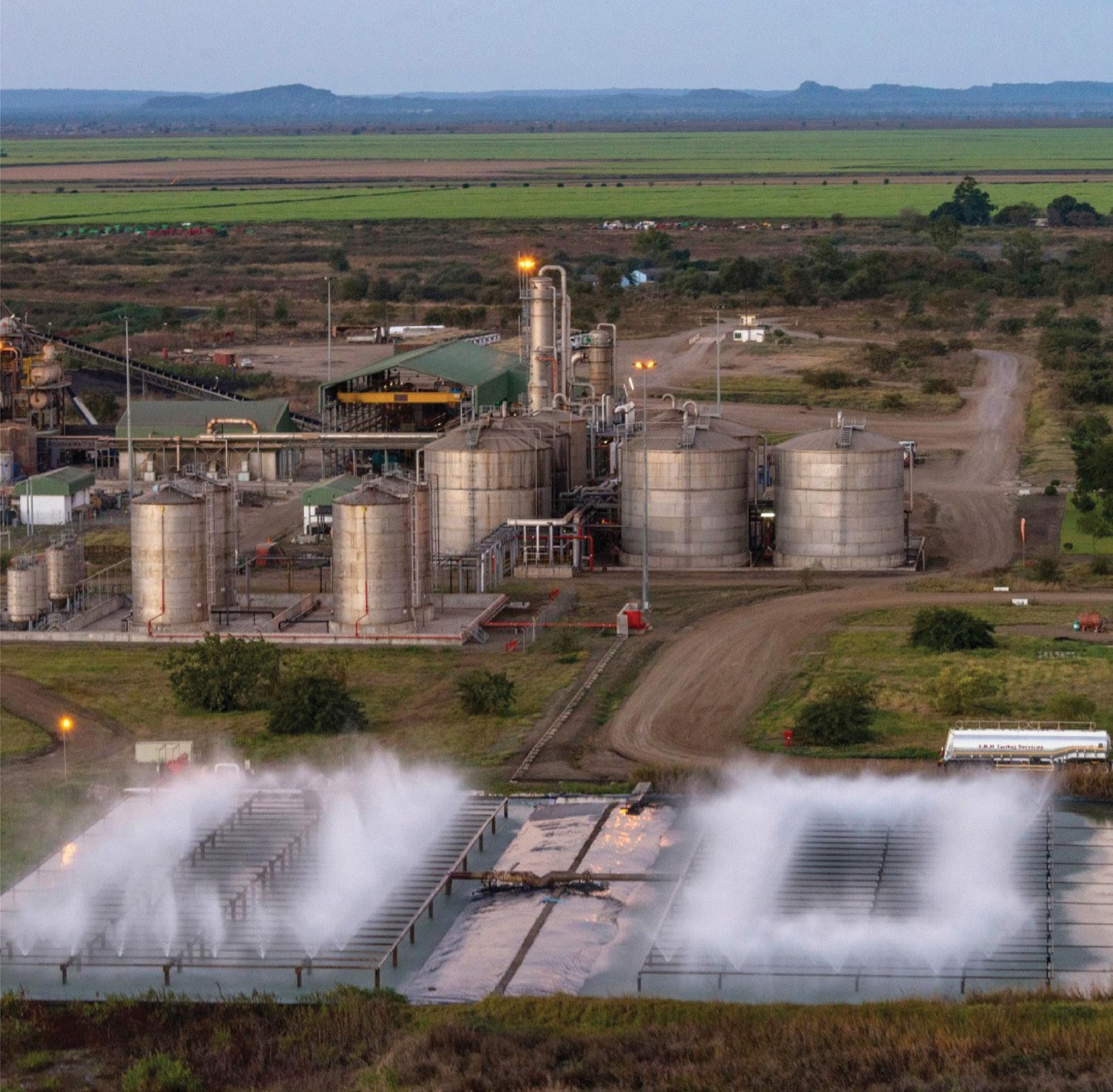
Environmentally, the benefits are equally compelling. Ethanol, blended with unleaded petrol, dramatically cuts greenhouse gas emissions by up to 90%. This is largely due to sugarcane plants absorbing CO2 during growth, creating a virtuous environmental cycle. Recent studies consistently confirm ethanol's positive energy balance, between 23 and 40 percent, underscoring its strong environmental credentials.
Economically, the consumer impact is tangible. Ethanol is consistently cheaper than petrol, so blending directly reduces fuel pump prices.
These savings boost consumer spending power, keeping money within the Zimbabwean economy and fostering domestic activity. Beyond its core business, Green Fuel deeply commits to social upliftment via its ‘Vimbo – Hope for a better future’ Corporate Social
Responsibility (CSR) program.
This comprehensive portfolio of community projects focuses on sustainable development, including irrigation farming, entrepreneurial support, and rehabilitation of education and social service infrastructure.
The hallmark of Green Fuel’s CSIR portfolio its commitment to develop 10% of all land under sugarcane for the local community. In line with this commitment, Green Fuel has allocated a substantial portion of its land for community irrigation, benefiting thousands of local families with access to land and water for farming.
This not only enhances food security but also provides opportunities for income generation through the sale
of surplus produce. To date, 1,120 hectares of land has been developed for small scale farmers in the form of irrigation schemes, benefiting over 2,200 families and ensuring access to water and technical support year-round, as well as a further 680ha developed for settler farmers and out growers.
The National Project endorsement truly reflects Green Fuel’s pivotal role in shaping a more prosperous, secure, and sustainable future for Zimbabwe.

Alteri Consultants, a Harare, Zimbabwe-based firm, is deeply committed to cultivating sustainable futures through impactful Corporate Social Responsibility (CSR) and transparent Sustainability Reporting. Their core philosophy, "dare to care," emphasizes doing good for business, people, and the environment, focusing on company, community, and conscience.
Alteri believes true success transcends profit, lying in building resilient organizations that positively contribute to communities and the planet. They empower businesses across diverse sectors to integrate sustainability into core strategies, transforming risks into opportunities for innovation, growth, and enhanced reputation.
As a leader in CSR andSustainability in Zimbabwe and Southern Africa, Alteri's mission is to foster positive relationships between communities and corporations, encouraging sustainable, impactful development that benefits client companies.
Alteri offers a comprehensive suite of services tailored to unique client needs. Their CSR Strategy Development involves collaborating with leadership to define purpose, identify stakeholders, and create authentic CSR initiatives aligned with business objectives and global best practices.
Through Sustainability Assessment & Materiality Analysis, they conduct rigorous evaluations to pinpoint significant Environmental, Social, and Governance (ESG) risks and opportunities, focusing efforts for maximum impact, recognizing ESG encompasses environmental, social, and governance factors.
Alteri provides expert guidance and support in Sustainability Reporting Framework Implementation to ensure frameworks suit client needs and regulatory requirements. They also assist with Data Collection & Analysis, establishing robust data management systems and providing insightful analysis to track progress and measure initiative impact.
Stakeholder Engagement facilitates meaningful dialogue with employees, customers, investors, and communities to inform CSR strategy and reporting.
Lastly, Capacity Building & Training empowers client teams with knowledge and skills to champion sustainability, fostering responsible business practices. This commitment reflects the belief that education is a powerful tool for change.

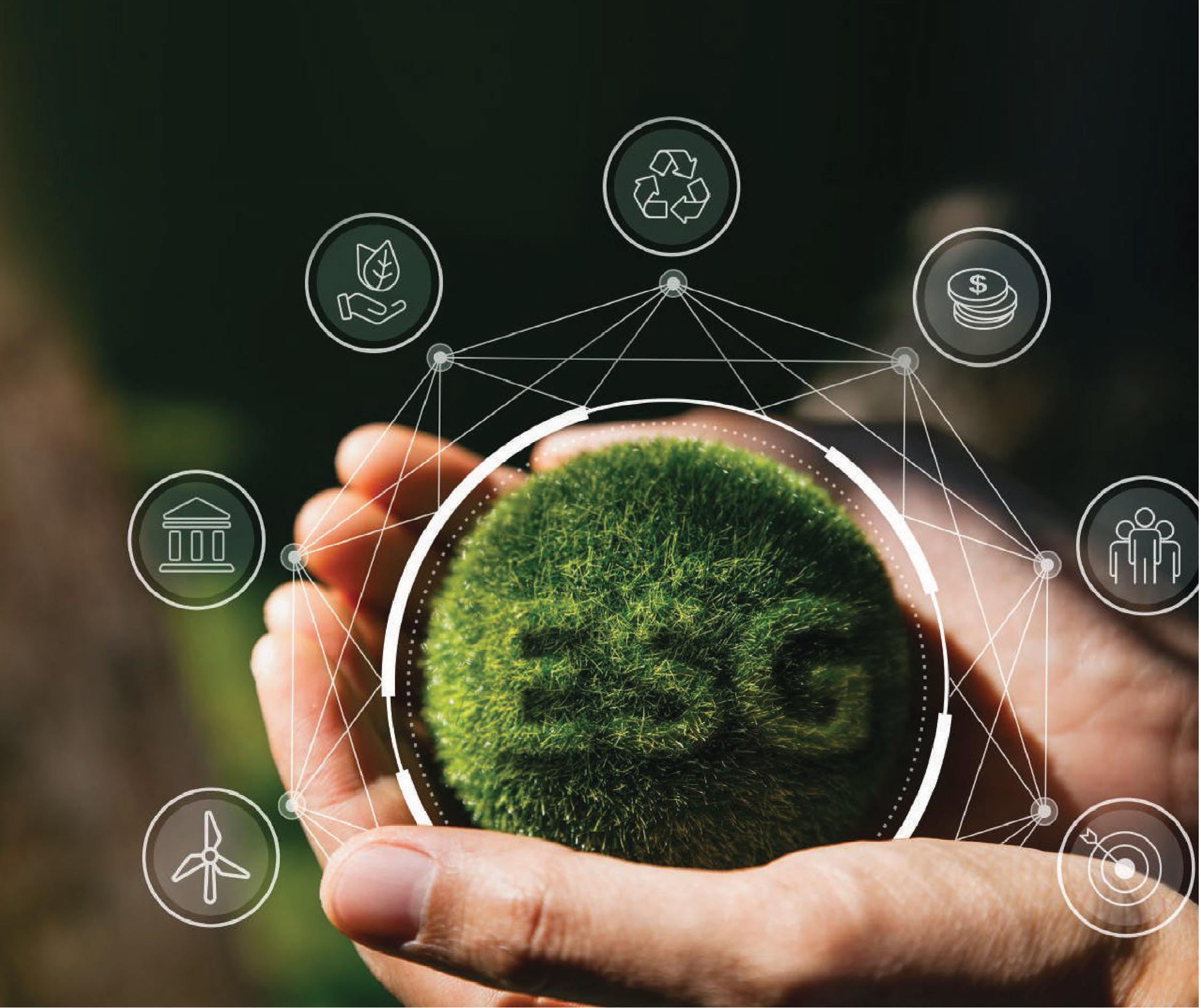

The expertise at Alteri Consultants is driven by a dedicated team. Nicole Rautenbach, Director of Alteri Consultants (Pvt) Ltd, is an experienced Sustainability and CSR Consultant. A BA/LLB (Hons) graduate, Notary Public, and GRI Certified Practitioner, Nicole has 12 years of experience in CSR and sustainability across Zimbabwe and Australia. As one of only ten GRI certified practitioners in Zimbabwe, she passionately guides organizations through sustainability frameworks, regulations, and best practices in line with Zimbabwean laws. Her expertise includes stakeholder engagement, data analysis, regulatory compliance, community development, and social impact.


Alexandra Mliswa, Executive Advisor at Alteri, is a lawyer with diverse experience in conflict management, crisis management, stakeholder engagement, and community development in mining and NGO sectors. Holding an LLB and an MSc in Peace, Leadership and Conflict Resolution, she actively contributes to CSR and sustainability in Zimbabwe, particularly in the extractive industry, through practice, research, articles, trainings, and seminars. Her drive has earned her recognition across Zimbabwe and Africa as a member of the Business Club Africa.
Henry Munangatire, Senior Consultant - Sustainability and Strategy, is an experienced strategist with over 15 years of experience across Africa and Europe. He advises on impactful initiatives in agriculture, mining, financial services, infrastructure, renewable energy, and international trade. Henry collaborates with European think tanks and African multilateral institutions to bridge investment and sustainability, fostering economic growth and social impact.
At Alteri, he develops strategic CSR solutions and strengthens EU-Africa business partnerships through policy advisory, stakeholder engagement, and investment facilitation, delivering measurable returns for companies and communities. Henry holds a Joint Master's in Global Economic Governance and Public Affairs, is a Certified Policy Officer, and has executive experience in global risk and sustainable finance with KfW Bank and the European Investment Bank.
Contact Information:
• Phone: +263 777 370 926
• Email: nicole@alteri.co.zw
• Website: www.alteri.co.zw
• Facebook: AlteriConsultants


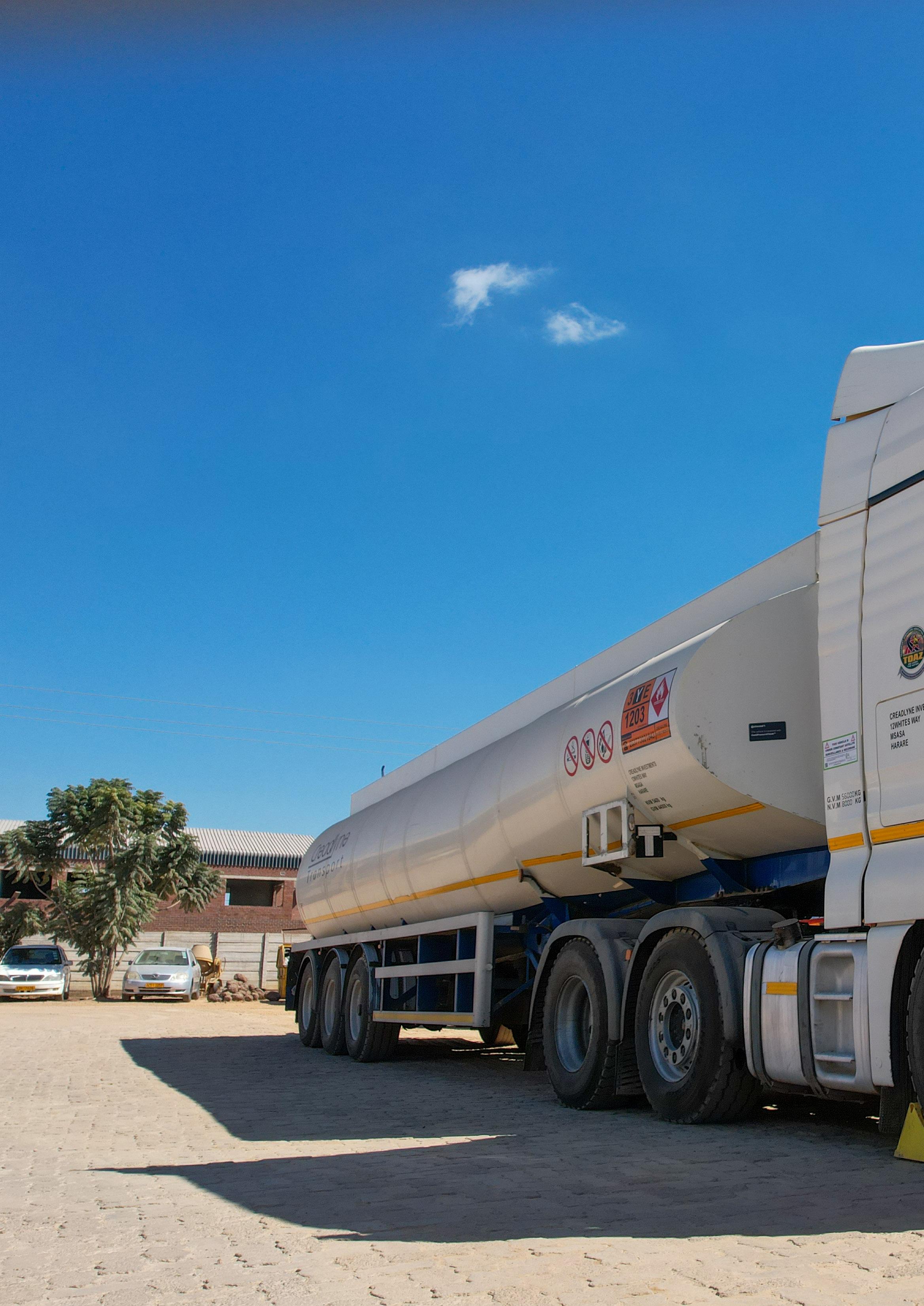
C readlyne Transport is a trusted logistics company specializing in fuel transportation in Zimbabwe and the broader Southern African region. With operations since 2007, we prioritize customer satisfactiwon, quality service, and safety.
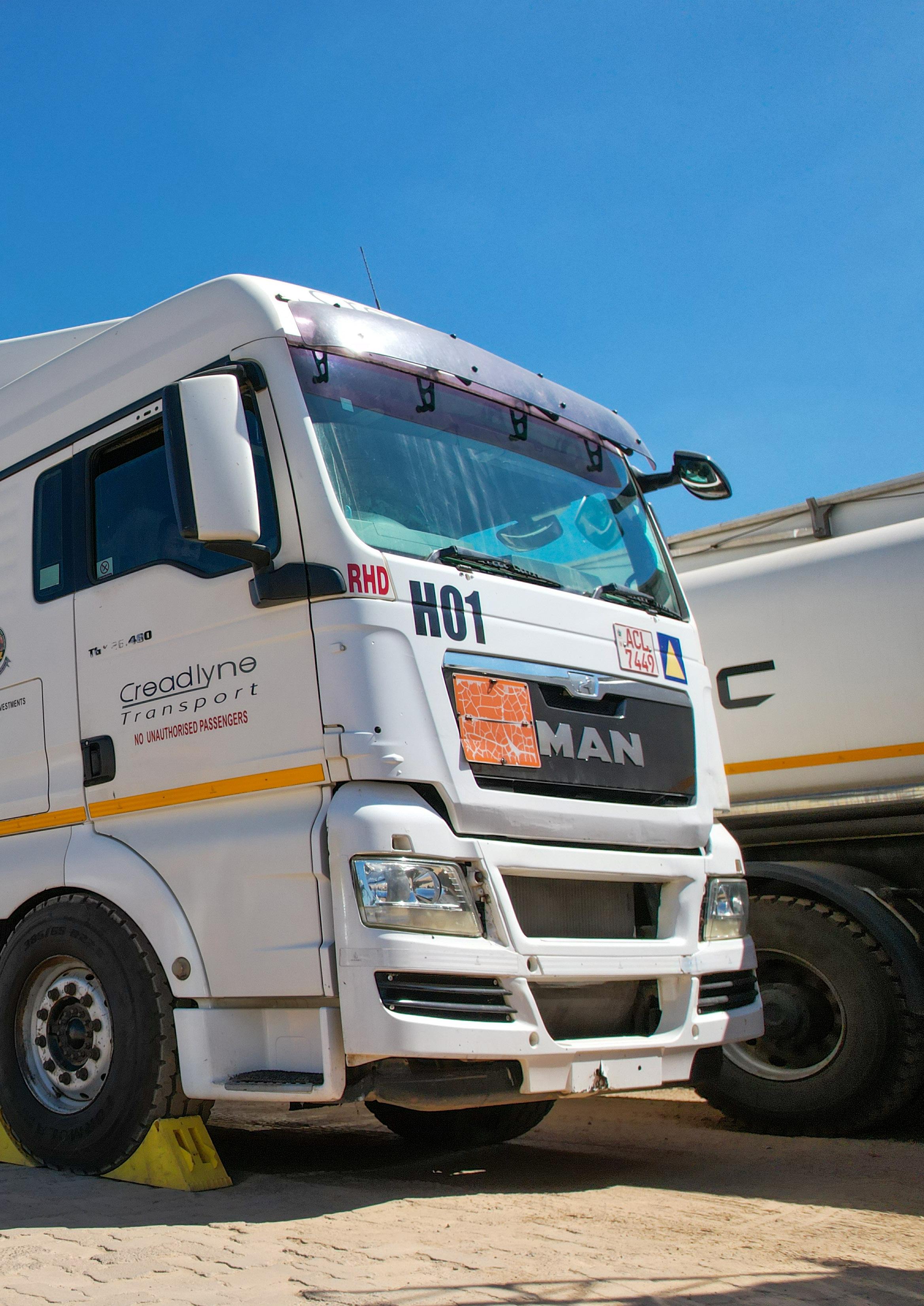
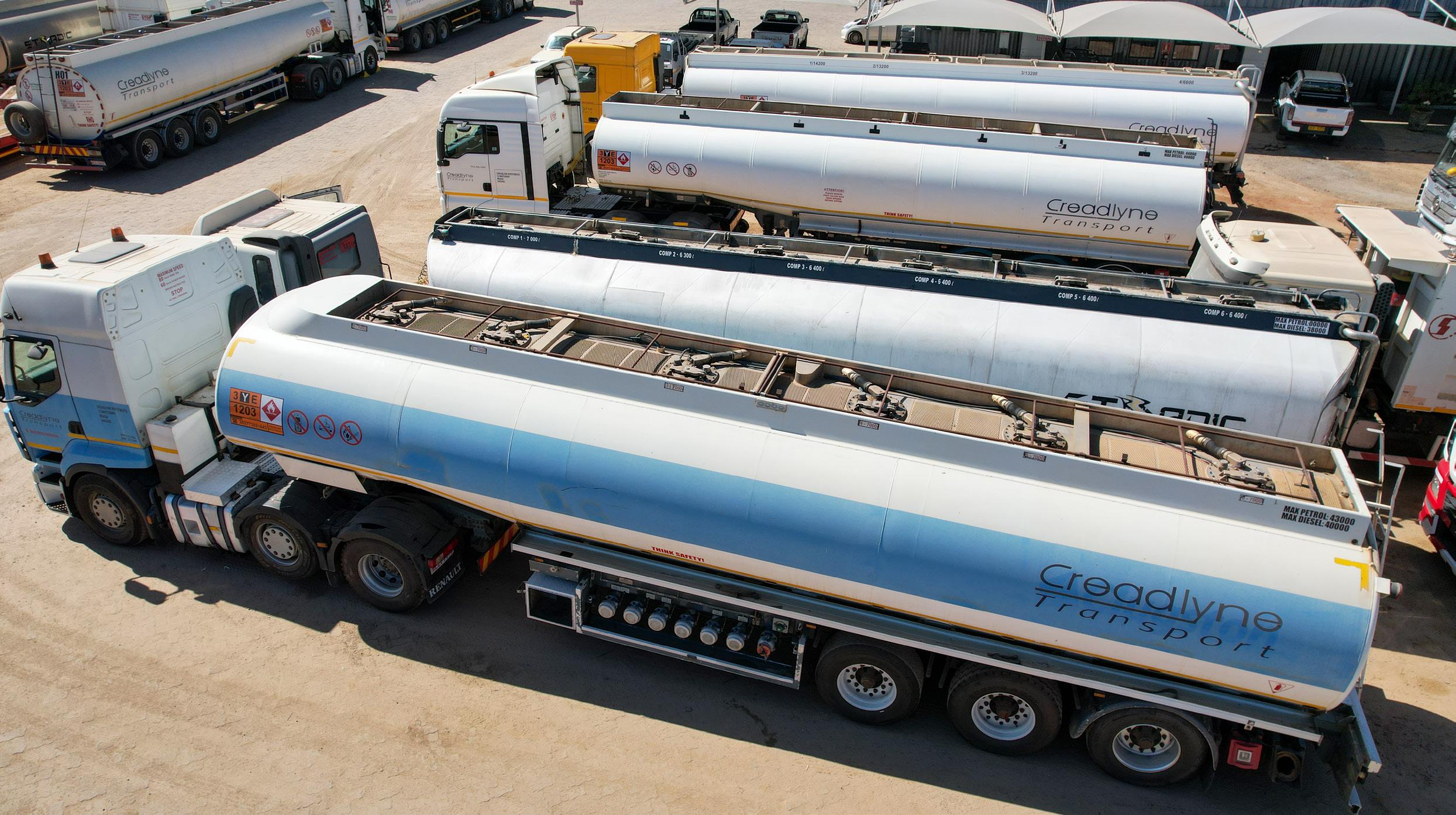
• Reliable and efficient fuel transport solutions
• Well-maintained fleet
• Commitment to safety, compliance, and customer satisfaction
• Experienced leadership and dedicated team
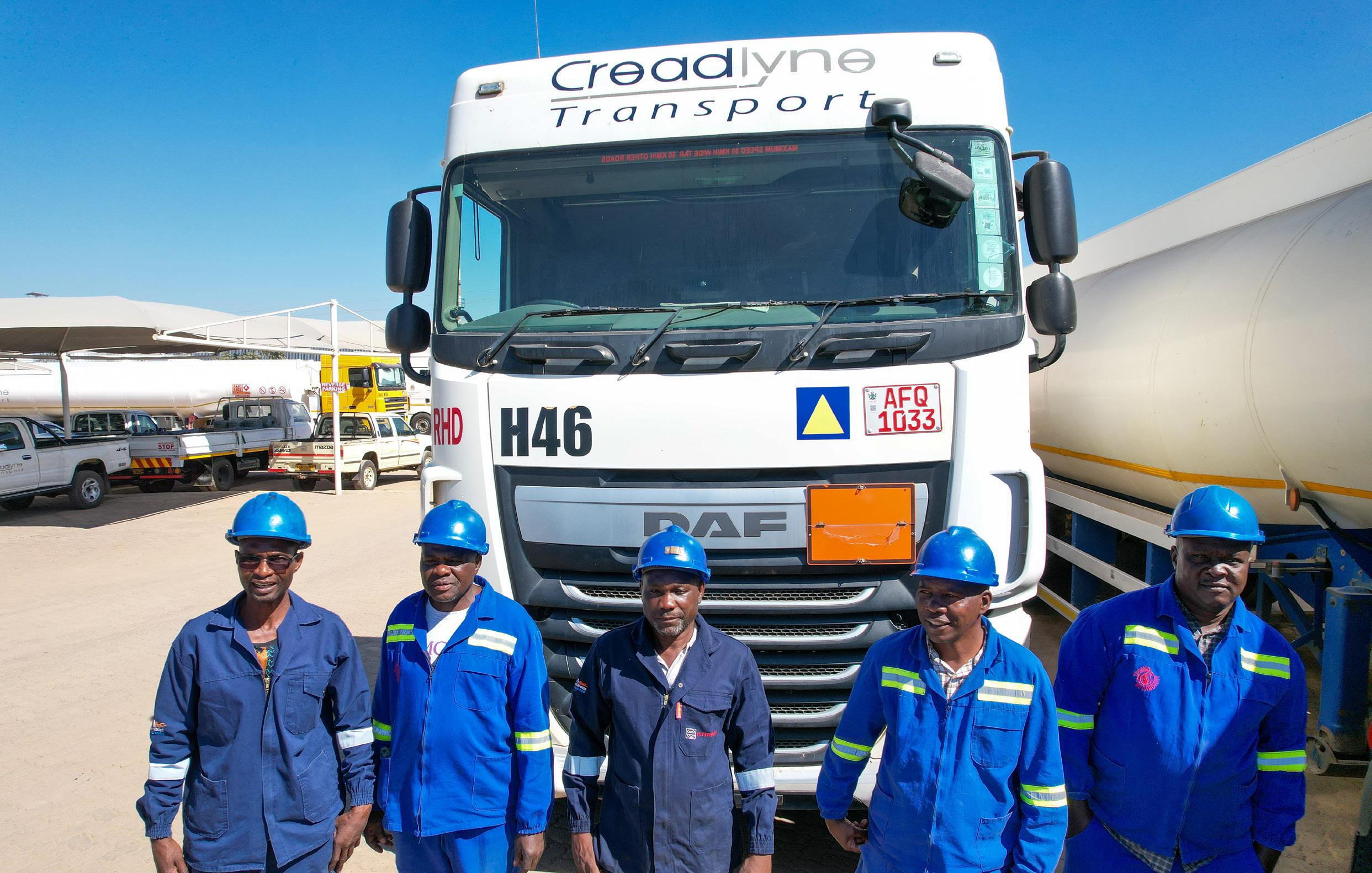
Zimbabwe is poised to embark on large-scale manufacturing of solar panels and lithium batteries, marking a significant stride towards bolstering its renewable energy sector and fostering economic growth. The government is actively facilitating collaborations between local universities and international companies to acquire essential expertise and technology for this ambitious undertaking.
This development follows the recent approval of a Memorandum of Understanding with the International Solar Alliance (ISA). This agreement will pave the way for the establishment of a Solar Technology Application Resource Centre (STAR-C) at Chinhoyi University of Technology. The STAR-C initiative is strategically designed to cultivate local capacity in solar energy deployment, research, development, and innovation, thereby providing a substantial boost to the nation's renewable energy capabilities.
Speaking at the recently concluded sixth International Renewable Energy Conference and Expo, the Minister of Energy and Power Development highlighted the nation's conviction in the future of renewable energy, driven by available technology. He emphasized the government's commitment to partnering with local universities, citing the Cabinet's approval of a collaborative project with Chinhoyi University of Technology focused on solar energy.
The comprehensive project will encompass all facets of solar innovation, research, training, and the potential for domestic manufacturing of solar panels. Furthermore, the initiative will explore opportunities in battery production, leveraging the country's existing lithium resources. The minister expressed optimism that
these opportunities are now accessible for widespread participation.
The Minister underscored the importance of investing in renewable energy to propel the national economy forward. He stressed that the integration of solar and other renewable energy sources must be contextualized within Zimbabwe's diverse economy, which comprises 17 sectors, including significant contributors like agriculture, mining, industry, and manufacturing. He urged stakeholders in the renewable energy sector to focus on these key areas and identify specific opportunities for renewable energy adoption within each.
Furthermore, the Minister advocated for a transition away from the reliance on firewood as a primary energy source, urging the nation to embrace cleaner energy alternatives. He specifically addressed the issue of clean cooking, emphasizing the goal of liberating women from the health hazards associated with smoke produced by burning wet wood, particularly during the rainy season. Promoting clean cooking solutions is therefore an integral part of the government's energy strategy.
In a bid to optimize the utilization of solar energy, the Minister encouraged property owners, businesses, and homeowners generating surplus solar power to participate in net metering. This system enables solar energy producers to feed excess electricity back into the national grid and receive credit for it, effectively paying only for the net energy consumed. This two-way exchange system promotes a more efficient use of renewable energy resources, allowing both individual producers and the national grid to benefit.
The Minister concluded by emphasizing that energy efficiency is no longer optional but a critical necessity. He asserted that it represents one of the most
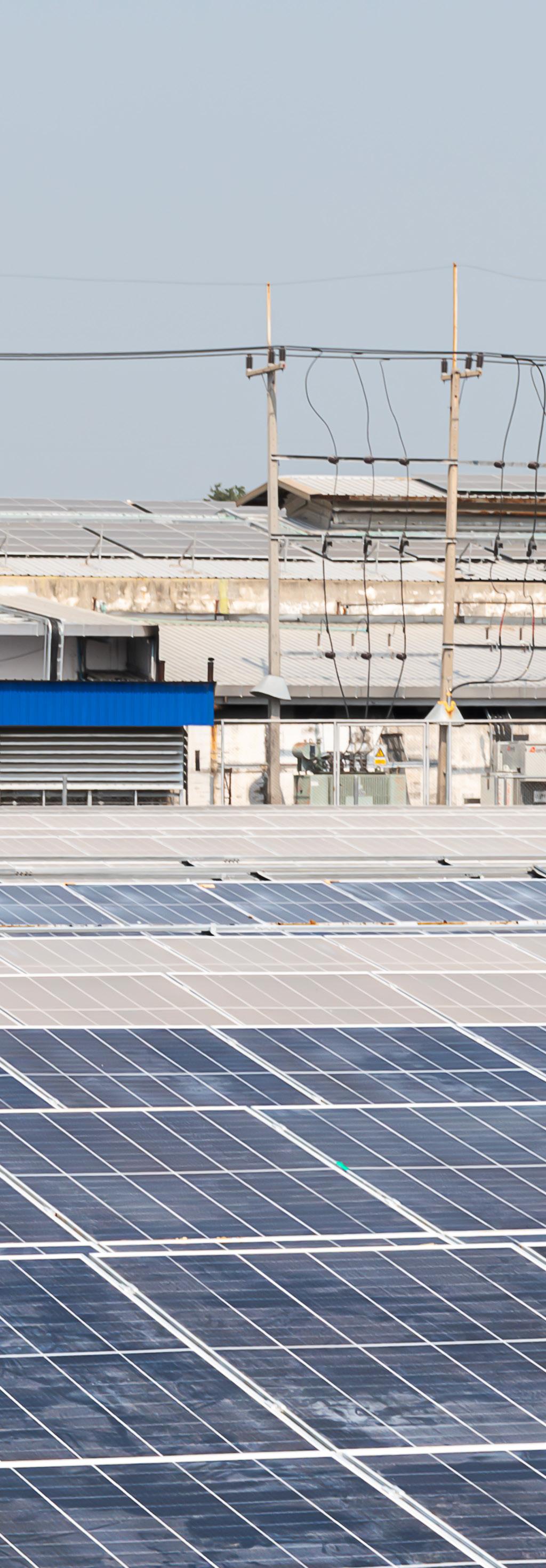
It is a combustible fuel gas produced from the anaerobic (airless) breakdown/fermentation/ decomposition of any organic materials by bacteria.
Biogas is a mixture of Methane, Carbon Dioxide and a small percentage of Hydrogen Sulfide, water vapor, Nitrogen, Hydrogen.
The methane component constitutes more than 50% and this makes combustible.
The non-poisonous biogas burns with a blue flame which does not produce soot and smoke.
One characteristic of biogas that it safe to use is that its lighter than air and therefore gas leak is less likely to cause explosions.
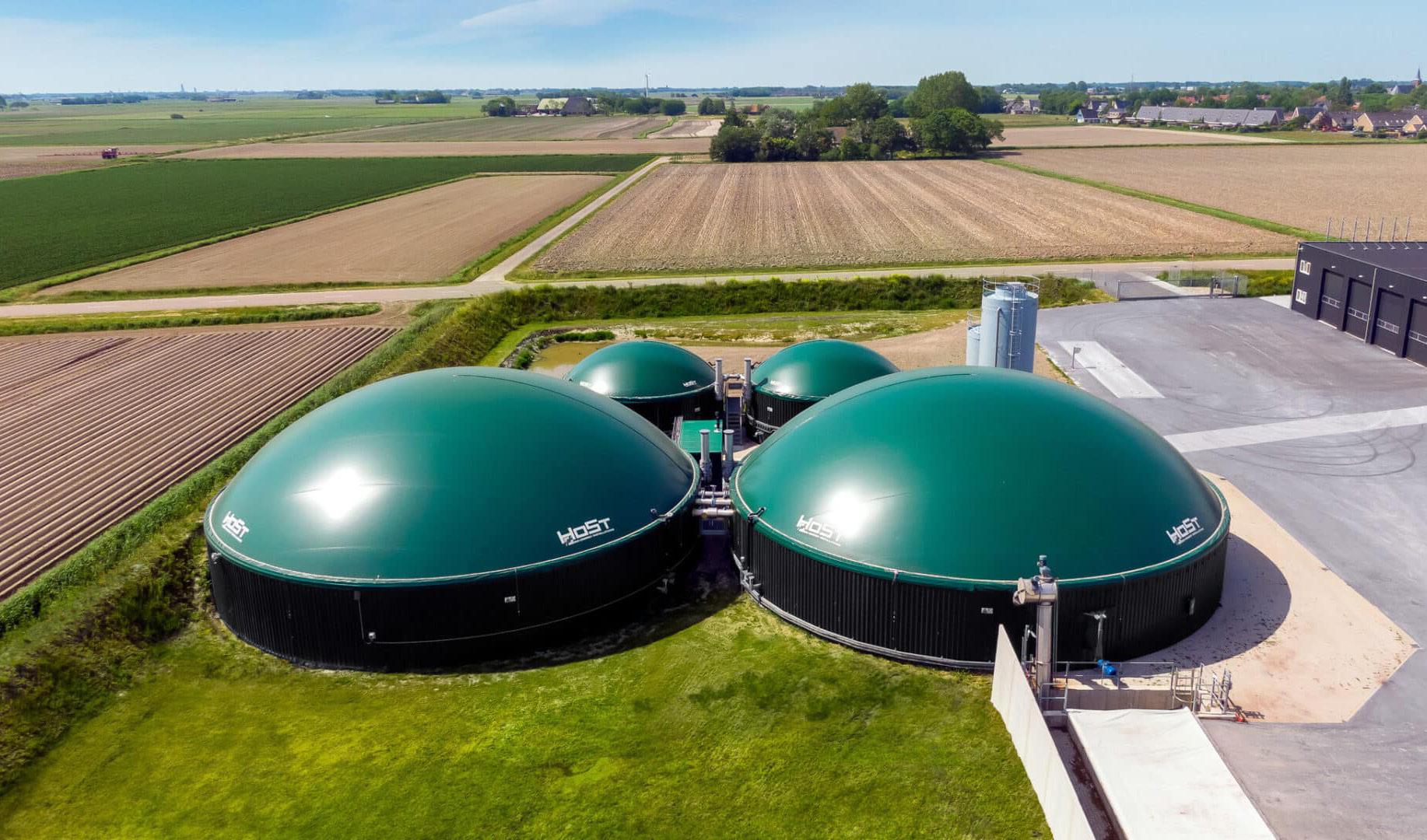
A biogas digester is a specially designed airtight plant/tank/ structure in which biogas production takes place.
Biogas digesters can come in different forms and made from different material but the currently promoted model in Zimbabwe is called the fixed dome design which is constructed underground using bricks and cement (locally available materials).
In Zimbabwe, we adopted the Modified Carmatec Design from Tanzania.
They also come in different sizes (domestic sizes and institutional sizes)
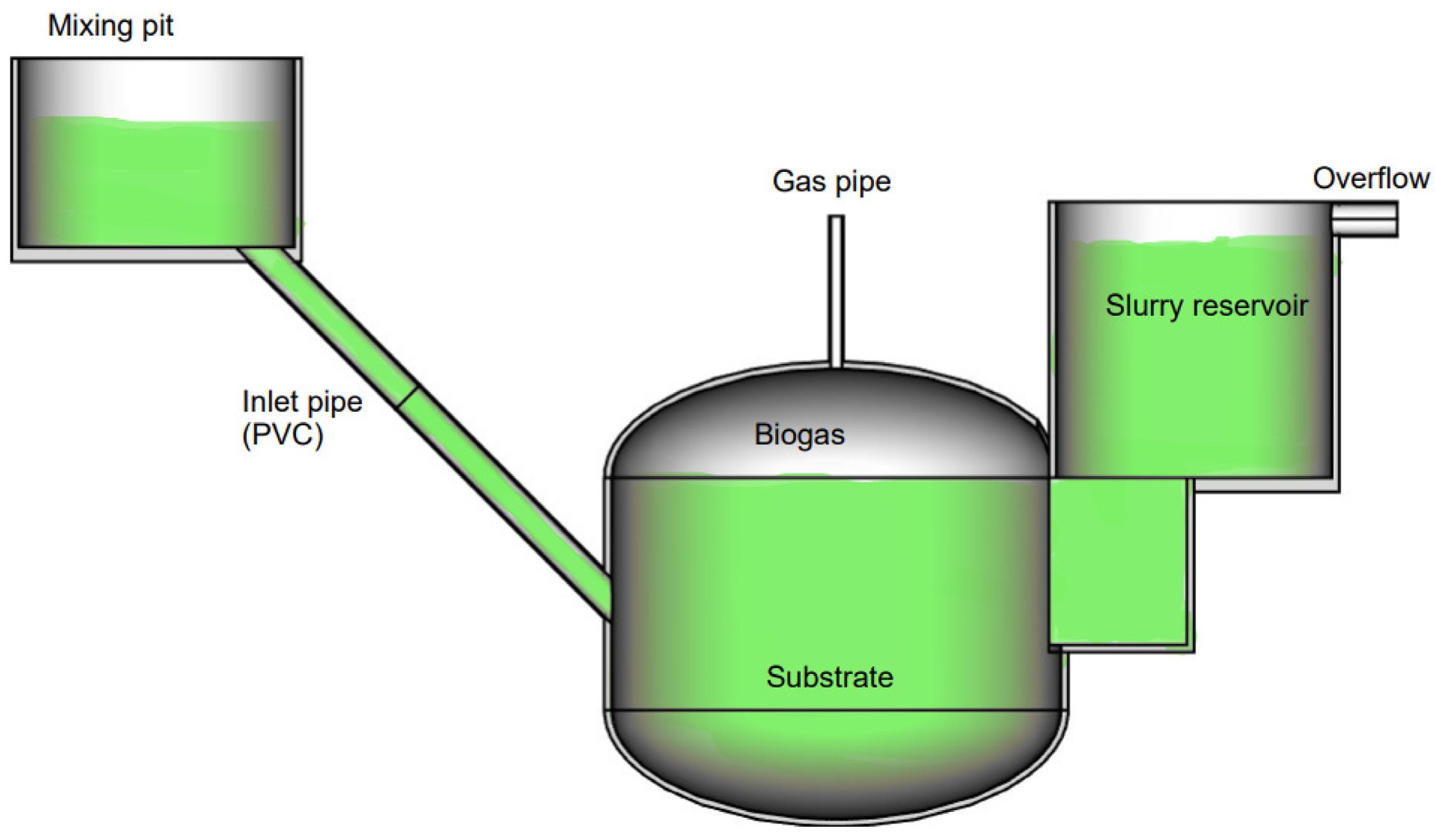
Key
Inlet: This is where the biogas digester is fed with organic material/ feedstock material
Main Dome: This is where fermentation and gas production take place
Expansion Chamber: Also known as the displacement chamber or hydraulic tank houses the digested slurry from the main dome and helps push the gas out when it’s needed by user
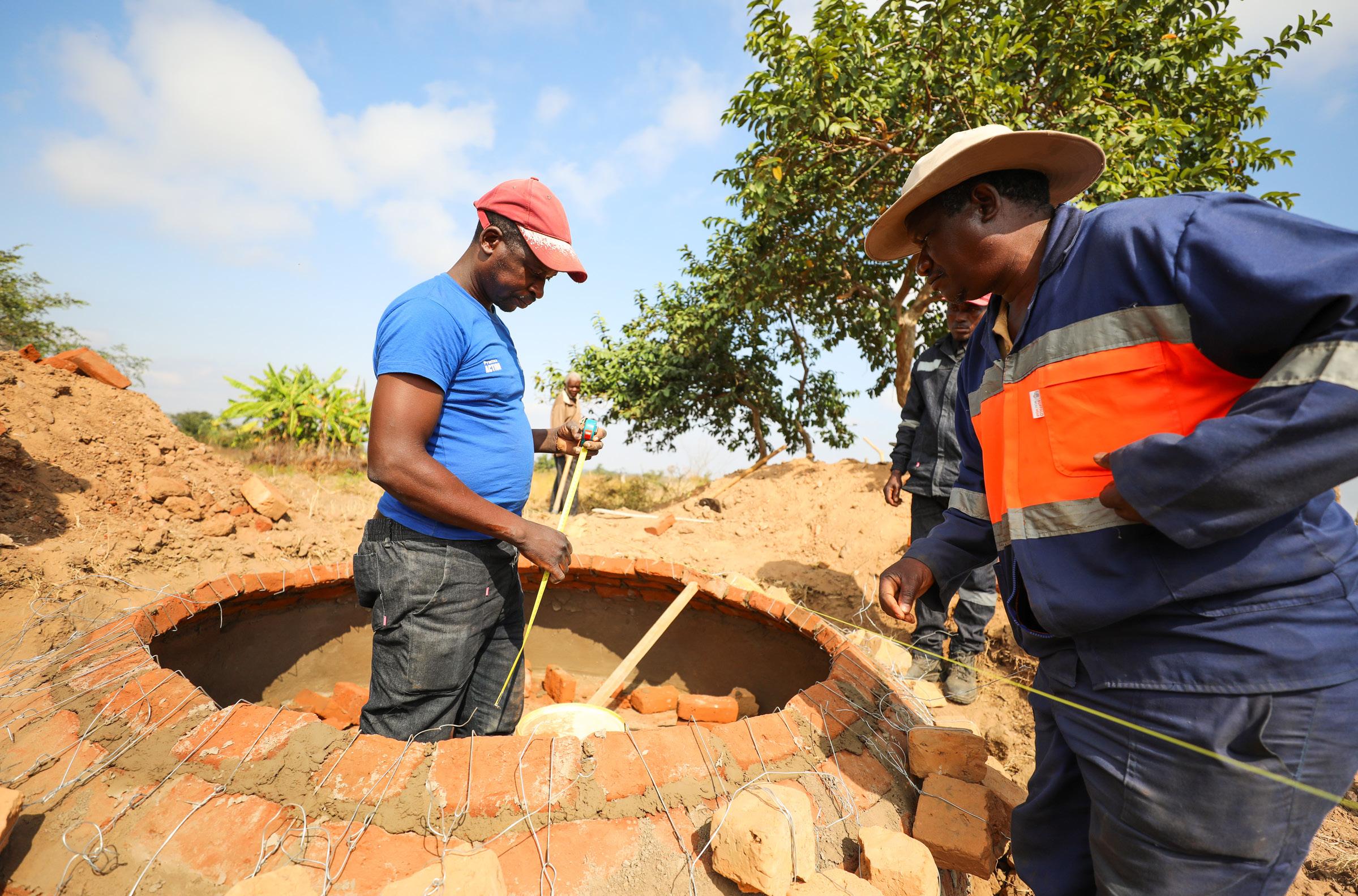
Biogas digester construction during a practical training session and a completed system
• Adequate waste for digester daily feeding and a water source. For example, for a small digester 6m3, you need to have at least 8 cows or 40-60kg of waste.
• Most construction material such as locally available materials (bricks, river sand, pit sand, concrete stones) and things you need to buy from local hardwares (cement, chicken mesh wire, deformed bars). Please note that the complete BOQ will be provided by biogas builder.
• Gas piping materials (Galvanized Steel (GS) dome pipe, GS pipes, GS & HDPE connections and HDPE)
• Trained biogas builder/ Masons
Any biodegradable organic material can be fed into a digester to produce biogas. This includes:
The digester is fed at least daily with the required quantity of organic material. The organic waste is mixed well with water then fed into the digester. The common feed in rural areas is cow dung and this is mixed well with same quantity of water (porridge like)

In Zimbabwe, Biogas is used primarily for:
• Cooking using biogas stoves
• Lighting using biogas lamps
• Heating using gas burners
• Refrigeration using biogas fridges
• Power generation using biogas generators
The technology is used to:
• provide energy in the form of gas,
• provide sanitation by killing harmful microbes during anaerobic fermentation inside main dome and also
• provide organic fertilizer in the form of bio slurry

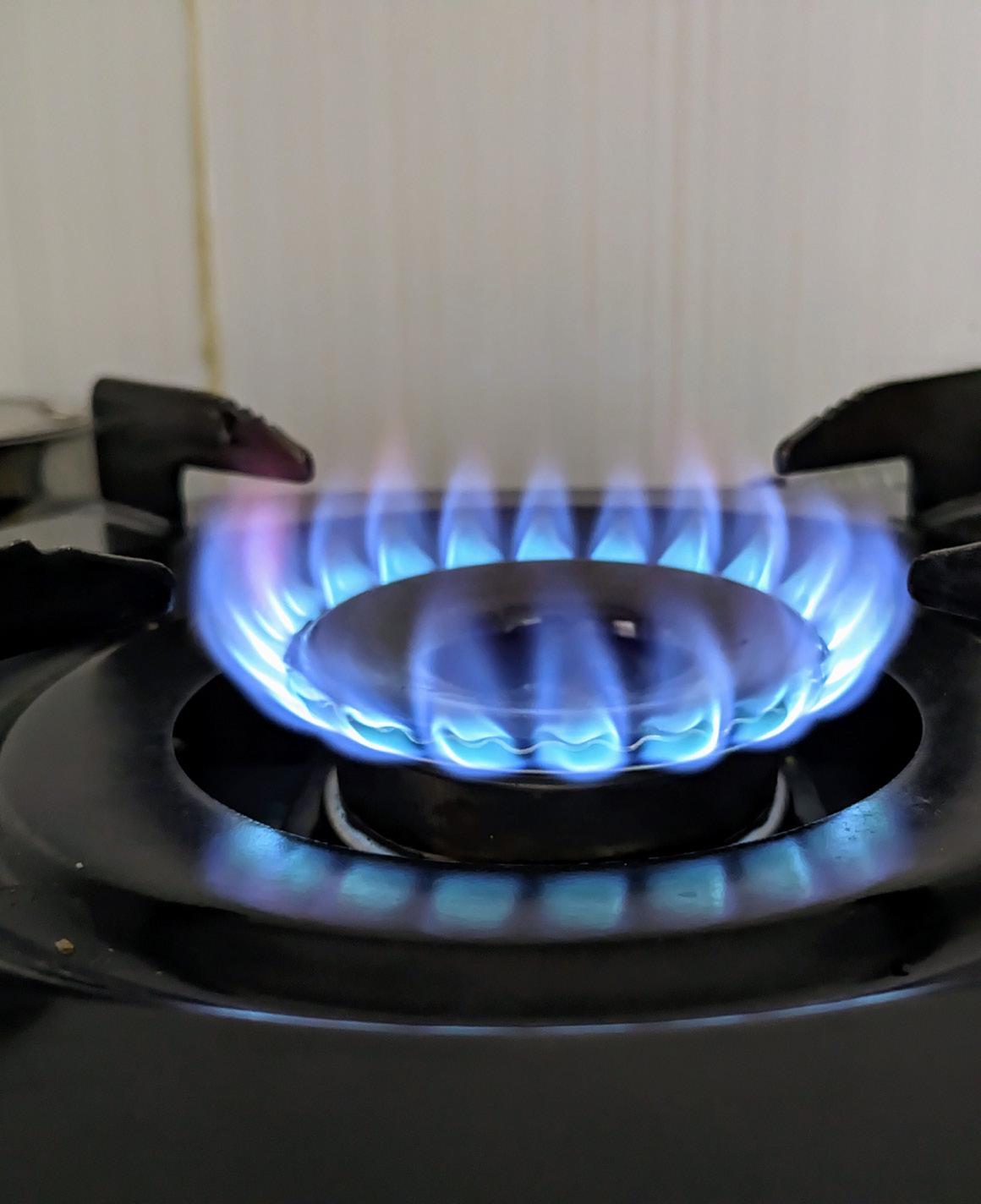
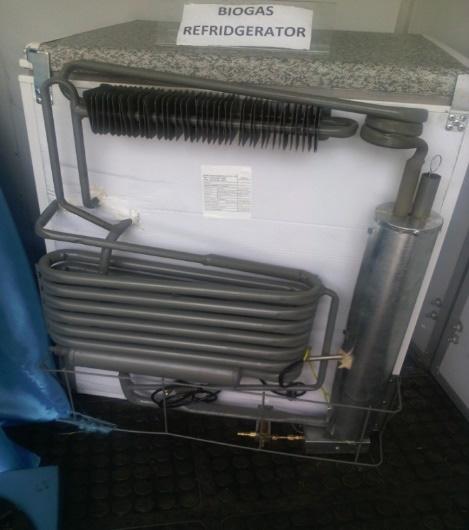
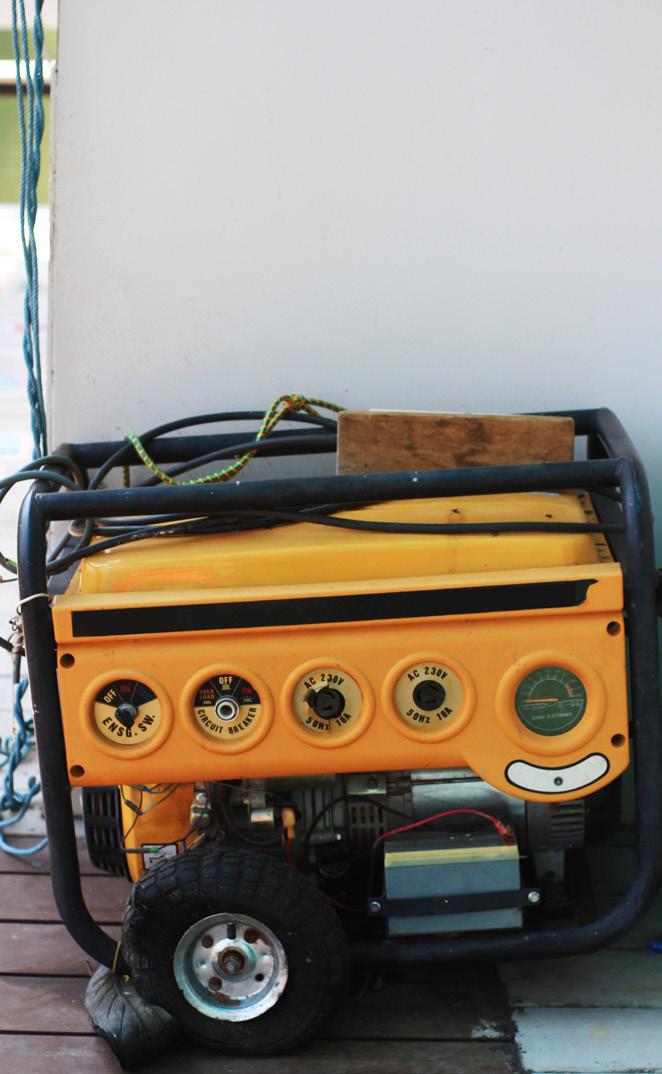


Zimbabwe and Mozambique have solidified a groundbreaking energy cooperation agreement, poised to significantly reshape the energy landscape and infrastructure across southern Africa.
The landmark deal, signed recently in Maputo by Zimbabwe's Energy and Power Development Minister July Moyo and his Mozambican counterpart Estêvo Pale, paves the way for enhanced collaboration across the electricity, petroleum, and renewable energy sectors, ushering in a new era of bilateral partnership.
A key aspect of the agreement will see a substantial increase in Zimbabwe's fuel imports from Mozambique, rising from the current 3 billion litres annually to 5 billion litres through the existing pipeline infrastructure. This boost in fuel supply is expected to bolster Zimbabwe's energy security and contribute to overall economic stability.
The Memorandum of Understanding (MoU) outlines a comprehensive framework for deeper collaboration, encompassing petroleum product trade, the efficient utilisation of existing infrastructure, strategic investments in natural gas resources, and joint ventures in power generation, energy trading, and transmission network development.
This multifaceted partnership aims to strengthen both nations' energy security while simultaneously fostering stronger economic ties and regional integration.
Building upon their long-standing historical connections that trace back to the liberation struggle, Zimbabwe and Mozambique are leveraging their shared heritage to pursue collaborative infrastructure projects.
These joint initiatives will prioritize energy efficiency, promote the adoption of sustainable energy practices, and explore opportunities in biofuels, aligning with global efforts towards cleaner energy sources.
As the Southern African region continues to grapple with persistent energy challenges, this strategic partnership between Zimbabwe and Mozambique has the potential to serve as a compelling model for effective cross-border cooperation. By pooling resources and expertise, the two nations aim to attract further investment and drive innovation within this critical sector, potentially setting a precedent for regional energy solutions.
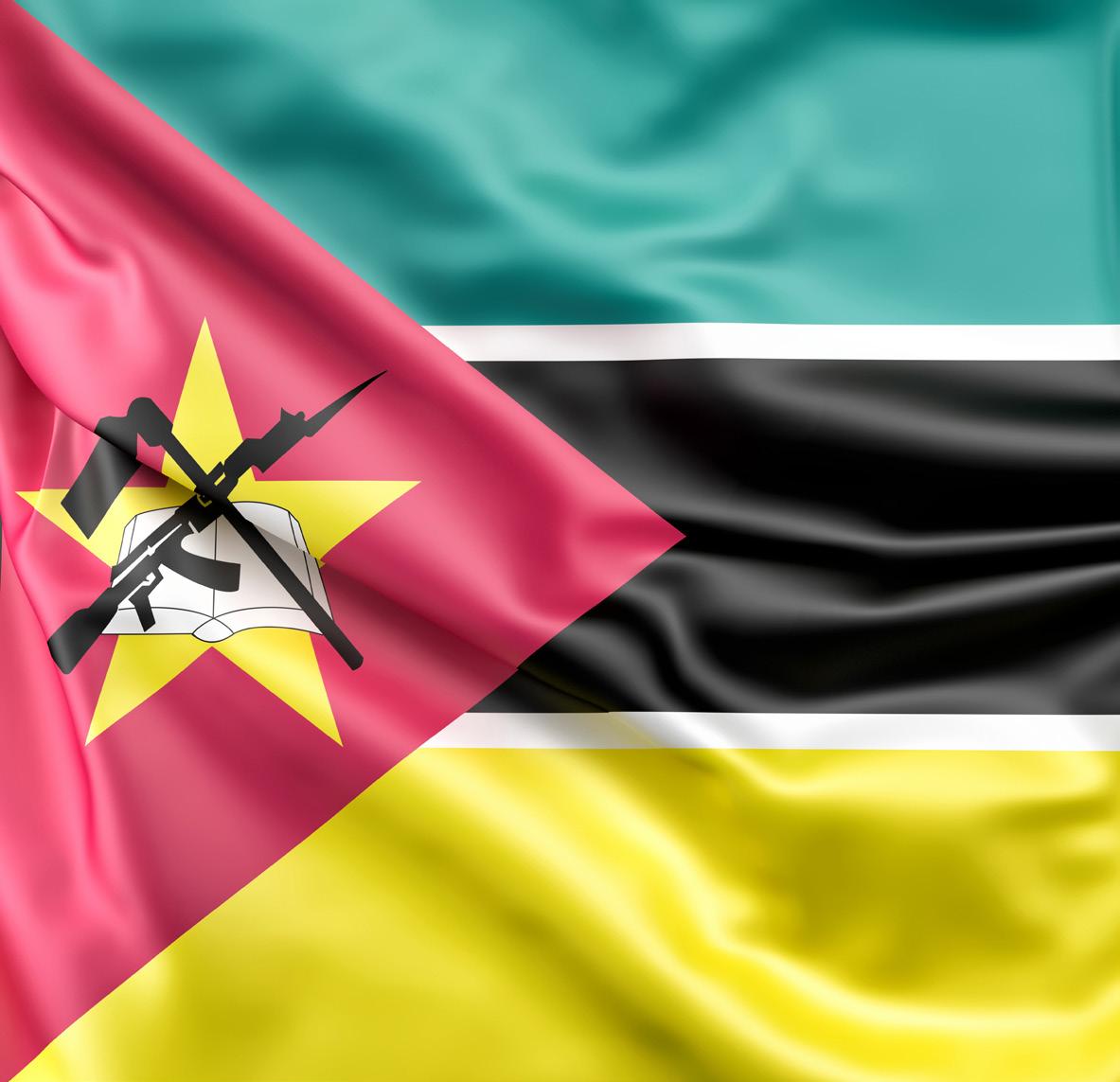
Minister Moyo's presence in Maputo was for the two-day Mozambique Mining and Energy Conference and Exhibition (6 to 7 May).
The conference served as a platform to explore crucial policy frameworks, effective risk mitigation strategies, and adaptable approaches to navigate evolving geopolitical environments within the energy and mining sectors.
The landmark energy deal between Zimbabwe and Mozambique underscores the proactive steps being taken by regional players to address energy security and foster sustainable development through strategic collaboration.
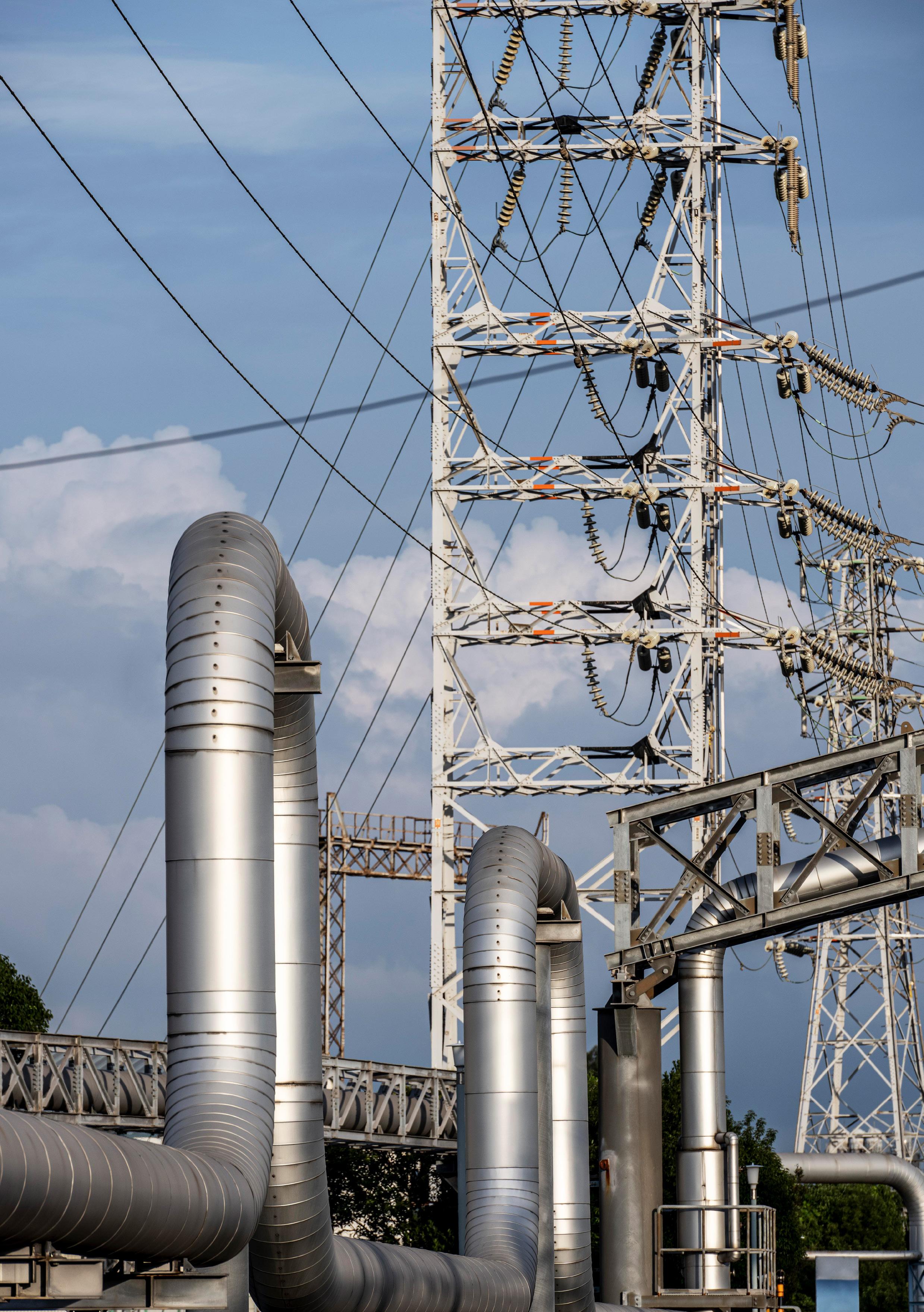
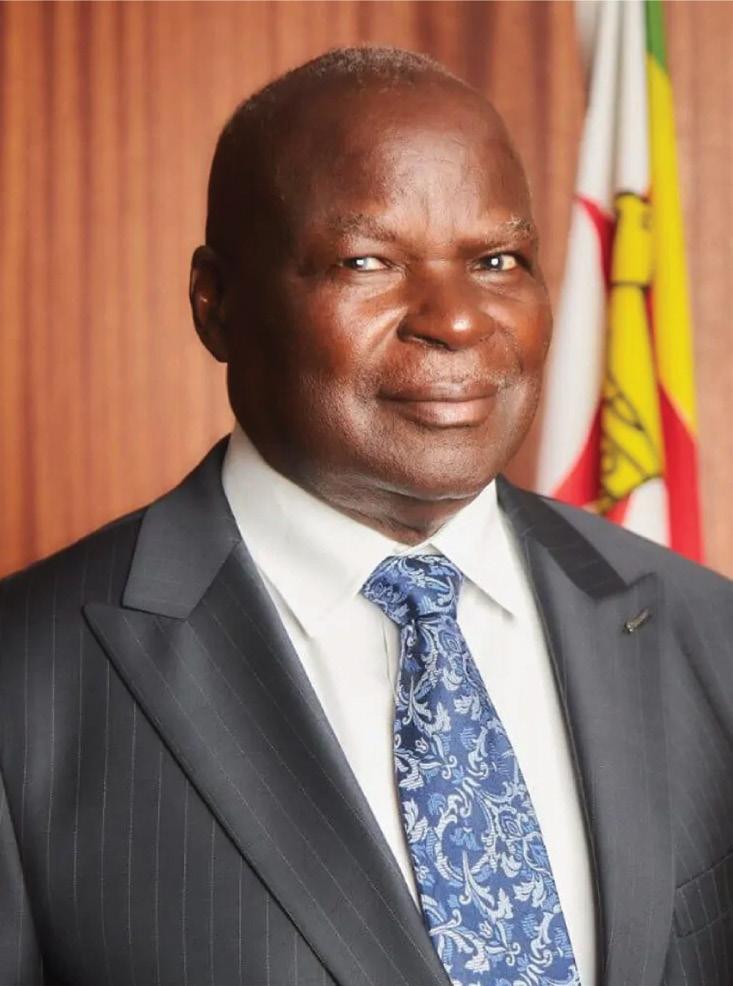
Zimbabwe's Minister of Energy and Power Development, Honourable July Moyo, recently issued a compelling invitation to American companies to explore investment opportunities within the nation's burgeoning energy sector.
This call comes at a significant juncture as the United States undergoes a notable shift in its coal utilization policy, potentially freeing up capital and expertise for deployment in other markets. Minister Moyo emphasized Zimbabwe's commitment to developing a diverse and sustainable energy mix, highlighting the potential for mutually beneficial partnerships with American firms.
Zimbabwe possesses considerable untapped potential in various energy domains, including solar, hydro, and thermal power generation. The government has actively been pursuing policies aimed at attracting foreign direct investment to bolster its energy infrastructure and ensure a reliable power supply for its growing economy.
Minister Moyo articulated the strategic advantages of investing in Zimbabwe's energy sector, citing the

country's stable political environment, investor-friendly regulations, and its strategic location within the Southern African Power Pool.
The potential pivot in US coal policy could see American energy companies seeking new avenues for growth and diversification. Zimbabwe's energy needs present a compelling case, offering opportunities for investment in both traditional and renewable energy projects. The minister underscored the government's willingness to engage in constructive dialogue and offer attractive incentives to American investors looking to establish a foothold in the Zimbabwean energy market.
This invitation aligns with Zimbabwe's broader vision of achieving energy self-sufficiency and

becoming a net exporter of electricity in the region. Zimbabwe’s ability to attract international expertise and capital, particularly from a technologically advanced nation like the United States, will ensure it to accelerate the development of its energy resources and ensure a secure and sustainable energy future for its citizens and industries.
The potential for collaboration spans various aspects, from infrastructure development and technology transfer to capacity building and the adoption of best practices in the energy sector.
Minister Moyo's proactive outreach signals Zimbabwe's readiness to embrace international partnerships and capitalize on global energy trends to fuel its economic growth.
The Zimbabwean government has officially approved a Memorandum of Understanding (MoU) with Zambia, paving the way for the development of a new pipeline system dedicated to transporting refined petroleum. This significant bilateral agreement, announced by Information, Publicity and Broadcasting Services Minister Dr. Jenfan Muswere during a recent post-Cabinet briefing, marks a crucial step in enhancing regional energy infrastructure and fostering economic cooperation.
The core objective of this MoU is to leverage Zimbabwe’s existing and expanding capacity in oil and gas storage, processing, and transportation. This infrastructure will serve Zambia’s growing demand for more affordable and efficient energy solutions. By establishing this cross-border pipeline, both nations are committed to stimulating private sector development while simultaneously improving overall energy accessibility across the region.
The new pipeline project is anticipated to revolutionize fuel transportation between the two countries, making the process significantly more efficient and environmentally conscious. A key benefit highlighted is the expected reduction in the number of fuel tankers currently utilizing shared road networks. This shift from road to pipeline transportation will not only ease congestion but also substantially decrease damage to vital road infrastructure, contributing to long-term cost savings and improved road safety.

Beyond the immediate logistical and environmental advantages, the pipeline project is poised to deliver broader economic benefits. By moving fuel via a secure and regulated pipeline system, both Zimbabwe and Zambia aim to combat fuel tax evasion, significantly reduce transportation costs for refined petroleum products, and ultimately bolster their respective energy security. This move towards a more streamlined and secure supply chain will create a more stable and predictable energy landscape for businesses and consumers alike.
The agreement underscores a shared vision for regional energy integration and highlights Zimbabwe’s strategic position as a potential logistical hub for refined petroleum products in Southern Africa. While specific timelines for implementation and detailed funding mechanisms are yet to be fully disclosed, the approval of this MoU lays the essential groundwork for feasibility studies, potential public-private partnerships, and collaborative regulatory frameworks. Technical teams from both nations are expected to commence planning and consultation in the coming months, moving the project from conceptualization to tangible development. This initiative represents a strong commitment to sustainable development and regional collaboration, promising a more efficient and secure energy future for Zimbabwe and Zambia.

TDistribution Company (ZETDC) recently went on a nationwide initiative to conduct regular inspections of customer electrical installations, aiming to reduce the alarming number of avoidable electrical accidents.
This move is mandated by Statutory Instrument (SI) 177 of 2018, which empowers ZETDC to ensure the safety and compliance of electrical systems across various sectors.
The inspection frequency varies depending on the type of installation, with domestic premises being checked every ten years, commercial, educational, and hospital
facilities every five years, and industrial sites every three years.
Buildings open to the public, such as cinemas, places of worship, and leisure complexes, will be inspected annually, along with restaurants, hotels, and theatres.
Agricultural and horticultural installations will be checked every three years, while caravan sites and petrol/LPG filling stations will receive annual inspections.
Special installations, including emergency lighting and fire alarms, are also subject to regular checks, with varying intervals.
Temporary installations will be inspected every three
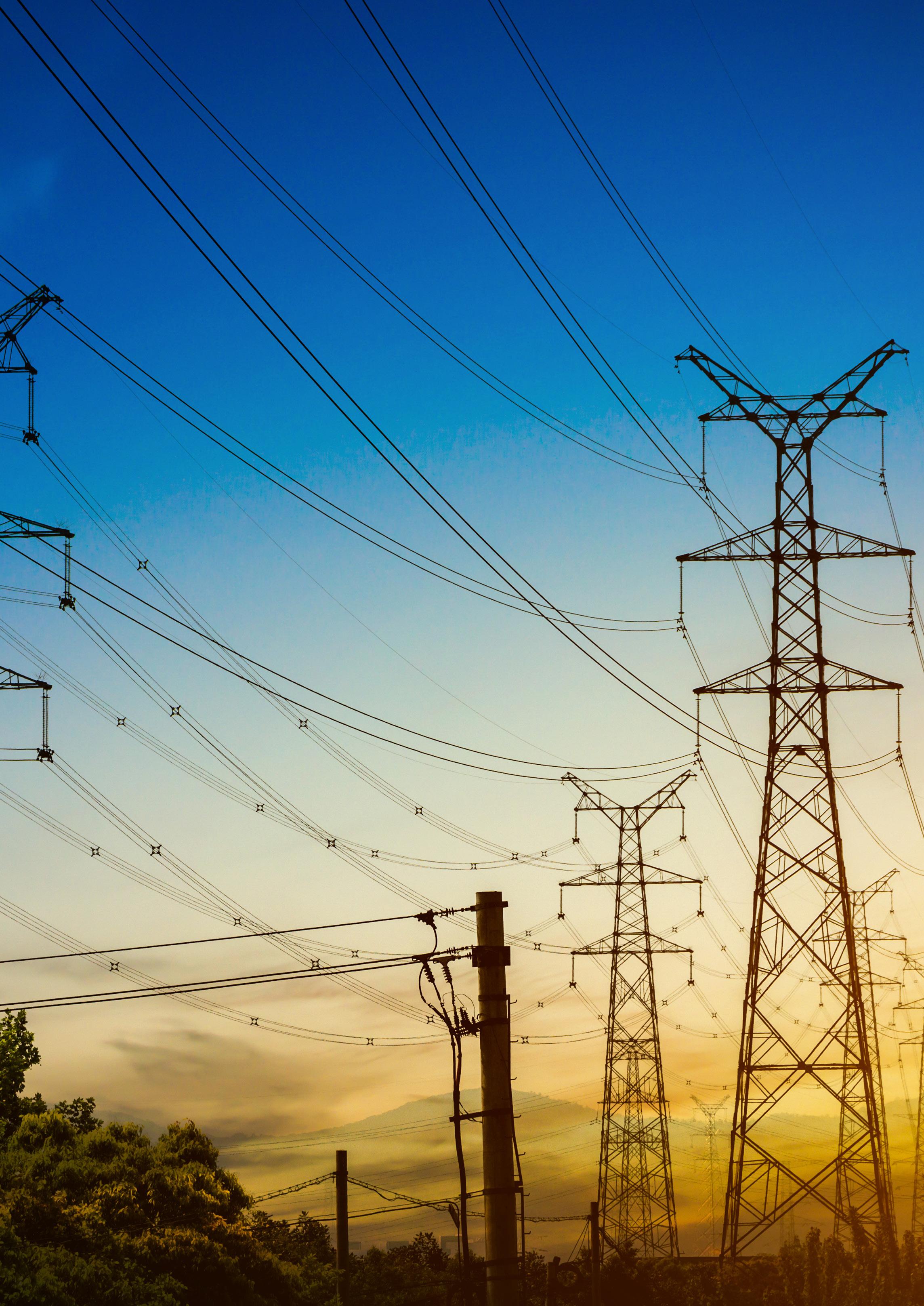

months, and generators, regardless of fuel source, will be examined annually.
The Zimbabwe Energy Regulatory Authority (ZERA) will oversee these inspections to guarantee adherence to regulations and the safety of all installations. ZETDC urges customers to cooperate with the inspection process, emphasizing its legal necessity and crucial role in preventing electrical hazards.
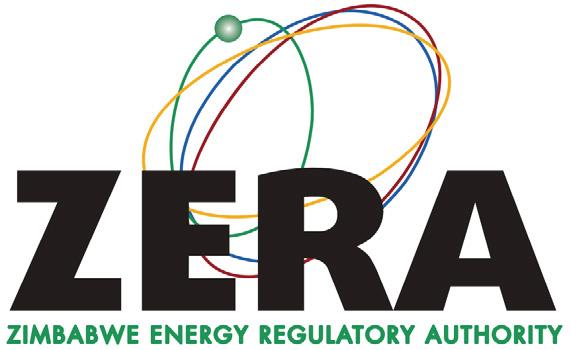

The Research Council of Zimbabwe (RCZ) and the Zimbabwe Energy Regulatory Authority (ZERA) have demonstrated a strong commitment to fostering a sustainable energy future for Zimbabwe through strategic collaboration. In 2018, this partnership culminated in a joint call for research proposals focused on three critical areas: renewable energy integration, electricity reliability, and energy efficiency.
This collaborative effort leveraged the distinct strengths of both organizations – the RCZ's focus on research and development and ZERA's regulatory oversight of the energy sector – to address pressing challenges facing Zimbabwe's energy landscape. The combination of their expertise and resources, enabled the two organisations to generate actionable insights, cultivate local expertise, and ultimately drive the development and implementation of practical solutions.
This joint initiative emphasized the need for research that not only explored the technical aspects of integrating renewable energy sources into existing power systems but also addressed the broader issues of improving reliability across the entire electricity value chain, from generation to supply. Furthermore, the call for proposals highlighted the importance of investigating and enhancing energy
efficiency capacity within Zimbabwe, recognizing that reducing energy consumption is a crucial component of a sustainable energy strategy. The collaboration between the RCZ and ZERA ensured that the research would be aligned with both national research priorities and the practical needs of the energy sector.
The research program's overarching objectives were to generate knowledge that translates into practical and realistic solutions, with a focus on domestic and industrial implementation and potential for commercialization. Specifically, the research aimed to advance renewable energy integration, enhance electricity reliability nationwide, develop and provide technologies for improving and measuring energy efficiency, and support human resources development in the energy sector for long-term sustainability. These objectives were carefully aligned with key national development priorities, including the Zimbabwe Agenda for Sustainable Socio-Economic Transformation, the National Energy Policy, The Ten Point Plan, and the National Research Priorities.
The call for proposals outlined specific thematic areas, including renewable energy integration, electricity reliability, and the development and promotion of energy efficiency measures. These areas represent critical challenges and opportunities

for Zimbabwe's energy sector, and the collaboration between the RCZ and ZERA ensured that the research would be directly relevant to these pressing issues.
Funding for the research projects was provided on a competitive basis, open to Zimbabwean researchers at local academic institutions, research institutions, government research departments, and, importantly, researchers from the private sector and non-profit organizations affiliated with approved Zimbabwean public institutes. This inclusive approach, facilitated by the combined influence of the RCZ and ZERA, aimed to leverage the broadest range of expertise and foster collaboration among diverse stakeholders.
Each research proposal was required to include at least one Zimbabwean student pursuing a Master's or Doctoral degree in a renewable energy-related field, underscoring the commitment to developing the next generation of energy professionals. The call for proposals also specifically encouraged applications from female researchers, reflecting the importance of gender balance and inclusivity in the energy research field. This joint initiative by the RCZ and ZERA demonstrates the power of collaboration in addressing Zimbabwe's energy challenges and building a more sustainable energy future.

The Zimbabwe Energy Regulatory Authority (ZERA) is proudly hosting the Regional Energy Regulators Association of Southern Africa (RERA) Regional Information Sharing Seminar this week in Harare. This pivotal event has convened key regional stakeholders, marking a significant collaborative effort to fortify the energy landscape across the Southern African Development Community (SADC) region.
The seminar serves as a crucial platform for energy regulators, policymakers, and experts from across SADC member states to engage in vital discussions and exchange invaluable insights. Central to the agenda are critical topics including the intricacies of regulatory performance, the development and enhancement of robust energy data systems, and strategies for advancing sustainable energy solutions throughout the region.
ZERA’s role as host underscores Zimbabwe’s commitment to regional energy integration and fostering best practices in regulatory oversight. By facilitating these discussions, ZERA and RERA aim to harmonize regulatory frameworks, promote transparency, and ensure the efficient functioning of energy markets across SADC. Improved regulatory performance is essential for attracting investment, while comprehensive energy data systems provide the foundation for informed policy decisions and effective resource allocation.
Furthermore, the focus on advancing sustainable energy highlights the region’s collective push towards cleaner, more reliable power sources. This includes exploring renewable energy integration, energy efficiency measures, and innovative technologies that can mitigate climate change impacts while ensuring energy access for all.
The seminar is expected to yield actionable recommendations and strengthen networks among regional energy authorities. The collaborative spirit fostered at this gathering is vital for addressing shared challenges and collectively steering the SADC region towards a more secure, sustainable, and prosperous energy future.

SACREEE: SADC'S BOLD STEP TOWARDS A SUSTAINABLE ENERGY FUTURE
Southern African Development Community (SADC) member states are forging a collaborative path towards a sustainable energy future with the establishment of the SADC Centre for Renewable Energy and Energy Efficiency (SACREEE). Eng. B. Munyaradzi from the Ministry of Energy and Power Development recently elaborated on the significance of the Memorandum of Agreement (MoA) underpinning this crucial regional initiative.
Speaking to stakeholders, Eng. Munyaradzi emphasized that SACREEE represents a pivotal step in addressing the pressing energy challenges facing the SADC region. The centre's primary objective is to significantly boost access to modern energy services for millions of citizens across the member states. This will be achieved through a concerted effort to promote the widespread adoption of renewable energy technologies and the implementation of energy-efficient practices.
The MoA signifies a unified commitment from
SADC nations to leverage their collective resources and expertise in the pursuit of a cleaner and more secure energy landscape. SACREEE will serve as a central hub for knowledge sharing, capacity building, and the facilitation of regional projects in the renewable energy and energy efficiency sectors. This collaborative approach is expected to accelerate the deployment of solar, wind, hydro, and other renewable energy sources, thereby diversifying the region's energy mix and reducing reliance on traditional fossil fuels.
Furthermore, Eng. Munyaradzi highlighted the centre's focus on market-based approaches. SACREEE will actively work to create an enabling environment for private sector investment in renewable energy and energy efficiency projects. This includes supporting the development of favourable regulatory frameworks, promoting innovative financing mechanisms, and fostering entrepreneurship in the clean energy sector. By engaging the market, SACREEE aims to ensure the long-term sustainability and scalability of renewable energy solutions across the SADC region.
The establishment of SACREEE is particularly timely as the region grapples with the impacts of climate change and the growing demand for energy to fuel economic development. By enhancing energy security through diversified and cleaner energy sources, SADC member states aim to build more resilient economies and improve the livelihoods of their populations. The centre is envisioned as a catalyst for innovation, driving the adoption of cutting-edge technologies and fostering regional cooperation in research and development.
Eng. Munyaradzi reiterated the Ministry's strong support for SACREEE and its potential to transform the energy sector within the SADC region. He called for continued collaboration among member states, the private sector, and development partners to ensure the successful operationalization and long-term impact of the centre. The establishment of SACREEE marks a significant milestone in SADC's journey towards a sustainable and prosperous future powered by clean and efficient energy.
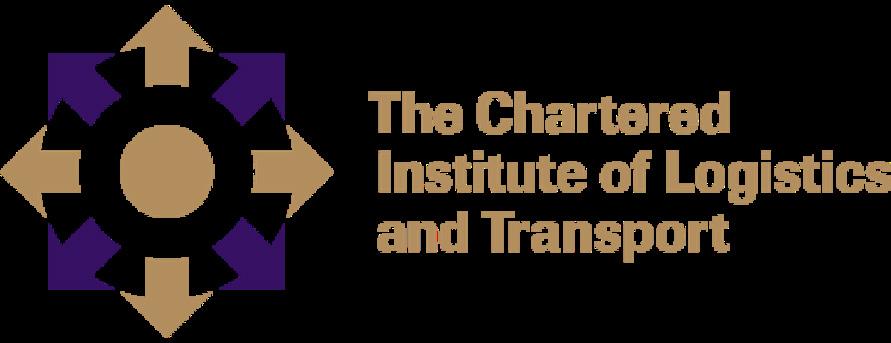

The Chartered Institute of Logistics and Transport (CILT) is a leading international professional body dedicated to advancing the art and science of logistics and transport.
With a global presence in over 30 countries, CILT plays a crucial role in setting standards, providing education, and fostering professional development within the industry. In Zimbabwe, CILT is instrumental in shaping a competent and ethical logistics and transport workforce, ultimately contributing to the nation's economic growth and efficiency.
CILT offers a range of internationally recognized qualifications and membership grades, providing a clear pathway for individuals to progress in their careers. It allows professionals to adhere to CILT's standards, to gain enhanced knowledge, skills, and ethical grounding, making them valuable assets to organizations operating in Zimbabwe's dynamic logistics and transport landscape. Membership also provides access to a global network of professionals, industry best practices, and continuous professional development opportunities, ensuring that Zimbabwean practitioners remain at the forefront of the field.
For businesses, employing CILT-certified professionals signifies a commitment to quality, efficiency, and international best practices, enhancing their competitiveness and credibility. Several esteemed institutions in Zimbabwe are accredited by CILT to deliver its internationally recognized qualifications. These institutions play a vital role in nurturing talent and equipping individuals with the necessary skills to excel in the logistics and transport sector:
KMI Logistics Zimbabwe: Founded in 2016, KMI Logistics has rapidly established itself as a comprehensive training and transport logistics company operating across Zimbabwe. Accredited
by CILT, KMI Logistics offers tailored training solutions designed to maximize individual and organizational potential in the logistics and transport fields. Their commitment to quality service, environmental responsibility, and a safe working environment makes them a preferred choice for individuals seeking professional development.
River Jordan College: River Jordan College (RJC) is a fully registered training and development college in Harare, renowned for its high pass rates and expert tutorship in logistics and transport courses offered through CILT.
With a central location and flexible learning methods, including face-to-face, blended, block release, and online options, RJC provides accessible and quality education. Their reputation for a friendly environment and value-added learning makes them a strong contender for prospective logistics and transport students.
Speciss College: As the largest private education institution in Zimbabwe, operating since 1958, Speciss College offers a diverse range of education and training courses across four campuses. Accredited by numerous international examination bodies, including CILT, Speciss College has a long-standing reputation for providing quality education and training. Their comprehensive approach, experienced professionals, and focus on meeting industry needs make them a significant contributor to logistics and transport education in Zimbabwe.
Trust Academy: Established in 1994, Trust Academy has a mandate to work closely with industry and commerce to identify skills gaps and develop relevant training programs. Accredited by CILT, Trust Academy offers courses designed to enhance productivity and individual development. Their strong relationships with local universities and a focus on practical skills
make them a valuable partner in developing a skilled logistics and transport workforce in Zimbabwe.
Choosing a CILT-accredited institution offers significant advantages over unaccredited providers. Accredited institutions undergo a rigorous evaluation process by CILT to ensure their curriculum, teaching standards, and assessment methods meet international benchmarks. This guarantees that students receive high-quality education that is relevant to the demands of the global logistics and transport industry.
Qualifications obtained from accredited institutions are internationally recognized and respected by employers worldwide, enhancing graduates' career prospects and mobility. Furthermore, accredited institutions often have strong links with industry, providing students with valuable networking opportunities and insights into real-world practices. In contrast, unaccredited institutions may not adhere to the same quality standards, potentially leading to qualifications that are not widely recognized or valued by employers. The curriculum might be outdated or irrelevant, and the teaching quality may vary significantly. Choosing an unaccredited institution can limit career opportunities and may not provide the necessary skills and knowledge to succeed in the competitive logistics and transport sector.
In conclusion, the Chartered Institute of Logistics and Transport plays a vital role in elevating the standards and professionalism of Zimbabwe's logistics and transport sector. Its accredited training providers, KMI Logistics Zimbabwe, River Jordan College, Speciss College, and Trust Academy, are instrumental in equipping individuals with globally recognized qualifications and skills. For prospective students, choosing a CILT-accredited institution is a strategic investment in their future, ensuring they receive quality education and enhanced career prospects in this crucial industry.

The push for a green energy revolution in Zimbabwe necessitates a profound shift in how the nation approaches its energy future, and central to this transformation is the establishment of robust social contracts.
Zimbabwe, like many developing nations, faces the dual challenge of meeting its growing energy demands while mitigating the impacts of climate change. The transition to renewable energy sources, such as solar and wind power, holds immense potential, but its successful implementation hinges on widespread public support and participation.
A critical aspect of this transition involves addressing the existing inequalities in energy access. Currently, a significant portion of Zimbabwe's population, particularly in rural areas, relies on unsustainable energy sources like firewood, contributing to deforestation and health issues.
A well-defined social contract must prioritize equitable access to clean energy, ensuring that the benefits of the green revolution reach all segments of society. This involves not only investing in renewable energy infrastructure but also developing policies that make these technologies affordable and accessible to lowincome households.
Furthermore, fostering a sense of ownership and shared responsibility among communities is essential. This can be achieved through participatory decision-making processes that involve local stakeholders in the planning and implementation of renewable energy projects. Incorporating traditional knowledge and practices, and respecting local values, projects can be tailored to meet the specific needs and aspirations of each community.
The role of the government is also paramount. Creating a stable and transparent regulatory framework that incentivizes private sector investment in renewable energy is crucial. Additionally, the government must play a leading role in educating the public about the benefits of green energy and promoting sustainable energy practices. This involves not
only disseminating information but also fostering a culture of environmental stewardship.
In essence, the green energy revolution in Zimbabwe requires a collaborative effort involving the government, private sector, civil society, and communities. When strong social contracts are forged, based on principles of equity, participation, and shared responsibility, Zimbabwe can pave the way for a sustainable and prosperous energy future.


Delegates at the 64th Southern African Power Pool (SAPP) Management Committee Meetings, held in Victoria Falls recently, reaffirmed their commitment to bolstering regional energy security, fostering collaboration, and driving innovation amidst a pressing power crisis.
The summit, attended by 14 power utilities and Independent Power Producers (IPPs) from the SADC region, highlighted a unified approach to addressing the region's energy challenges.
Minister of Energy & Power Development, Honourable July Moyo, opened the meeting by celebrating the successful SAPP grid interconnection, while also urging member utilities and IPPs to assess its adequacy in meeting the region's growing energy demands.
ZESA Holdings Executive Chairman, Dr. S.Z. Gata, in his welcome address, emphasized SAPP's significant strides in
strengthening regional energy security, enhancing trading opportunities, and fostering vital technical collaboration.
The meeting took place against a backdrop of severe energy strain across Southern Africa, with demand significantly outpacing supply. Minister Moyo underscored the urgency of the situation, citing a power generation shortfall of nearly 4,000 megawatts (MW), aging infrastructure, and the escalating threat of climate change.
Despite these daunting challenges, Minister Moyo expressed confidence that solutions were within reach through decisive regional action. He praised SAPP's role in mitigating power shortages through cross-border electricity trading, but urged further action to address the root causes of the crisis.
To this end, SAPP is developing a Regional Transmission Infrastructure Financing Facility, aimed at unlocking transmission bottlenecks through blended financing and private-sector investment. This initiative seeks to facilitate the
development of critical infrastructure necessary to ensure reliable and efficient power delivery across the region.
Furthermore, the meeting addressed the rising threat of vandalism to power infrastructure, a significant challenge to energy security. Minister Moyo assured stakeholders that SADC energy ministers are prioritizing strategies to curb this growing menace at both national and regional levels.
Delegates reiterated SAPP's commitment to transforming the region through enhanced grid stability, power trading, and knowledge exchange. They emphasized the importance of optimizing resources and unlocking new opportunities for a sustainable energy future through collaborative efforts.
Minister Moyo urged power sector experts to act with urgency to implement sustainable energy solutions that will drive economic growth and regional stability.


Navigating home insurance within the dynamic energy sector presents unique challenges and requires a deeper understanding than traditional policies offer. For those working in, or living near, energy-related facilities, or even those adopting advanced home energy solutions, standard coverage often falls short. Many believe their existing policies adequately address potential risks, a misconception that can lead to significant financial vulnerabilities. For instance, the increased use of solar panels or home battery storage systems may not be fully covered under a typical homeowner’s policy.
Understanding the specific clauses related to these installations is crucial. Are the panels insured against hail damage, and is the battery system covered for electrical surges or fires?
Hidden clauses, often buried in policy fine print, can further complicate matters. These might include limitations on coverage for damages caused by seismic activity or industrial accidents, both relevant to areas with energy infrastructure. It's essential to scrutinize these clauses, particularly if your property is located near a power plant, pipeline, or renewable energy farm.
Maximizing coverage in this context involves more than simply increasing policy limits. It requires a tailored approach, starting with a comprehensive risk assessment. Evaluate the potential hazards specific to your location and occupation. If you work in the energy sector, consider the risks associated with your work environment, such as exposure to hazardous materials or potential liability from equipment malfunctions. This assessment should inform your insurance needs.
For example, if you live near a fracking site, you might need specialized coverage for potential water contamination. Similarly, those with home wind turbines should ensure their policy covers damage from high winds or component failures. It's also vital to understand the difference between replacement cost and actual cash value.
Replacement cost policies will pay to rebuild or replace your home and belongings at current market prices, while actual cash value policies will only pay the depreciated value. This distinction is particularly important for homes with specialized energy installations, as the cost of replacing these systems can be substantial.
Furthermore, consider adding endorsements or riders to your policy to address specific risks. For instance, an endorsement for equipment breakdown coverage can protect your home's energy systems from mechanical or electrical failures. Regularly reviewing your policy with an insurance professional is also essential.
The energy sector is constantly evolving, and new risks emerge as technology advances. Ensure your coverage remains current and comprehensive. Ask detailed questions about exclusions, coverage limits, and claims processes. Documenting your home’s energy systems and their maintenance is critical. Keeping records of installation dates, maintenance schedules, and warranties can streamline the claims process and ensure you receive adequate compensation.
Finally, don't hesitate to shop around for the best policy. Different insurers offer varying levels of coverage and specialized endorsements for the energy sector. By understanding the nuances of your home insurance and taking proactive steps to maximize coverage, you can protect your investment and mitigate potential financial losses.

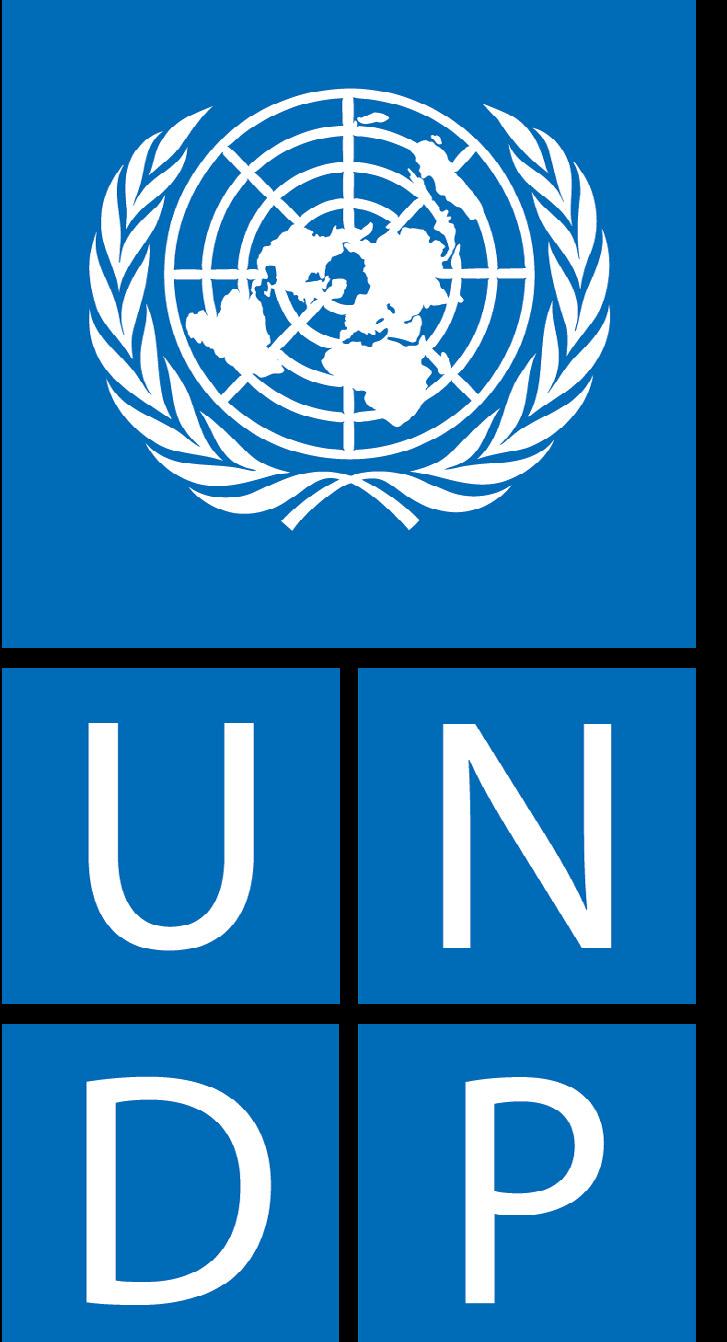
UNDP’S ENERGY OFFER IN ZIMBABWE
The United Nations Development Programme (UNDP) is engaged in ongoing energy projects in Zimbabwe, one of which is a significant energy initiative focused on accelerating access to sustainable and affordable energy.
This project, underpinned by an initial investment of US$1.5 million, aims to drive a comprehensive energy transition strategy, aligning with the Country Programme Document's climate and energy policy support goals.
The program emphasizes institutional and systems strengthening, alongside innovative financing mechanisms to foster a green economy.

A substantial portion of the initial investment will be allocated as Viability Gap Funding (VGF) to pilot model projects, thereby catalysing their bankability and attracting private investment.
Leveraging UNDP TRAC 2 resources, the initiative seeks to establish a sustainable intervention model, further fuelled by blended finance unlocked through feasibility studies, project pipeline development, private sector partnerships, Green Climate Fund (GCF) investments, and potentially Foreign Direct Investments.
The initial TRAC funding is strategically designed to catalyse millions of dollars in additional investment within the next two to three years. Key achievements thus far include the high-level project launch, the identification of actionable opportunities to rapidly close the energy access gap by 2025, and the embedding of a Renewable Energy Project Coordinator within the Ministry of Energy and Power Development.
Business development training has been conducted for community mini-grids, and technical assistance has been provided for the productive uses of
energy for key national partners and community beneficiaries. Furthermore, a renewable energy investment conference was held in Harare, and up to 50% subsidies as VGF have been committed for feasibility studies and project pipeline development for five community solar mini-grids and three pilot models.
This initiative directly contributes to several Sustainable Development Goals (SDGs), including no poverty, good health and well-being, zero hunger, and quality education, demonstrating a holistic approach to sustainable development in Zimbabwe.

The energy transition, characterized by the shift away from fossil fuels towards cleaner, renewable energy sources, is rapidly reshaping the global energy landscape. This shift presents both challenges and unprecedented opportunities, particularly in terms of workforce development.
As the demand for renewable energy technologies like solar and wind power surges, the need for a skilled workforce to install, maintain, and operate these systems becomes paramount. This necessitates a significant upskilling and reskilling effort across the energy sector.
Workers in traditional energy industries, such as coal mining and oil and gas extraction, will require new skills in areas like:
• Renewable energy technologies: This includes training in the installation, maintenance, and repair of solar panels, wind turbines, and energy storage systems such as batteries.
• Smart grid technologies: The integration
of renewable energy sources necessitates a modernized grid. This requires workers with expertise in data analytics, cybersecurity, and grid modernization technologies to ensure reliable and efficient energy delivery.
• Emerging technologies: The energy sector is constantly evolving with advancements in hydrogen fuel cells, geothermal energy, and other innovative solutions. Workers will need to adapt and acquire new skills to work with these emerging technologies.
Addressing this workforce transition requires a collaborative effort between industry, academia, and government. Industry players must invest in training programs and apprenticeships to equip their workforce with the necessary skills.
Academic institutions need to develop and offer relevant degree programs and training courses to meet the evolving demands of the energy sector. Government support is crucial through initiatives such as funding for training programs,
tax incentives for businesses investing in workforce development, and policies that promote the growth of the renewable energy sector.
The energy transition also presents significant potential for job creation and economic growth.
The renewable energy sector is a rapidly expanding industry, creating numerous job opportunities in areas such as manufacturing, installation, maintenance, research, and development. By investing in workforce development and fostering a skilled workforce, countries can capitalize on this growth and reap the economic benefits of the energy transition.
The energy transition demands a significant shift in the skills and expertise of the energy workforce.
Proactively addressing this need through upskilling, reskilling, and collaborative efforts between industry, academia, and government, smooth and successful transition to a cleaner, more sustainable energy future can be ensured.
Zimbabwe's energy sector relies heavily on a range of machinery for power generation, transmission, and distribution. In thermal power plants, which are crucial for the country's electricity supply, massive excavators and bulldozers are used for coal mining.
Cranes and conveyors facilitate the handling and transportation of coal within the plant. Boilers, turbines, and generators, often massive in size, are essential for converting the energy from coal into electricity. These require specialized lifting and installation equipment.
For hydropower generation, which also plays a significant role in Zimbabwe's energy mix, excavators and drilling machines are used for dam construction and maintenance. Large cranes and lifting equipment are necessary for installing and maintaining turbines and generators within the power station.
Transmission and distribution of electricity require a different set of heavy machinery. Tower cranes and lifting equipment are used for constructing transmission towers, while specialized vehicles and equipment are needed for stringing power lines. The development of renewable energy sources, such as solar power, is gaining traction in Zimbabwe.
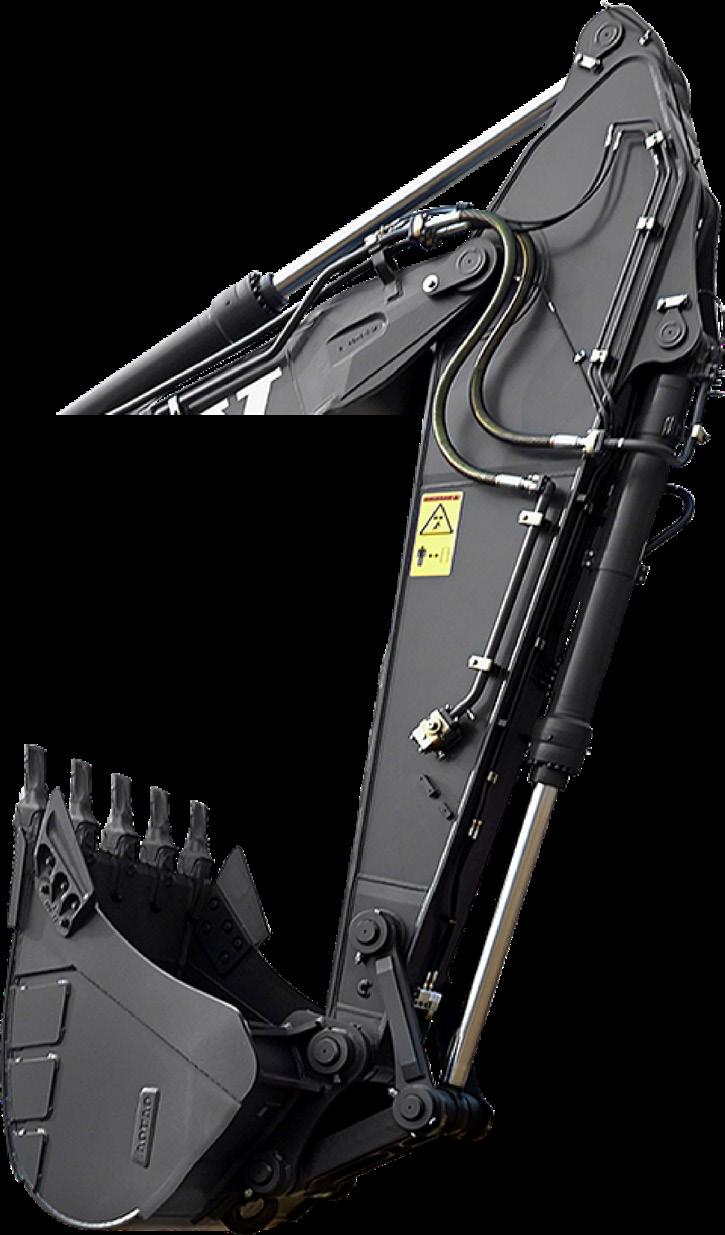

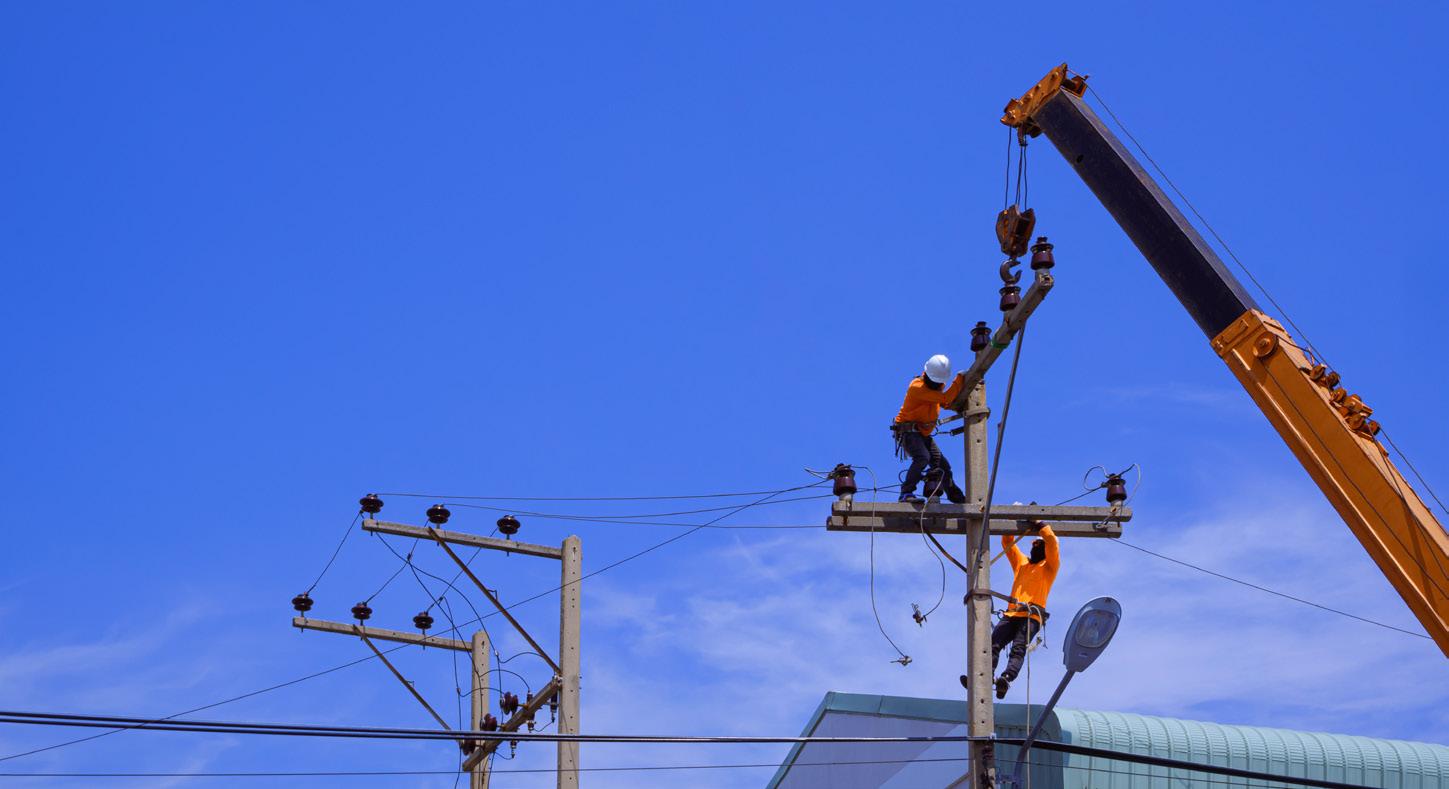


This sector also utilizes heavy machinery, including excavators and bulldozers for site preparation, and cranes for installing solar panels and related infrastructure.
The energy sector in Zimbabwe is constantly evolving, with ongoing investments in new technologies and infrastructure. This necessitates the use of a wide range of heavy machinery for construction, maintenance, and operation, ensuring a reliable and sustainable energy supply for the country.

Zimbabwe's mining sector plays a crucial role in the nation's economy, driving growth and generating valuable export revenue. However, this vital industry is also a significant consumer of energy, relying on powerintensive processes that pose both economic and environmental challenges.
Ensuring a reliable and cost-effective energy supply is paramount for the continued success of mining operations, but equally important is the need to minimize the industry's environmental footprint. This article explores the energy challenges confronting Zimbabwe's mining sector and examines how renewable energy solutions and energy efficiency measures can contribute to a more sustainable future.
The mining industry's reliance on traditional energy sources, often fossil fuels, creates a complex dilemma. Fluctuations in fuel prices and unreliable power grids can disrupt operations, impacting productivity and profitability. Furthermore, the environmental consequences of burning fossil fuels, including greenhouse gas emissions and air pollution, are increasingly concerning. Zimbabwe's mining sector must therefore explore alternative energy pathways that offer both economic stability and environmental responsibility.
Renewable energy sources, such as solar and wind power, present a compelling solution.

Zimbabwe possesses abundant solar resources, making photovoltaic technology a particularly attractive option for powering mining operations. Solar power can be deployed at various scales, from large-scale solar farms supplying entire mines to smaller, decentralized systems powering specific processes or equipment. Similarly, wind energy, where geographically feasible, can contribute to a diversified renewable energy mix. Integrating these renewable energy solutions into mining operations can significantly reduce reliance on fossil fuels, mitigating both price volatility risks and environmental impacts.
Beyond embracing renewable energy, improving energy efficiency within the mining sector is crucial. Implementing energy-efficient technologies and optimizing operational processes can significantly reduce energy consumption. This includes upgrading equipment, improving ventilation systems, and implementing smart energy management systems that monitor and control energy usage in real time. Such measures not only lower operating costs but also contribute to a smaller carbon footprint.
The environmental impact of mining extends beyond energy consumption. Mining activities can lead to land degradation, water pollution, and
habitat destruction.
Adopting sustainable mining practices, including responsible waste management, water conservation, and ecosystem restoration, is essential for minimizing these negative impacts. Integrating environmental considerations into all stages of the mining lifecycle, from exploration to closure, is crucial for ensuring long-term sustainability.
Striking a balance between economic growth and environmental responsibility is a key challenge for Zimbabwe's mining sector. While mining is essential for economic development, it must be conducted in a manner that protects the environment and safeguards the well-being of local communities. This requires a holistic approach that integrates sustainable energy solutions, energy efficiency measures, and responsible mining practices. Government policies, industry initiatives, and community engagement all play a vital role in creating a framework for sustainable mining in Zimbabwe. By embracing innovation and prioritizing environmental stewardship, Zimbabwe's mining sector can contribute to both economic prosperity and a healthy planet.
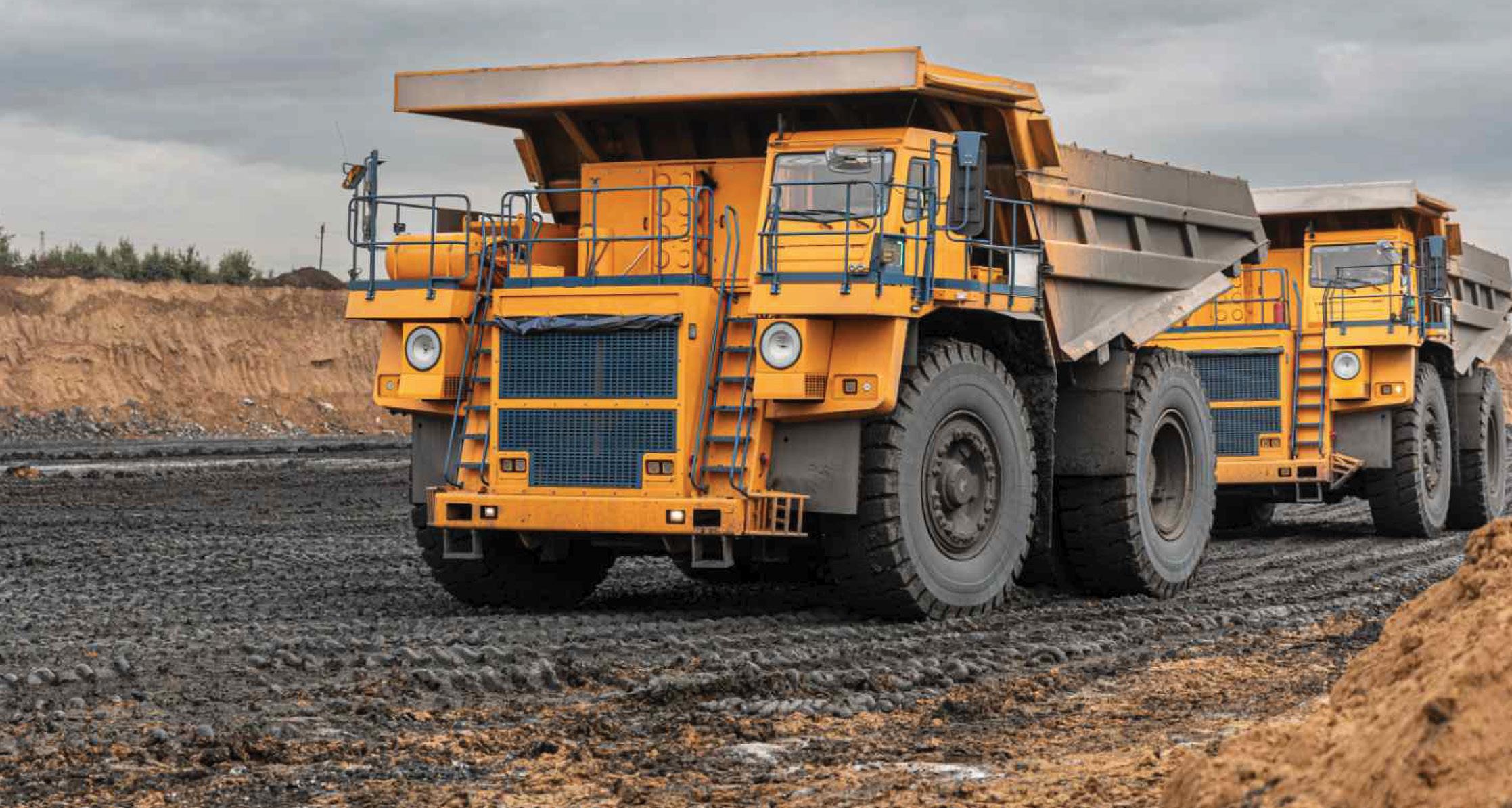

Premier African Minerals Limited has made significant strides in advancing its flagship Zulu Lithium and Tantalum Project in Insiza, Matabeleland South, by securing fresh funding and settling contractor invoices through an equity issuance. This strategic move aims to bolster output and optimize plant performance at the crucial mining operation.
In an interim funding announcement, the company revealed a successful share subscription, raising £1.575 million (before expenses). The new ordinary shares were issued at a price of 0.012 pence per share. In a related development, Premier African Minerals settled US$1.1 million (equivalent to £0.740 million) worth of contractor invoices for the Zulu project. This was achieved by issuing 6,174,166,667 new ordinary shares at the same issue price, demonstrating a commitment to leveraging equity for operational efficiency.
This transaction is a critical component of Premier’s broader operational and capital strategy. The primary focus remains on the completion and optimization of the existing flotation plant, while also preparing a secondary plant as a strategic
contingency. The capital raise is earmarked for three key objectives: firstly, to finalize the installation and commissioning of inserts designed to increase concentrate retention time in the cleaner section of the primary flotation plant, with the ultimate goal of improving both grade and recovery.
Secondly, the funds will accelerate the construction of an alternative spodumene float plant, providing a crucial fallback option should the main plant experience any underperformance. Lastly, a portion of the funds will be allocated to cover select operating costs and settle outstanding debts.
Earlier this year, the company had indicated a requirement of approximately US$1.6 million for various operational activities, including a US$250,000 partial payment to the Government for deferred Value Added Tax and other statutory obligations. To address these needs, Premier had previously sought to raise £2.3 million (equivalent to US$2.8 million) through a retail offer and an additional £1.2 million (equivalent to US$1.46 million) through a placement of ordinary shares. Progress at the Zulu project remains on track,
both in terms of budget and timeline. The work associated with the current enhancements, including the inserts and the secondary flotation circuit, aligns precisely with proposals made in the third quarter of 2024. Extensive months of test work have been completed, all indicating that the planned recovery and grade targets should be successfully achieved.
Beyond the primary objectives, Premier has also been actively exploring additional value streams at the Zulu site since late 2024. These investigations include assessing ore sorting alternatives, evaluating the feasibility of high-purity quartz extraction, and optimizing the recovery of tantalite, the principal tantalum-bearing mineral found within the project.
The company recognizes that pegmatites, such as those being mined at Zulu, are a rich source of diverse industrial minerals beyond just spodumene. These additional products are expected to make a significant contribution to the overall life-of-mine profitability of the Zulu project in due course.

The Africa Carbon Forum (ACF) serves as a vital platform for project developers, policymakers, and stakeholders across the continent to engage with the latest investment, finance, and development opportunities related to climate change. This comprehensive program addresses the critical challenges and opportunities presented by the evolving global climate landscape, particularly in the post-Paris Agreement era.
The ACF offers a unique opportunity to explore Africa's role in a world increasingly focused on climate action. Participants will delve into Nationally Determined Contributions (NDCs), examining policy options and identifying pathways for transformational development within the region. The forum showcases innovative projects and programs, highlighting investment opportunities that promote climate-resilient development. A key focus is on access to climate finance, exploring various sources, including market-based approaches, and equipping attendees with the knowledge to secure funding for sustainable development initiatives. The ACF also examines results-based financing mechanisms, emphasizing the importance of rewarding tangible climate action. Furthermore, it facilitates collaboration through cooperative initiatives under
the Nairobi Framework Partnership.
The ACF is designed for a broad audience, including Climate Change Focal Points, project developers, policymakers, representatives from financial institutions, Designated National Authorities (DNAs), private sector representatives, NGOs, multilateral agencies, media professionals, and anyone with a vested interest in the latest developments in climate change investment, finance, and development.
The impetus for the ACF stems from the Nairobi Framework, launched by the UN Secretary General in 2006. Initially aimed at boosting African participation in the Clean Development Mechanism (CDM), the framework has evolved alongside the global climate agenda. The landmark Paris Agreement, with its emphasis on scaled-up climate action, has ushered in a new era. This era presents both challenges and exciting opportunities for Africa, driven by ambitious national action and strengthened international cooperation in finance, market-driven approaches, technology transfer, and capacity-building.
The Nairobi Framework, and by extension the ACF, seeks to maximize support for developing
countries in implementing their NDCs. This involves creating enabling environments at the national level, fostering robust regulatory mechanisms, and promoting carbon markets, including the CDM. The ACF provides a crucial platform for African stakeholders to discuss the latest developments in climate policy, carbon markets, and finance. It facilitates the sharing of knowledge on innovative solutions within the context of NDCs and other strategies, fostering collaboration on regional and global climate initiatives.
The ACF is part of Africa Climate Week, organized by the Nairobi Framework partners, a consortium of partners including the United Nations Framework Convention on Climate Change (UNFCCC), the United Nations Environment Programme (UNEP) in conjunction with the UNEP DTU Partnership (UDP), the International Emissions Trading Association (IETA), the World Bank Group (WBG), and the Africa Development Bank (AfDB). This collaborative effort underscores the commitment to supporting Africa's transition to a low-carbon, climate-resilient future.
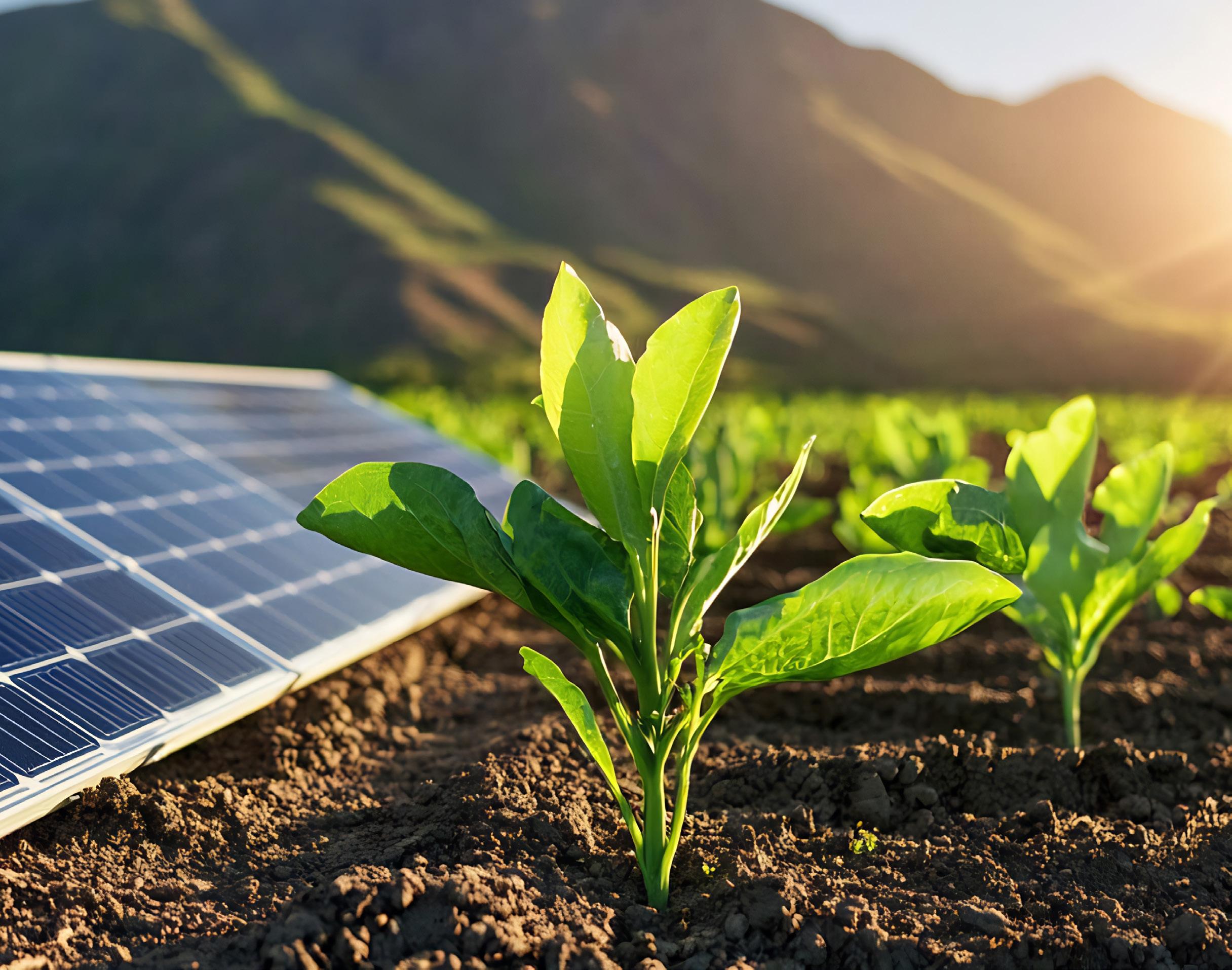
The agricultural industry, often viewed solely as a producer of food and fibre, presents a significant and often overlooked opportunity as a valuable market for the energy industry. This symbiotic relationship has the potential to not only boost agricultural productivity but also drive innovation and growth in the energy sector. By recognizing and nurturing this connection, both industries can reap substantial benefits, contributing to economic development and sustainability.
Agriculture's energy needs are diverse and substantial, ranging from powering irrigation systems and processing facilities to heating greenhouses and operating farm machinery. Traditional energy sources, like fossil fuels, can be costly and environmentally damaging, creating a compelling case for alternative solutions. This demand creates a robust market for energy providers, particularly those specializing in renewable energy technologies.
Renewable energy sources offer a particularly attractive solution for the agricultural sector. Solar power, for instance, can be harnessed to pump water for irrigation, power farm buildings, and even run processing equipment. Wind energy can provide a clean and cost-effective source of
electricity for farms located in suitable areas. Biogas digesters, utilizing agricultural waste and manure, can generate both energy and valuable fertilizer, creating a closed-loop system that benefits both the farm and the environment. These renewable energy applications not only reduce reliance on fossil fuels but also offer farmers greater energy independence and cost savings in the long run.
The agricultural sector also offers unique opportunities for energy innovation. Smart farming technologies, such as precision agriculture and automated irrigation systems, rely on reliable energy access. This demand drives the development of innovative energy solutions, including microgrids, energy storage systems, and smart energy management platforms. These technologies, initially developed for agricultural applications, can often be adapted for use in other sectors, creating a ripple effect of innovation and economic growth.
Furthermore, the agricultural industry can play a significant role in energy production. Biomass, including crop residues and animal waste, can be used as a feedstock for bioenergy production. This not only provides a renewable energy source but also addresses waste management challenges
in the agricultural sector. By integrating energy production with agricultural operations, farmers can diversify their income streams and contribute to a more sustainable energy system.
The potential for synergy between the agricultural and energy industries extends beyond technology and infrastructure. Collaboration between farmers, energy providers, researchers, and policymakers is crucial for creating a supportive ecosystem for innovation and investment. Government incentives, research funding, and knowledge sharing platforms can facilitate the adoption of renewable energy technologies and promote sustainable agricultural practices.
Recognizing the agricultural industry as a valuable energy market is not just about addressing the sector's energy needs. It's about fostering a mutually beneficial relationship that drives innovation, enhances sustainability, and contributes to economic growth. By embracing this opportunity, both the agricultural and energy industries can thrive, creating a more resilient and prosperous future.
The last mile of delivery, the crucial final step in getting goods to the consumer's doorstep, has long been a complex and costly challenge for businesses. However, a wave of technological innovation is transforming this landscape, promising to revolutionize how packages reach their destinations. Artificial intelligence, route optimization software, drones, and autonomous vehicles are no longer futuristic concepts but increasingly practical tools reshaping last-mile delivery. These advancements offer the potential to significantly increase efficiency, reduce costs, and improve customer satisfaction, but also present unique challenges.
Route optimization software, powered by sophisticated algorithms, is already playing a vital role in streamlining delivery operations. These systems analyse various factors, including traffic patterns, delivery windows, and vehicle capacity, to determine the most efficient routes for delivery drivers. This not only minimizes fuel consumption and delivery times but also allows companies to handle a higher volume of deliveries with existing resources. The integration of real-time data and predictive analytics further enhances the accuracy and adaptability of these systems, enabling them to respond dynamically to unforeseen circumstances like traffic accidents or sudden changes in demand.
Artificial intelligence is driving further innovation in last-mile delivery, enabling more intelligent and personalized experiences. AI-powered chatbots can provide customers with real-time updates on their deliveries, answer questions, and resolve issues quickly. Machine learning algorithms can analyse customer data to predict delivery preferences and optimize delivery schedules accordingly. Furthermore, AI is crucial for the development of autonomous delivery solutions, such as selfdriving vehicles and delivery robots, which have the potential to drastically reduce labour costs and improve delivery efficiency in the long term.
Drone delivery, while still in its early stages, represents a particularly exciting frontier in last-mile logistics. Small, unmanned aircraft can bypass traffic congestion and deliver packages directly to customers' homes, even in remote or hard-toreach areas. While regulatory hurdles and safety concerns remain, drone delivery has shown promise in specific applications, such as delivering medical supplies or time-sensitive packages. The potential
for faster, cheaper, and more environmentally friendly delivery is driving significant investment and research in this area.
However, the technological revolution in last-mile delivery is not without its challenges. The widespread adoption of autonomous vehicles and drones requires significant investment in infrastructure, including charging stations, drone landing pads, and advanced air traffic management systems. Regulatory frameworks must evolve to address the safety and operational considerations of these new technologies. Furthermore, concerns about job displacement and the ethical implications of AI-powered decision-making must be carefully considered.
The environmental impact of last-mile delivery is another critical factor. While electric vehicles and optimized routes can help reduce emissions, the increasing volume of deliveries driven by e-commerce growth presents a sustainability challenge. Innovative solutions, such as cargo bikes and delivery robots powered by renewable energy, are needed to create a truly sustainable last-mile ecosystem.
Ultimately, the future of last-mile delivery will depend on how effectively these technological advancements are integrated and managed. Addressing the challenges related to infrastructure, regulation, and sustainability is crucial for realizing the full potential of these innovations. As technology continues to evolve, the last mile is poised to become faster, more efficient, and more customer-centric than ever before.

Access to electricity remains a significant challenge for many rural communities in Zimbabwe, hindering development and limiting opportunities. However, off-grid renewable energy solutions, such as solar home systems and mini-grids, offer a promising pathway to electrify these underserved areas and unlock their economic and social potential.
Currently, a substantial portion of Zimbabwe's rural population lacks access to grid electricity, impacting essential services like healthcare, education, and small businesses. This lack of power perpetuates a cycle of poverty and limits the potential for growth in these communities. Off-grid solutions, powered by renewable resources like solar, offer a viable and sustainable alternative, bypassing the need for expensive and often complex grid extensions.
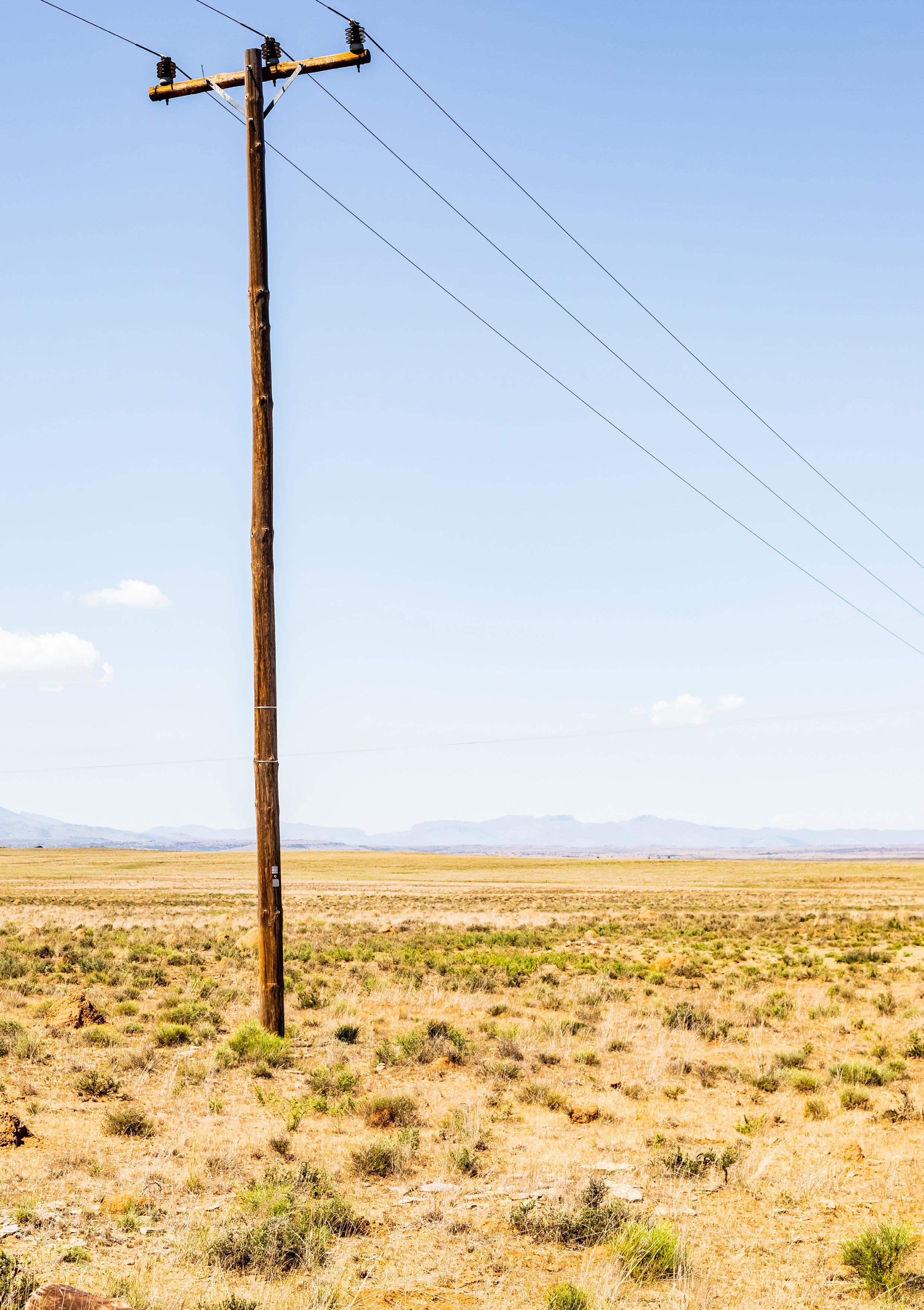
Solar home systems, consisting of solar panels, batteries, and appliances, provide individual households with a reliable source of electricity for lighting, charging phones, and powering small appliances. These systems empower families to improve their living standards, enabling children to study after dark and allowing households to engage in income-generating activities.
Mini-grids, on the other hand, serve entire communities, providing power to multiple households, businesses, and public facilities like schools and clinics. These localized grids can support more substantial energy demands, facilitating the development of small-scale industries and creating employment opportunities within rural areas.
The social and economic benefits of rural electrification are substantial. Access to electricity improves healthcare delivery by enabling the use of essential medical equipment and refrigeration for vaccines. It enhances education by providing lighting for classrooms and enabling access to digital
learning resources. Furthermore, it empowers women by reducing the time spent on collecting firewood and providing opportunities for income generation.
Several initiatives are underway in Zimbabwe to promote the adoption of off-grid renewable energy solutions. Government programs, in partnership with development organizations and private sector actors, are providing financial incentives and technical support to rural communities. These efforts are crucial for overcoming the initial cost barriers associated with these technologies and ensuring their long-term sustainability.
While challenges remain, including financing, maintenance, and community engagement, the potential of off-grid renewable energy to transform rural Zimbabwe is immense. By providing access to clean and reliable electricity, these solutions are not only improving lives but also fuelling economic development and building a more sustainable future for the nation.
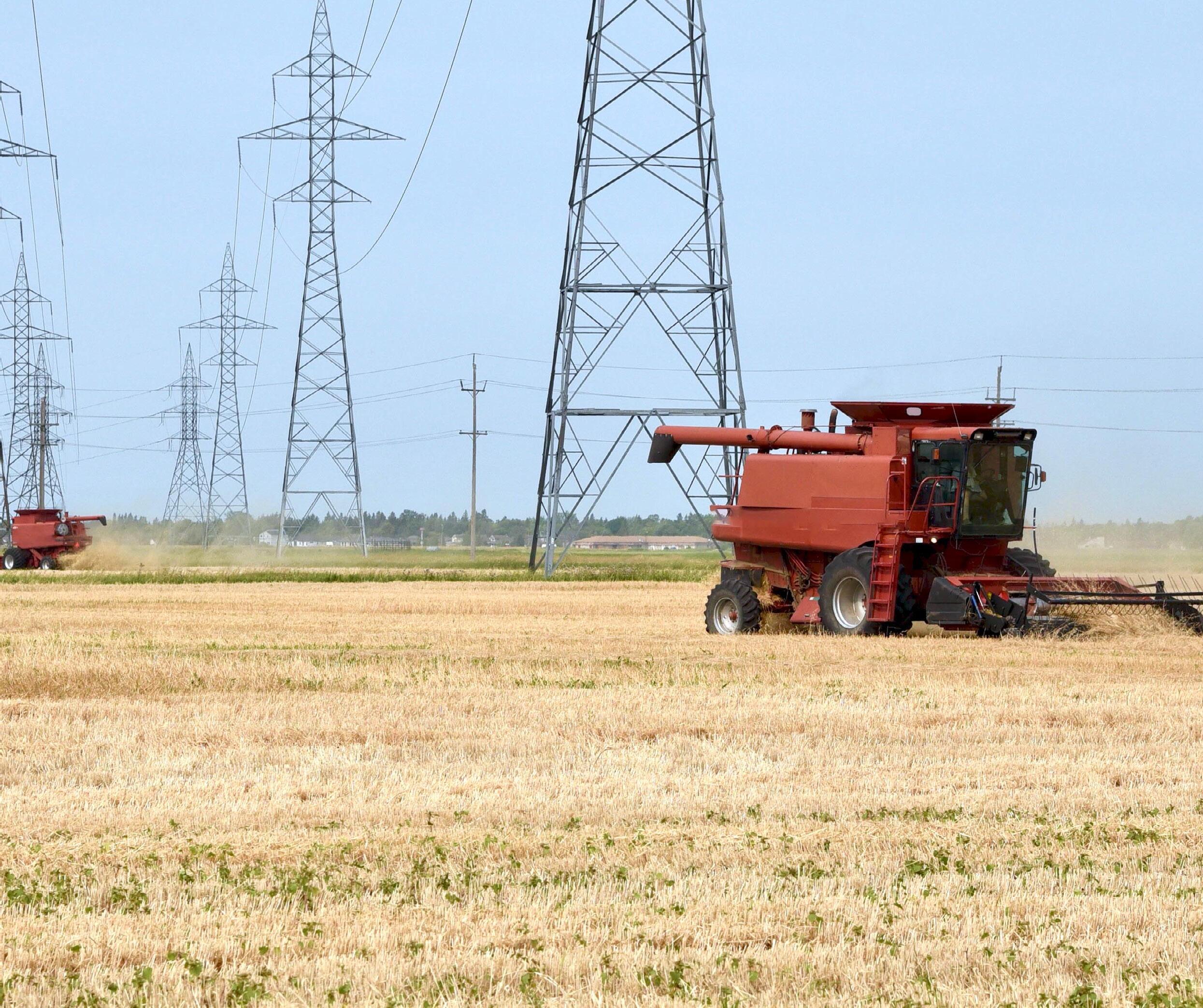
The Zimbabwe Electricity Transmission and Distribution Company (ZETDC) has taken a decisive step to bolster the nation’s agricultural sector by guaranteeing 150 megawatts (MW) of electricity specifically for winter wheat production. This crucial power ring-fencing initiative arrives at a critical juncture as farmers across the country intensify their planting and irrigation activities for the ongoing winter wheat season.
This strategic intervention by ZETDC aims to ensure energy reliability during a peak farming cycle that is heavily reliant on consistent power supply for essential irrigation systems and related mechanized operations. Recognizing electricity as a vital input for winter wheat production, ZETDC is committed to supporting the efforts of Zimbabwean farmers.
Furthermore, this initiative is bolstered by collaborative efforts from other key stakeholders. The Zimbabwe National Water Authority (ZINWA) and the Ministry of Lands, Agriculture, Fisheries, Water and Rural Development are actively working together to ensure that both electricity and water inputs are readily available to farmers throughout the entire season. This coordinated approach seeks to eliminate potential bottlenecks and provide comprehensive support to boost agricultural output.
Agricultural sector stakeholders anticipate that this proactive measure by ZETDC will directly contribute to increased winter wheat yields, thereby sustaining momentum toward achieving national food security. The dedicated power allocation is expected to provide farmers with the consistent energy needed to maximize their production, ultimately strengthening Zimbabwe’s agricultural resilience and reducing reliance on imports. This strategic move underscores the government’s commitment to supporting the vital agricultural sector through targeted energy provisions.

On June 11, Cicada Africa announced on their X platform that Cicada Solar was “proud to announce the commissioning of a 1MW solar plant at Falcon College, near Bulawayo.” This significant development represents a leap forward in sustainable energy solutions for educational institutions in the region.
The new solar facility ensures that Falcon College, which has a reputation for academic excellence and a vibrant campus life, can rely on a consistent and cost-effective power supply to support its thriving classrooms, dormitories, and sports fields. The benefits of this solar plant are multi-fold. Not only does it promote environmental sustainability by harnessing renewable energy, but it also reduces dependence on conventional electricity sources, which can be unreliable and costly.
The investment in solar power allows Falcon College to allocate more of its budget to educational
resources and student activities rather than utility expenses. As the college continues to grow, the renewable energy solution promises to play a crucial role in meeting its increasing power demands.
Cicada Solar, a subsidiary of Cicada Africa, stands at the forefront of renewable energy solutions in the region. With a commitment to sustainable development, the company specializes in designing, financing, and operating solar power plants that meet the diverse energy needs of various sectors.
According to the announcement, “Cicada Solar has also financed and will operate and maintain the solar plant, so our partnership with Falcon has just begun.” This collaboration not only ensures ongoing support and maintenance for the solar facility but also establishes a long-term commitment to sustainability at Falcon College.
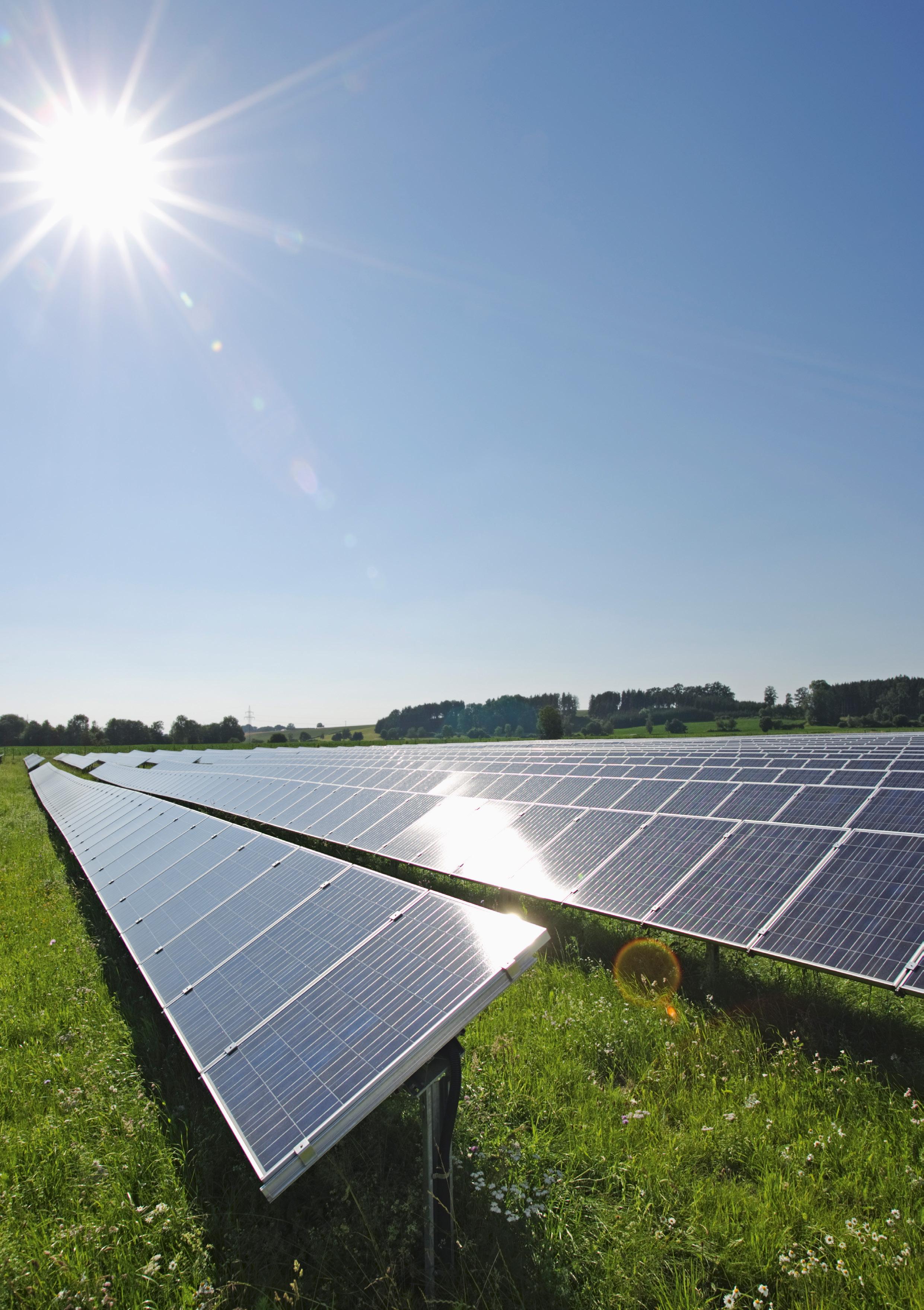
Through this initiative, Cicada Africa reinforces its role as a key player in the African renewable energy landscape, promoting eco-friendly practices while empowering educational institutions to thrive. As more organizations recognize the advantages of solar energy, the future looks bright for both Cicada Solar and its partners.


Zimbabwe’s energy sector is experiencing a significant uplift, driven by a positive investment climate and clear policy direction from the government, particularly concerning renewable energy. As the nation accelerates its energy transformation, increasing collaboration among communities, private investors, and institutional enablers is proving crucial for achieving sustainable and inclusive access to electricity and clean cooking solutions.
This surge in investor confidence coincides with the development of the National Energy Compact for the Republic of Zimbabwe, a key policy initiative spearheaded by the Ministry of Energy and Power Development.
The Compact, introduced by the Minister in London on June 4, 2025, as part of the Mission 300 (M300) initiative, aims to provide 300 million Africans with clean electricity and cooking solutions by 2030. This ambitious goal is backed by the World Bank and the African Development Bank, building upon the M300 declaration signed by African governments in Dar es Salaam earlier this year.
Stakeholders within the renewable energy sector have warmly welcomed the Compact, emphasizing the need for a business-friendly regulatory environment. Key concerns raised include the importance of clear policies for integrating mini-grid projects into the national grid and the provision of robust financial incentives. The chairperson of the Renewable Energy Association of Zimbabwe (REAZ) highlighted that foreign investment is significantly influenced by confidence in strong guarantees and supportive regulations. This includes assurances that power utilities will connect mini-grids once they are established, alongside financial incentives to attract and scale up investment. Affordability for end-users remains a critical factor in achieving universal electrification.
Nyangani Renewable Energy, one of Zimbabwe’s leading renewable energy companies, has been a consistent player since 2007, currently generating 40 megawatts of electricity through hydro and solar projects. The company has been feeding into the national grid for over 10 years, with its first project now 15 years old. The ongoing development of a new hydro project in Nyanga further reinforces its long-term commitment to Zimbabwe’s energy sector.
The role of Independent Power Producers (IPPs) is also expanding rapidly. Zimbabwe aims to address its energy access challenges through least-cost investments, supported by regulatory and financial reforms designed to attract private capital. The president of the Zimbabwe Independent Power Producers Association (ZIPPA) noted that private sector players have invested nearly US$400 million in the energy sector, primarily in solar, wind, and hydro projects. In the last decade, the contribution of IPPs has grown from almost zero to nearly 5 percent of the country’s total electricity, with a goal to reach 30 percent by 2030.
Supporting these investments is ZimGreenCo, an energy intermediary dedicated to de-riskin energy projects.
Thisorganization facilitates bankable Power Purchase Agreements (PPAs) backed by a liquidity buffer, effectively mitigating off-taker risk and making projects more attractive to investors by ensuring timely payments.
The positive impact of energy expansion is also being felt directly by communities. In Hwakwata, Chipinge, business owners and residents report significant improvements. A local shop owner praised new street lighting for enhancing security and extending business hours, recalling previous robberies during power outages. At the Hwakwata Clinic, a nurse described the transformation from using lamps and “yellow boxes” for night deliveries to reliable solar-powered lighting, leading to better vaccine storage and safer nighttime operations.
Currently, Independent Power Producers, including mini-hydro, solar PV systems, captive solar, and captive power plants, collectively supply nearly 200 megawatts to the national grid. As Zimbabwe continues to position itself as an attractive destination for energy investment, stakeholders express strong optimism that the implementation of the National Energy Compact will further unlock capital, improve energy access, and foster long-term economic growth.
Contango Holdings Plc, the London-listed natural resources company spearheading the Muchesu Coal Project in Binga, has now received US$1 million in royalty payments from Huo Investments (Pvt) Limited, its strategic investor. This significant financial injection, part of a Mineral Royalty Agreement, underscores the growing confidence in Zimbabwe’s mining sector and the Muchesu project’s potential.
The latest disbursement of US$500,000, received since February, brings the total royalty income to date to US$1 million. This payment forms a crucial part of the US$2 million minimum annual royalty commitment stipulated in the agreement with Huo Investments. While the initial commitment stands at US$2 million annually, Contango anticipates that total receipts will substantially exceed this figure as production and operational activities at the expansive +2 billion tonne Muchesu coal resource continue to expand. The company and its investor are currently finalizing the payment schedule for the remaining US$1 million of the initial commitment.
The receipt of these royalty payments significantly strengthens Contango’s capital position and reaffirms Huo Investments’ dedication to the Muchesu project. The site continues to attract fresh capital and demonstrate robust operational progress, with


essential infrastructure work now actively underway. This ongoing investment includes the commencement of installation for coke batteries, highlighting a sustained commitment to developing the project’s capabilities.
Huo Investments remains Contango’s largest shareholder with a 20.42 percent stake, signalling a strong alignment of interests in the project’s success. Muchesu, strategically located within the Lubu coalfields of Hwange, represents one of Zimbabwe’s most vital coal development initiatives. Contango’s steady advancements reflect increasing confidence across the broader Zimbabwean mining landscape. The company is poised to provide further updates on site development and projected production metrics as it transitions into a cash-generative royalty company. \
This strategic shift marks a pivotal moment in Contango’s history, effectively mitigating previous risks associated with being the sole mine operator at Muchesu. The move towards a royalty-focused business model offers investors substantial growth potential while simultaneously safeguarding shareholders from the uncertainties tied to future operational costs, capital expenditure, and working capital demands.
The robust partnership with Huo Investments, solidified through a series of comprehensive agreements including the Mineral Royalty Agreement and a US$20 million Revolving Facility Agreement, strategically positions Contango for sustained long-term growth. Upon the completion of the US$2 million subscription, Huo Investments will further solidify its position as the largest shareholder, aligning its objectives with those of Contango’s existing shareholders. Matabeleland North, the host province for Muchesu, is already a hub for extensive mining activities that have been instrumental in both provincial and national development. The region is emerging as a critical centre for coal-to-energy value chain investments, poised to unlock up to US$1 billion within the coal and hydrocarbon sector.

The importance of sustainable practices in the mining sector took centre stage recently in Harare at the Swedish-Zimbabwean Sustainability in Mining Expo. The high-profile event was officiallyopened by the Minister of Mines and Mining Development, Honourable Winston Chitando, the Ambassador of Sweden to Zimbabwe, His Excellency Per Lindgarde, and the Swedish Director General of Trade Policy, Ms Camilla Mellander, highlighting the strong collaborative spirit between the two nations in fostering responsible mining.
The expo served as a crucial platform for dialogue, knowledge sharing, and showcasing innovative solutions aimed at promoting environmental stewardship, social responsibility, and economic viability within Zimbabwe's burgeoning mining industry.
The presence of key figures from both governments underscored the commitment at a high level to integrate sustainability principles into all facets of mining operations.
Minister Chitando emphasized Zimbabwe's dedication to attracting investment that prioritizes not only extraction but also the long-term well-being of communities and the preservation of the natural environment.
He lauded the partnership with Sweden, a country renowned for its advanced sustainable technologies and practices, as instrumental in guiding Zimbabwe towards a more responsible mining future.
Ambassador Lindgarde reiterated Sweden's commitment to supporting Zimbabwe's sustainable development agenda. He highlighted the potential for Swedish expertise and technology to contribute significantly to minimizing the environmental impact of mining activities, enhancing worker safety, and ensuring that mining benefits local communities. The expo, he noted, was a testament to the growing collaboration and mutual understanding between the two countries.
Director General Mellander echoed these sentiments, emphasizing the global significance of sustainable resource management. She commended Zimbabwe for its proactive approach in embracing sustainability within its mining sector and affirmed Sweden's readiness to partner in this crucial journey.
The expo provided a valuable opportunity for Swedish companies to showcase their innovative solutions and forge partnerships with Zimbabwean stakeholders.The Swedish-Zimbabwean Sustainability in Mining Expo featured a range of presentations, panel discussions, and
exhibitions, covering topics such as environmental rehabilitation, responsible waste management, renewable energy integration in mining operations, and community engagement strategies.
The event attracted a diverse audience, including government officials, mining executives, researchers, civil society representatives, and technology providers, all united by the common goal of advancing sustainability in Zimbabwe's vital mining sector. The successful hosting of the expo signals a positive step towards a more environmentally and socially conscious mining industry in Zimbabwe, with the strong backing of international partnerships.
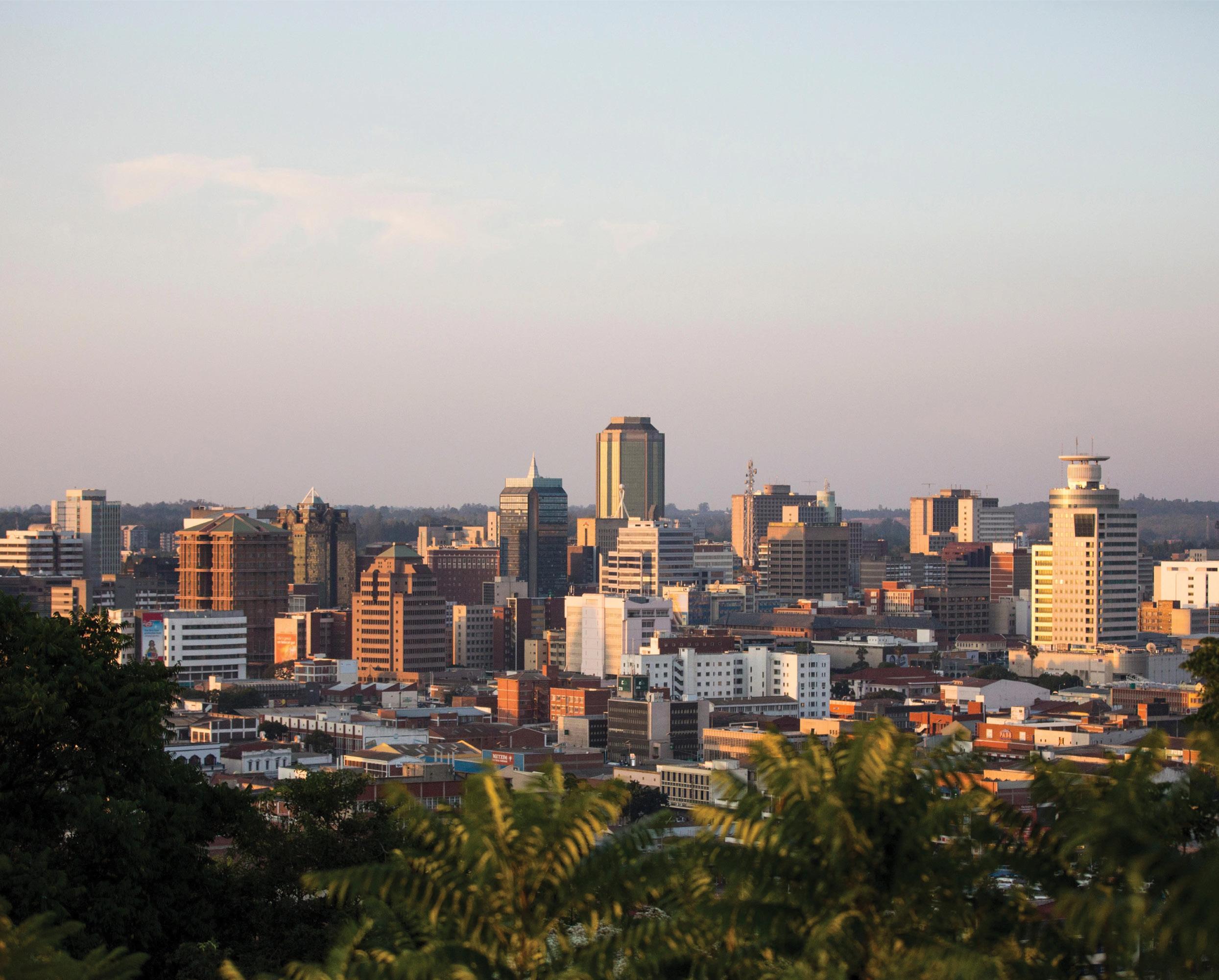

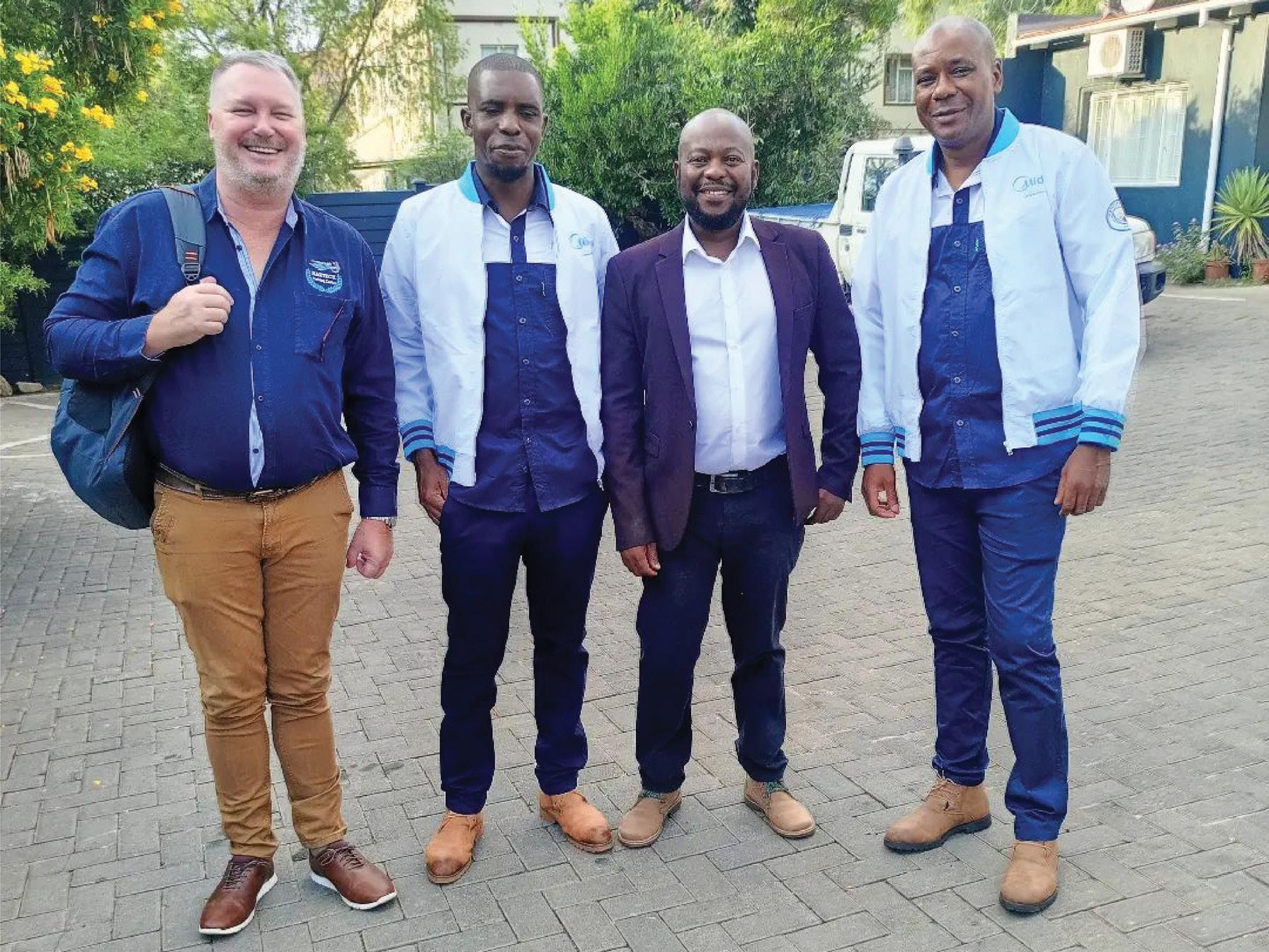
The Heating Energy Ventilation Air Conditioning and Refrigeration Association of Zimbabwe (HEVACRAZ) stands as a pivotal organization within Zimbabwe's built environment sector, actively promoting professional excellence and the adoption of cutting-edge technologies. Recognizing the rapid advancements in the HVAC-R field, HEVACRAZ prioritizes continuous professional development, aiming to make it mandatory for practitioners to stay abreast of the latest technological developments, discoveries, and innovations to maintain professional relevance and competence.
This proactive stance aligns seamlessly with Zimbabwe's national economic blueprint, which emphasizes structural transformation and productivity improvements through economic resuscitation and international re-engagement.
HEVACRAZ's commitment to high standards and capacity building directly contributes to these national aspirations, ensuring a skilled workforce capable of supporting infrastructure development across both the public and private sectors.

The association proudly holds the highest grading, with no upper limit on the value of works its members can undertake.
Registered and affiliated with the National Ozone Unit (NOU) under the Ministry of Environment, Climate and Wildlife, HEVACRAZ demonstrates a strong commitment to environmental sustainability.
The association actively engages in information dissemination and policy advocacy, providing stakeholders with crucial updates through newsletters and activities.
HEVACRAZ provides a comprehensive range of technical services through its members, encompassing design and installation, programmed maintenance and service, air conditioning and refrigeration, heating, ventilation and extraction, cooling towers, process cooling and heating, ducting systems, chillers and boilers, ventilation and condensation control, product storage and chilling, cold and freezer rooms, and the supply of HVAC-R units and spare parts.
curricula development, universal certification, and research and development through public-private partnerships.
The association also prioritizes the well-being of its technicians through social security schemes. HEVACRAZ is a key partner with the Southern African Development Community Refrigeration and Air Conditioning Association (SADC RAC), further extending its reach and impact in the region.
It also offers a platform for stakeholders to influence industry standards and legislation at provincial and national levels through robust advocacy and networking initiatives.
In pursuit of its vision to be a world-class HVAC-R association providing sustainable solutions, HEVACRAZ's mission focuses on training delivery, customer awareness, establishing centres of excellence,
The organisation emphasizes training, good practices, research, policy harmonization, and the engagement of freelance technicians, and is dedicated to elevating the standards and sustainability of the HVAC-R sector in Zimbabwe.

Asignificant European delegation, comprising representatives from over 200 companies, is set to converge in Harare for the inaugural EU-Zimbabwe Business Forum from May 20-22, 2025, with a strong focus on investment opportunities within the energy and mining value chains, among other economic areas.


The landmark event underscores the European Union's growing interest in Zimbabwe's potential, particularly in sectors crucial for sustainable economic development.
While the EU is already a key trading partner for Zimbabwe, notably as the top buyer of its horticultural products, this forum signals a strategic push towards deeper investment, especially within the burgeoning energy sector.
European companies with expertise in renewable energy technologies, grid infrastructure development, and energy efficiency are expected to explore potential partnerships and projects. The focus on the energy value chain suggests interest in everything from power generation and transmission to the manufacturing of energy-related components.
The mining sector, another key area of focus for the European delegation, also holds significant energy implications. Investments in mineral extraction and processing often require substantial energy inputs, creating opportunities for collaborations in providing efficient and potentially renewable energy solutions to mining operations.
for green technologies, could attract European investment aimed at developing sustainable and valueadded mining practices.
The EU's ambition to boost trade and investment with Zimbabwe to US$1 billion, as stated by the EU ambassador, aligns with this targeted focus on the energy and mining sectors. The existing trade volume of US$881 million in 2023, a 30% increase from 2021, indicates a positive trajectory for economic cooperation.
The forum presents a crucial platform for European businesses to explore concrete investment opportunities that can contribute to Zimbabwe's energy security, drive industrial growth, and foster sustainable development within its vital energy and mining value chains.

Businesses seeking to enhance their sustainability practices and navigate the evolving regulatory landscape recently had the opportunity to participate in comprehensive Environmental, Social, and Governance (ESG) training held recently.
The intensive program equipped attendees with the crucial knowledge and skills needed to develop sustainable roadmaps, understand leadership's role in ESG success, and effectively navigate the complex world of lasting business growth.
Participants gained valuable insights into a range of key ESG topics. The training covered the fundamental introduction to the ESG concept and its competitive advantages, highlighting how responsible practices can drive business success.
Dedicated sessions explored the critical interplay between sustainability and the environment, as well as the crucial aspects of sustainability and effective governance. Furthermore, the program delved into the significance of sustainability and social equity, emphasizing the importance of inclusive and ethical business operations.
Keeping pace with global trends was a key focus, with analysis of emerging trends, global regulations, and technological advancements significantly impacting ESG practices. Attendees also gained practical knowledge in critical areas
such as Greenhouse Gas (GHG) management reporting and the development of robust ESG frameworks. The comprehensive curriculum ensured participants left with a holistic understanding of ESG principles and their practical application within their organizations.
The training was facilitated by experts in the field, including Mr. Tatenda Chimusoro, Head of Cluster Infrastructure and Utilities at Mutapa Investment Fund, and Dr. Prosper Mutswiri, a Marketing and Corporate Business Manager at PowerTel. Their expertise provided attendees with valuable real-world perspectives and practical guidance
on implementing effective ESG strategies.
This recent ESG training underscores the growing recognition of the importance of integrating environmental, social, and governance factors into core business strategies.
By equipping professionals with the necessary knowledge, organizations can proactively address regulatory requirements, enhance their resilience, and contribute to a more sustainable and responsible future. Staying ahead of the curve through such training is increasingly vital for long-term success in today's evolving business environment.

Zimbabwe has launched the Zimbabwe Carbon Market Authority (ZiCMA) to regulate and facilitate carbon trading activities, marking a significant step in the nation's commitment to the Paris Agreement. As the designated national authority under Article 6, ZiCMA will oversee the approval, authorisation, and registration of carbon projects and participating entities.
The authority will maintain a comprehensive registry of all carbon initiatives, ensuring adherence to mandatory application procedures and authorising carbon credits and projects. ZiCMA is also tasked with monitoring and enforcing regulations related to carbon projects, cooperative approaches, and the eligibility of project proponents, aligning with Paris Agreement guidelines. Transparency and accountability are emphasized, with ZiCMA required to keep the climate change minister informed on all market developments. Corresponding adjustments will be applied to prevent double-counting of emissions reductions.
This framework, unveiled at COP29 in Balu, Azerbaijan, aims to position Zimbabwe as a leader in carbon market development. Developed with international experts and local stakeholders, it provides a regulated platform for Article 6 compliant carbon credit trading. Innovations include a blockchain-based national carbon registry for secure digital transactions, strict environmental and social safeguards, strengthened legal protections, and an improved regulatory framework offering a clear pathway to Article 6 eligibility.
The framework provides clear guidelines for verifying, registering, and trading carbon credits, streamlining the process for both project developers and credit purchasers. Project developers are required to increase investment in community development, and the government will allocate the majority of carbon market proceeds to the National Climate Fund for mitigation and adaptation initiatives.
This development allows existing projects to transition to Article 6 eligibility, enabling local developers to access new markets and potentially higher profits. Environmentalists and economists have welcomed the initiative, recognizing its potential to balance environmental protection with economic growth.
The carbon market is expected to commence operations in 2024, with pilot projects already in progress, potentially unlocking significant green investments and reinforcing Zimbabwe's role in combating climate change.

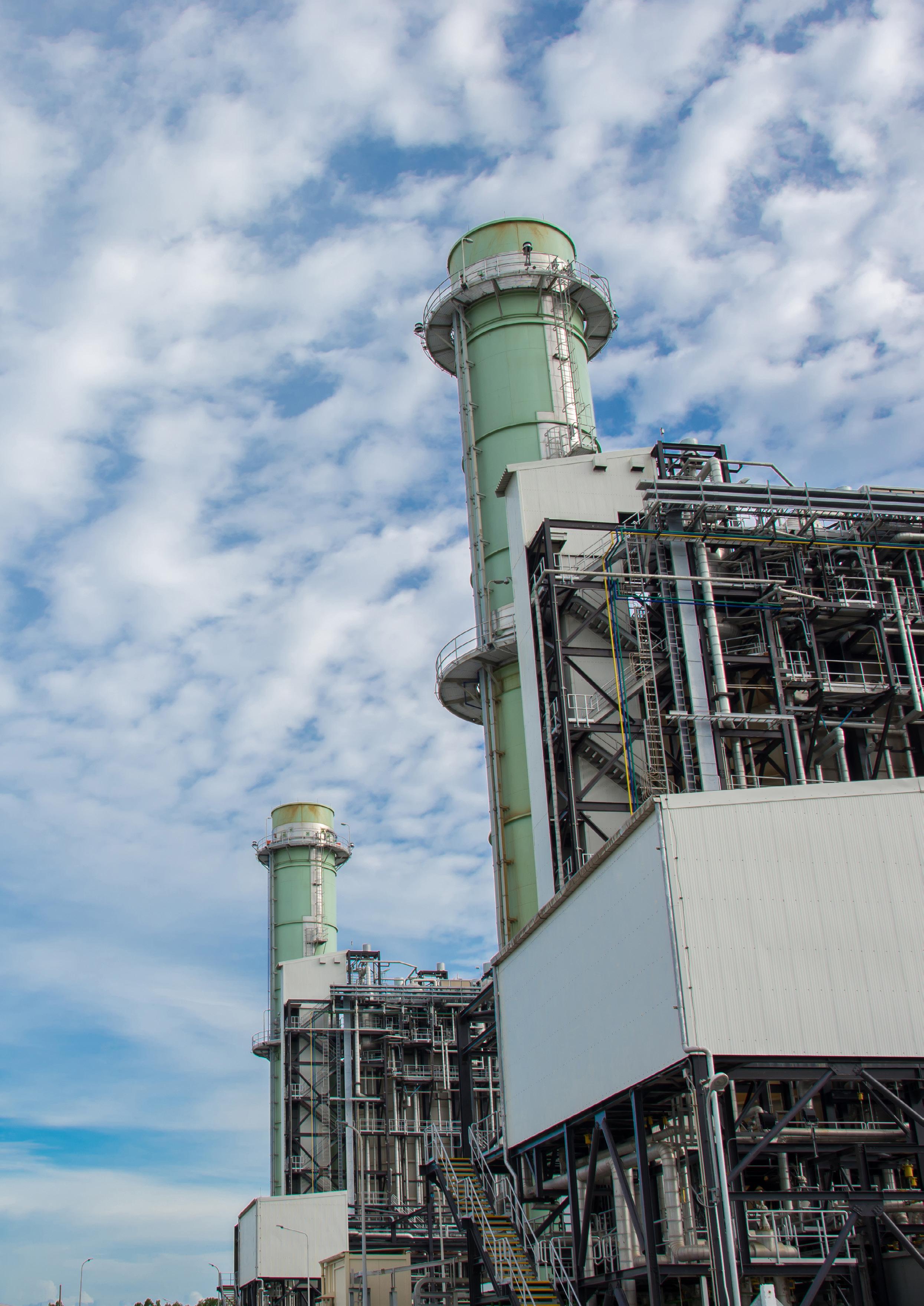
Mkwasine, located in southern Zimbabwe, is set to become a key player in the nation's agricultural sector with Verify Engineering spearheading the establishment of a US$1.1 billion nitrogenous fertilizer plant.
Verify Engineering is a state-owned company that was established with the mandate to drive industrial development through the implementation of strategic engineering projects. WThe company focuses on beneficiation and value addition in key sectors of the Zimbabwean economy.
This ambitious project aligns with the nation's broader goals of achieving food security and reducing reliance on fertilizer imports.
The new nitrogenous fertilizer plant is expected to significantly boost Zimbabwe's agricultural productivity. The project will increase the local supply of this essential input, and will empower farmers, reduce input costs, and ultimately contribute to increased crop yields. This development is crucial for a nation where agriculture forms the backbone of the economy.
The project is also expected to create numerous jobs during both the construction and operational phases. This will offer economic opportunities for the local community and contribute to the overall development of the region. The Mkwasine project represents a substantial investment in Zimbabwe's industrial capacity and demonstrates Verify Engineering's commitment to driving economic growth through strategic development projects. The successful completion of this plant will not only transform the agricultural landscape but also strengthen the nation's journey towards self-sufficiency and sustainable development.

The Zimbabwe Electricity Transmission & Distribution Company (ZETDC) is strongly advising the public to prioritize safety by ensuring all electrical installations are carried out by qualified and registered electricians, according to the power authority’s flyer circulating online.
This advisory comes as ZETDC highlights the significant dangers associated with improper electrical work, which can lead to devastating fire hazards, potentially lethal electric shocks, costly damage to household appliances, and unexpected increases in energy consumption.
While the allure of potentially lower upfront costs for unqualified work might be tempting, ZETDC cautions that such shortcuts invariably result in more substantial expenses down the line due to necessary repairs and reworks to rectify faulty installations.
Protecting homes and families from these preventable risks is paramount,
and the simplest yet most effective measure is to engage only the services of certified professionals. In line with this commitment to safety, Statutory Instrument 177 of 2018 legally mandates that ZETDC will not approve or connect any electrical work undertaken by individuals who are not registered and qualified to perform such tasks. This regulation underscores the seriousness with which ZETDC views electrical safety and the importance of adhering to established standards.
Therefore, before contracting an electrician for any electrical work, it is crucial to verify their credentials. Homeowners and businesses should demand to see a valid ZETDC
certificate of registration, which serves as official confirmation that the electrician has met the stringent industry standards required to operate legally and safely.
Furthermore, it is advisable to request documentation that substan-
tiates the electrician's qualifications and to seek demonstrable evidence of their past experience through references from previous clients. Individuals diligently following these essential steps can avoid compromising their safety and ensure that their electrical installations are reliable and compliant with regulations.
ZETDC urges everyone to remember the critical message: Stay Safe, Stay Alert, Stay Alive, by always choosing qualified professionals for all electrical needs.
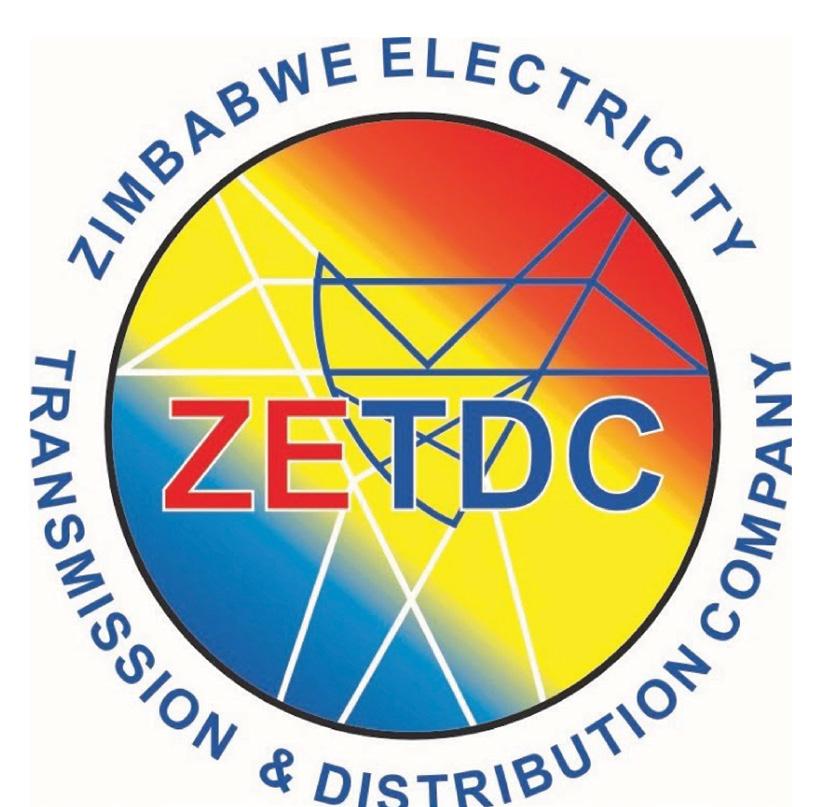
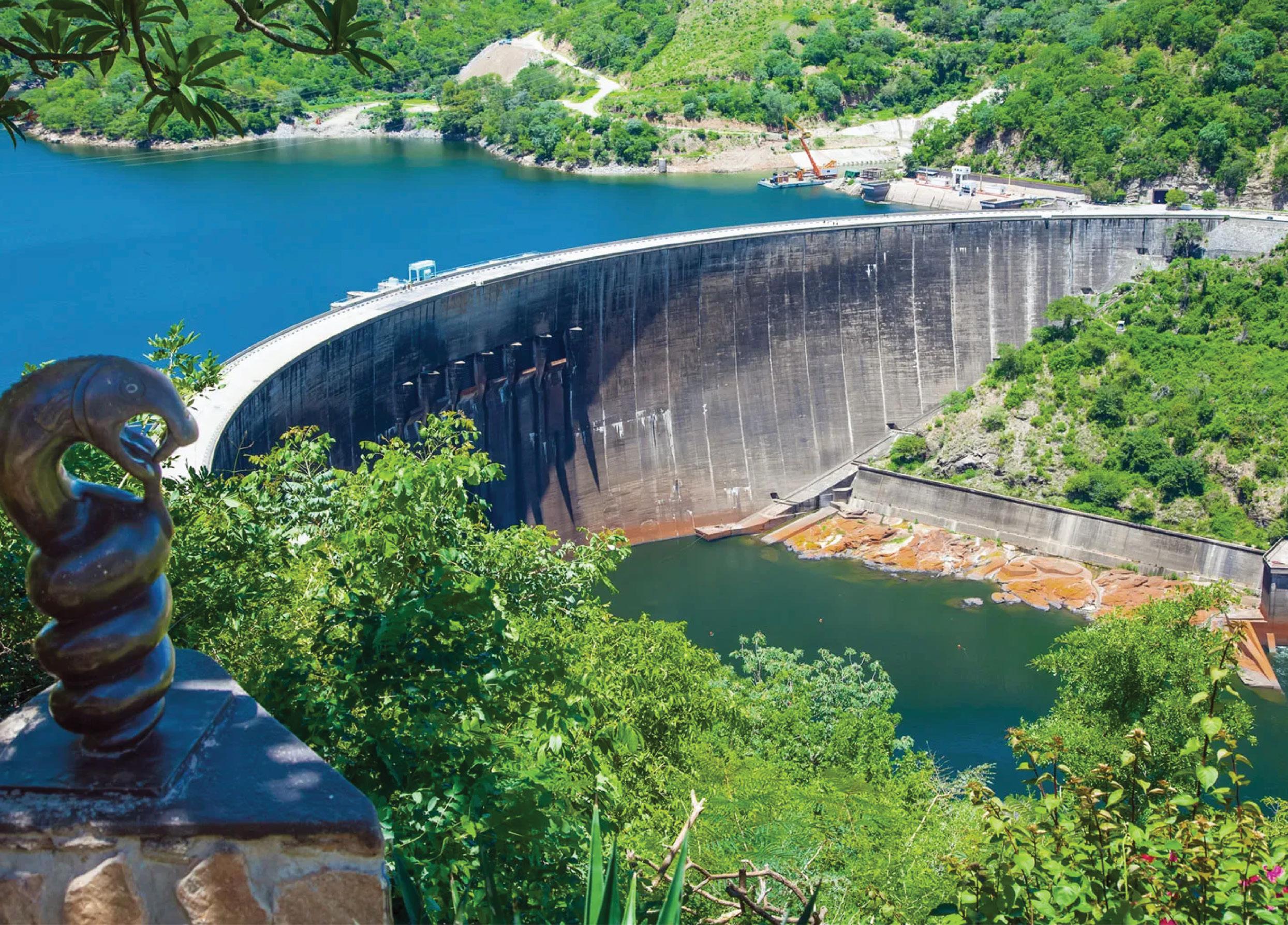
Kariba recently hosted the International Conference on Mechanical, Materials and Renewable Energy (ICMMRE) from April 24th to 25th. This significant two-day event, organized by the World Research Society, convened a diverse group of professionals, researchers, academics, industry leaders, and government representatives from across the globe.
ICMMRE aims to provide a dynamic platform for participants to engage in meaningful dialogue, share cutting-edge research findings, and gain valuable insights into the latest technological advancements, innovative techniques, and practical solutions within these critical sectors. The conference program
was designed to foster collaboration and the dissemination of knowledge regarding the development and application of mechanical engineering principles, novel materials, and sustainable renewable energy technologies in various countries.
Attendees had the opportunity to explore the state-of-the-art in areas such as advanced materials development, sustainable manufacturing processes, energy storage solutions, solar power technologies, wind energy systems, and other renewable energy sources. The conference facilitated the exchange of best practices, the identification of emerging trends, and the exploration of potential collaborations to address pressing
global challenges related to energy, sustainability, and technological advancement.
ICMMRE brings together a wide spectrum of stakeholders to bridge the gap between research and practical application, fostering an environment conducive to innovation and the translation of scientific breakthroughs into tangible solutions. The participation of individuals from academia, industrial sectors, and government organizations underscores the importance of a multi-disciplinary approach to driving progress in mechanical, materials, and renewable energy. The scenic backdrop of Kariba further enhanced
the collaborative atmosphere of this international gathering, promoting fruitful discussions and networking opportunities.
A pivotal National Consultation Indaba, convened in Harare by the Ministry of Energy and Power Development in collaboration with the World Bank, ZERA, and ZETDC, has laid the groundwork for Zimbabwe's ambitious National Energy Compact. This crucial gathering brought together a diverse spectrum of stakeholders from Zimbabwe's energy sector, forging a unified strategy to achieve universal access to modern, clean, and affordable energy by 2030, aligning with Vision 2030 and UN SDG7.
The Indaba served as a vital platform for mobilizing the significant investment required to unlock Zimbabwe's vast renewable energy potential and ensure an inclusive energy transition. Key deliberations involved representatives from the Government of Zimbabwe, private sector leaders, and committed development partners. The insights shared by the Minister of Energy and Power Development, Honourable July Moyo, and the World Bank Zimbabwe Country Manager, Ms. Eneida Fernandes, were instrumental in shaping the discussions and the direction of the National Energy Compact.
This national framework follows Cabinet approval and is an integral part of the broader Dar es Salaam Declaration, demonstrating regional energy collaboration. The Energy Compact aligns with the continent-wide Mission 300, with Zimbabwe committing to electrifying 3.1 million households and achieving

70 percent access to clean cooking solutions by 2030.
A key outcome of the Indaba was the reaffirmation of the private sector's central role in Zimbabwe's energy future. The proposed National Energy Compact formalizes Zimbabwe’s pledge for universal clean energy access by 2030, an undertaking requiring robust private sector participation, investment, and innovation. By fostering the right partnerships and a conducive investment climate, Zimbabwe is establishing a resilient and sustainable energy sector poised to power economic growth, environmental sustainability, and social inclusivity for all Zimbabweans. The National Consultation Indaba marks a critical step in realizing this vision through collaborative dialogue
and strategic alignment, setting a clear path towards a brighter energy future for the nation.
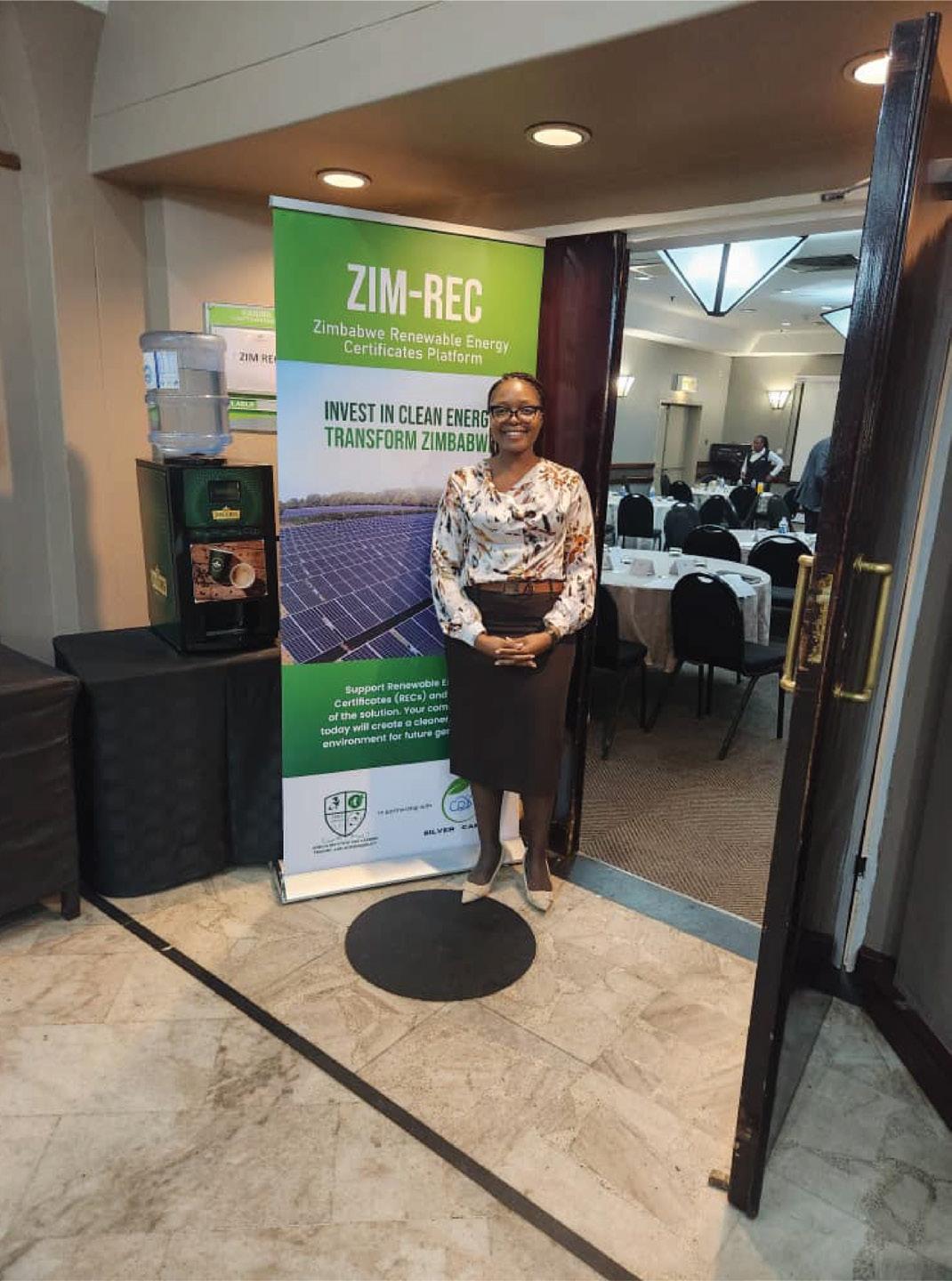
The Africa Institute for Carbon Trading and Sustainability (AICTS), in collaboration with Silver Carbon, has recently launched the Zimbabwe Renewable Energy Certificate (ZimREC) in Harare. This initiative marks a significant step towards fostering transparency and growth within Zimbabwe's renewable energy market.
The Africa Institute for Carbon Trading and Sustainability is a regional organization dedicated to promoting sustainable development across the continent through innovative market-based mechanisms. With a focus on climate change mitigation and adaptation, AICTS works to build capacity, develop policy frameworks, and facilitate investments in green technologies and initiatives. The institute plays a crucial role in advancing carbon trading and sustainability practices in various sectors across Africa.
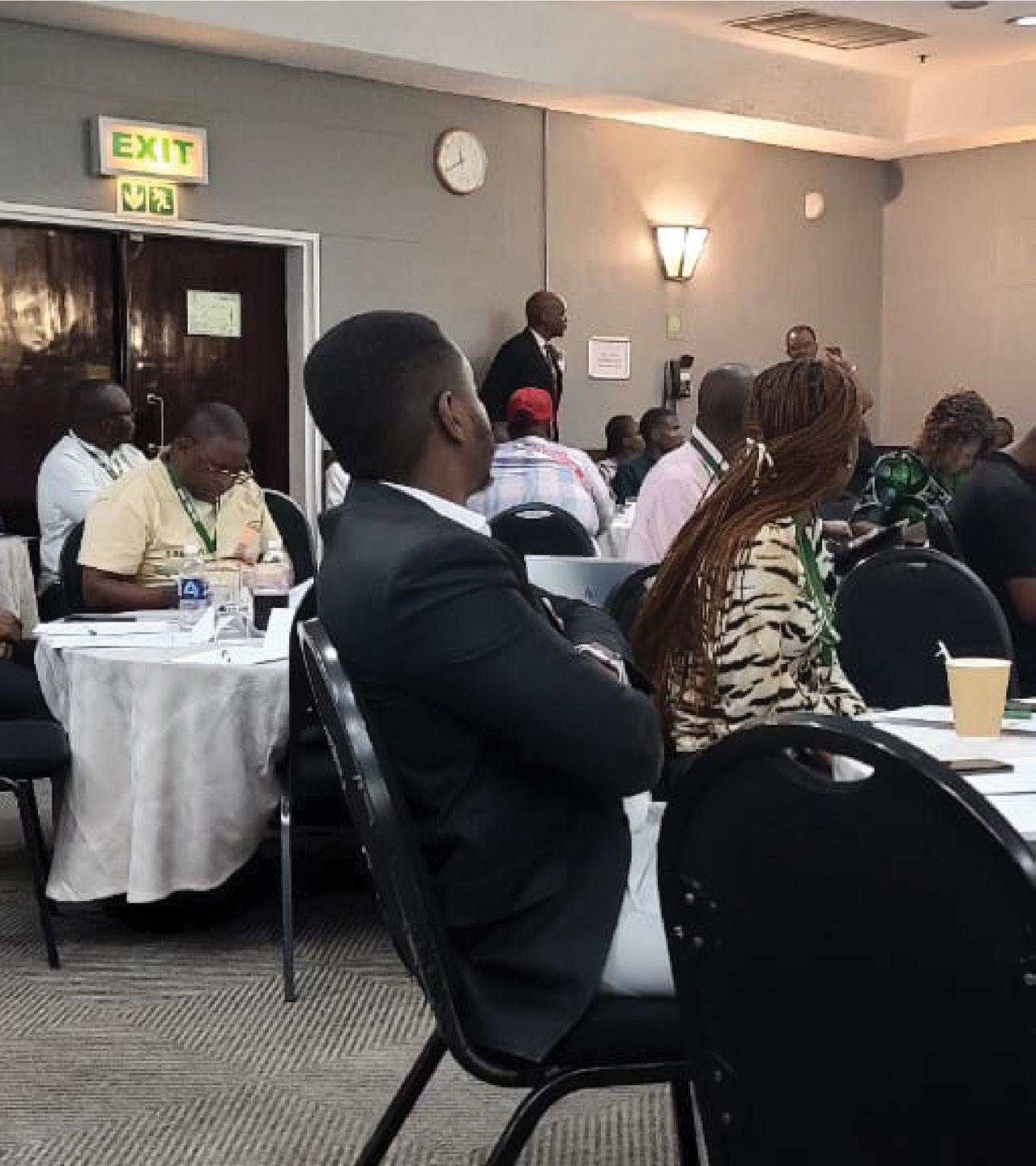
Silver Carbon, a key partner in the ZimREC launch, brings expertise in carbon markets and renewable energy certification systems. Their collaboration with AICTS underscores the importance of leveraging international best practices to develop a robust and credible certification scheme for Zimbabwe.
The newly launched Zimbabwe Renewable Energy Certificate (ZimREC) is designed to provide a transparent and reliable tracking system for renewable energy generation and consumption. Each certificate represents a specific amount of electricity generated from a renewable source, such as solar, hydro, or wind. By creating a tradable instrument, ZimREC aims to incentivize the development of renewable energy projects and enable businesses and individuals to verifiably support green power.
This initiative is expected to have several positive impacts on
Zimbabwe's energy sector. Firstly, it will enhance transparency by providing clear documentation of renewable energy attributes. Secondly, it can stimulate investment in renewable energy projects by creating an additional revenue stream for generators through the sale of certificates. Thirdly, it allows energy consumers to credibly claim the use of renewable energy, supporting corporate sustainability goals and attracting environmentally conscious businesses.
The launch of ZimREC signifies Zimbabwe's commitment to transitioning towards a cleaner energy future and participating in the growing global market for renewable energy. By establishing a transparent and credible certification system, the country is positioning itself as an attractive destination for renewable energy investment and demonstrating its dedication to sustainable development.
The collaboration between the Africa
Institute for Carbon Trading and Sustainability and Silver Carbon highlights the importance of partnerships in driving impactful climate action and fostering a greener economy.
The Zimbabwe Energy Regulatory Authority (ZERA) made a significant impact at ZITF 2025, placing energy at the heart of industrial transformation discussions.
Operating under the powerful theme, "Accelerating the Attainment of National Development Strategy (NDS) 1 Energy Goals for sustained Industrialisation," ZERA's presence underscored its pivotal role in driving Zimbabwe's economic growth through strategic energy regulation, innovative solutions, and a commitment to sustainable energy development.
ZERA's stand at the trade fair became a key point of engagement for businesses, investors, and stakeholders keen to understand how the energy sector is being shaped to fuel the nation's industrial ambitions. The authority actively showcased its multifaceted approach to accelerating the NDS1 energy goals, demonstrating how its regulatory framework is fostering an environment conducive to growth and investment within the energy sector.
A central focus of ZERA's exhibition was the emphasis on innovation within the energy landscape. The authority highlighted how smart

regulation is being implemented to encourage the adoption of new technologies and practices that enhance efficiency and reliability across the energy value chain.
Furthermore, ZERA championed sustainable energy solutions, recognizing their crucial role in ensuring long-term energy security and environmental responsibility as Zimbabwe pursues its industrialization targets.
Visitors to the ZERA stand gained valuable insights into the dynamic interplay between energy regulation and industrial progress. The authority's representatives were on hand to explain the strategic direction being taken to create a robust and sustainable energy sector that can effectively power Zimbabwe's future economic endeavours.
ZERA clearly articulated its vision and demonstrating its commitment to facilitating the NDS1 energy goals, thereby solidifying its position as a key enabler of Zimbabwe's industrial transformation. The enthusiastic engagement at their stand reflected the growing recognition of energy as a fundamental driver of national development.

The Zimbabwe Energy Regulatory Authority (ZERA) recently facilitated an insightful tour for the Parliamentary Portfolio Committee on Energy and Power Development, showcasing key energy projects designed to bolster the nation’s energy security.
The initiative commenced with a visit to the Nyangani Renewable Energy (NRE) Mini Hydro Pungwe B project in Nyanga, a successful Independent Power Producer (IPP) venture boasting a 15MW capacity. This project stands as a pivotal success story in Zimbabwe's pursuit of sustainable energy solutions, currently feeding a significant 35MW of clean energy into the national grid.
The active participation of parliamentarians in this tour underscores the critical role of legislative support in advancing renewable energy initiatives across the country.
Members of the Portfolio Committee witnessed firsthand the operational efficiency and impact of projects like the NRE Mini Hydro Pungwe B, gaining a deeper understanding of the potential of renewable energy sources to contribute to Zimbabwe's energy mix. This direct engagement fosters stronger collaboration between government bodies and the private sector entities that are actively involved in energy generation.
A key objective of this ZERA-led initiative is to inform and influence the development of a robust policy framework that can further incentivize and facilitate increased investment in renewable energy projects by IPPs.
The success of the NRE project serves as a compelling case study, demonstrating the viability and positive impact of private sector involvement in the renewable energy sector. ZERA hopes that by highlighting such achievements,
they will create an enabling environment that attracts more IPPs and accelerates the adoption of clean energy technologies.
Ultimately, this collaborative effort between ZERA and the Parliamentary Portfolio Committee on Energy and Power Development signifies a unified approach towards achieving energy security and promoting sustainable development in Zimbabwe. Through the initiative parliamentarians will gain firsthand exposure to successful renewable energy projects, as well as garner the necessary legislative backing to unlock further investment and drive the nation towards a cleaner and more reliable energy future.
The insights gained from this tour are expected to play a crucial role in shaping future energy policies and fostering a conducive environment for the growth of the renewable energy sector in Zimbabwe.
